You're currently viewing a custom sorting.

Originally Aired: 1993-10-31
Synopsis:
After falling in love with a woman whose species is unable to walk in "normal" gravity, Bashir develops a technology that could free her of her wheelchair forever. [DVD]
Filler Quotient:
3, bad filler, totally skippable.
- There's no essential plot or exposition in this episode that renders it unskippable and while the story has a few charming moments, it's mostly terrible. And we never see Melora again.
Problems
- The gravity Melora is used to is extremely, extremely low. So low that there's barely any at all; she floats around like a feather. Why would her species evolve as bipedal life forms when they can just fly around most of the time?
Factoids
- Bashir's father was a Federation diplomat.
- Bashir is supposedly no good at Tennis.
Remarkable Scenes
- Fallit Kot just after walking into Quark's bar: "I've come to kill you, Quark."
- The Klingon restaurant scene. I love when the Klingon chef throws the plate behind him. Hilarious!
- Melora: "What kind of architect would design a raised limb at the entrance of every door?!" I wondered this myself in the pilot episode. :)
- Melora and Dax discussing alien relationships.
- Melora kicking some low gravity ass!
- The Klingon chef singing.
- Rules of Acquisition: 16. A deal is a deal.
- Morn Appearances; 1. Seen sitting behind Bashir and Dax in the opening scene while they're talking to O'Brien about the wheelchair. 2. In Quark's bar just before Quark attempts to be really really nice to Fallit Kot so he won't kill him.
My Review
This episode is an attempt to prove handicapped people can contribute to society, in a Federation enlightenment sort of way, but instead just comes off as a bit obnoxious. Geordi LaForge was a much better example of how handicapped people can contribute to society, but admittedly in some ways, Geordi is a poor example because they eliminated his problem with technology. Melora is a better example of how handicapped people can contribute to society because her problem is natural to her species. Unfortunately, Melora was the obnoxious thing about this episode. Her behavior was just annoying, whereas Geordi was a very likable guy. The idea of a medical cure for her situation is obnoxious too. The science behind it is a little fuzzy, but far less so than Melora's species' curious bipedal evolution in a low gravity environment. What I didn't like most about it was the episode should have been more about Melora living on the station with a handicap and less about curing it. And even that would have been a little lame. Fortunately, the ending redeems quite a bit of the episode's mistakes. Melora is not going to fix her handicap, as that would be insulting the rest of her species.

Star Trek DS9 - 2x10 - Sanctuary
Originally Aired: 1993-11-28
Synopsis:
Kira is torn when a displaced alien race arrives on Deep Space Nine and claims Bajor as its people's legendary homeland. [DVD]
Filler Quotient:
3, bad filler, totally skippable.
- This is the second episode to mention the Dominion. Haneek claims that the race which conquered hers was conquered by the Dominion. This, however, is minor trivia. And the episode is so annoying that it's worth skipping over this material and missing the trivia in the process.
Problems
None
Factoids
- This episode establishes that the station can hold 7000 people, according to Odo.
Remarkable Scenes
- The universal translator failing in the beginning.
- Haneek and Kira discussing the horrible dress.
- The Bajoran minister and Vedek carefully explaining their reasons for denying the Skreeans' request to immigrate to Bajor.
- Jake trying to be nice to the Skreeans.
- The Bajorans accidentally killing the Skreean attempting to land on Bajor.
- Haneek's final words with Kira.
- Morn appearances; 1. Watching the Bajoran play music in Quark's bar. He cries to Varani's playing. 2. Window shopping on the promenade. 3. At the bar when Varani plays for the Skreeans.
My Review
I like the beginning of this episode when the universal translator failed. It's nice to see the technology isn't infallible! Their race's language is too different for it! The issue of a group of people wanting to immigrate to Bajor is interesting, but could have been handled better. The Skreeans demanding to immigrate to Bajor despite a major famine on the planet and despite the fact that Draylon II was more than adequate for the Skreean's needs was incredibly obnoxious. I lost all of my sympathy for the Skreeans very quickly when they started getting belligerent and angry that they couldn't live on Bajor. The climax of absurdity is Kira's final scene with Haneek. The way Haneek walks off the station feeling all smug and superior is total madness. The way it's presented, I think the authors of the episode meant to have us feel some moral ambiguity but there is absolutely none. The Skreeans' request was totally unreasonable. The whole episode reminds me of an irrational kindergarten fight over a toy. Skreeans: "We want your planet." Bajorans: "Sorry, we can't give you that." Skreeans: "No, we want your planet." Bajorans: "How about this other planet? It looks like a better match for you guys anyway and you can have the whole thing to yourselves!" Skreeans: "No, we want your planet." Bajorans: "Err... okay yeah we're not doing that." Skreans, indignantly: "Well screw you then!" Astounding.
The following are comments submitted by my readers.
- From Pete Miller on 2006-06-01 at 6:24am:
So how exactly does the universal translator work? I realize that it's just an easy way for them to all speak english on the show, but is there any science at all behind it? Does it just immediately interpret the person's language, and then rebroadcast it in english to Sisko or whoever, and also make their lips appear to be moving with the english words??? This is a rare instance of me siding with Star Wars over Star Trek. In Star Wars they simply have the language 'galactic basic'. If you're civilized, you speak it. Much easier to explain.
This makes me wonder: So every time the romulans speak to someone in the federation, are they really speaking romulan? And when does the universal translator know when to allow it to stay in their own language, like when the Klingons have certain ceremonies in their native tongue. How does it know not to just translate it for everyone else? This, to me, is a ridiculous device that we have to put up with because of the original Star Trek's limited budget. George Lucas learned from Gene Roddenberry's errors on this one. But Star Trek is still waaaaay better than Star Wars :) - From JRPoole on 2008-12-10 at 3:23pm:
Ditto the comment above. I've always sort of assumed that the UT rebroadcasts speech in real-time, presumably through the comm badges, a step we thankfully don't have to sit through every time. It's sort of clunky when Haneek begins actually speaking English (whoops, of course I mean Standard) words.
A decent, if flawed, episode altogether, though. - From Bernard on 2010-10-17 at 10:53am:
I enjoyed an explanation for the universal translator, further explanation will come in episode 'Little Green Men' of course.
This episodes falls down at the point when the Skreeans lose the viewers sympathy as Eric already pointed out. Otherwise I'm sure it could have scored more highly as, like the last episode, it was fairly original. - From Tallifer on 2011-03-19 at 5:45am:
The most unrealistic part of this story is that they can find an empty, freely available and hospitable planet nearby. With all the countless races and cultures in this quadrant, with all the sexual fecundity of those races, with all the military, commercial or imperial ambitions of these races: how could a perfectly good planet remain unclaimed and unsettled?
(Which brings us to another perennial problem with Star Trek: the overabundance of habitable worlds.) - From Jeff Browning on 2011-10-19 at 6:30pm:
This comment affects many episodes where Bajor and its situation are discussed, including this one.
In this episode and many others we are told that Bajor is devastated, its citizens are starving, and so forth. I have been privileged to travel the world and have seen many areas where poverty, starvation, and disease prevail.
Whenever we see an image of Bajor, we see none of this: We see prosperous, well fed, well dressed, clean, healthy Bajorans in idyllic, beautiful surroundings. The Bajorans who show up on DS9 are similarly prosperous looking. I am left to wonder: Where is all the devastation folks keep talking about? Where are the naked, starving, filthy, diseased children I have seen in places like India, China, Africa, and Latin America?
It's kind of like the DS9 writers and editors did not have the stomach for it. They did not believe that their viewers could withstand a realistic depiction of a devastated society. Certainly, there is no indication within the frames of DS9 that this is the state of Bajor, at least from what we are allowed to see. - From Selador on 2013-01-20 at 9:51pm:
The scene directly after the one where the terrible famine on Bajor is mentioned we see Skreeans queuing up to use a replicator. Ridiculous.
This episode also is a good example of why the universal translator is such a flawed idea. - From Axel on 2015-06-24 at 3:22am:
Some interesting comments on this episode.
In response to Tallifer, I don't think it's unrealistic for a planet like Draylon II to be available. The Kepler spacecraft recently searched a tiny total portion of the sky for planets. If there were 8 Earth-like candidates found out of 1,000 identified planets and 150,000 stars, that extrapolates out to billions of potentially habitable planets orbiting their stars in this galaxy even by a pessimistic estimate. This is also why I've never been *that* annoyed by Star Trek's "alien of the week" stuff, although it's always nice when they actually develop an alien race over the series.
As for the Bajorans not being shown living in squalor all the time, I guess I disagree here too. There are quite a few people in places like India and Latin America living in material comfort despite poverty and famine there. Or take post-WW2 Germany. Its cities bombed and in ruins, people broke and often starving, and itself under military occupation. It certainly rebounded quickly, at least in West Germany. Bajor has probably had significant help from the Federation and maybe others in rebuilding, too.
All that said, the Skrreans were crappy guests/refugees. Haneek probably felt under the gun to find the Kentanna planet for her people, which is understandable. But I like how in the meeting with the Bajorans, Sisko keeps on throwing out Draylon II. The Skrreans *never* come up with a good reason to reject it, and their insistence on Bajor makes no sense at all.
A decent episode with some nice moments, but that's about it. - From Harrison on 2015-07-18 at 12:58am:
I'm genuinely surprised the reviews for this episode are so poor. Of course it is easy to dislike the Skreeans -- they were not intended to be completely lovable characters, with their flaky skin, their ingratitude, and their inconvenient needs & beliefs -- doesn't reflect badly at all on the writing or acting, both of which I think are excellent.
In truth I found the episode refreshing, and pleased that the writers found the courage to depart from the politically correct. - From Andy Mu;oz on 2018-08-29 at 12:36am:
As Peter said, this is an unusual episode. Me as a non trekkie, this is a weird episode. Showing how a relationship between collegues, not even friends, could meant a lot, a huge lot, becouse you are tied with an idealogy (of justice) instead good or bad, its huge in itself for television.
And this early in the series. My friend, a trekkie begs me to wait to season 3, but Im already an adept. And this is like that like in a lot of episode from this season. As people told me, Im awaiting for the best to come

Star Trek TNG - 7x22 - Bloodlines
Originally Aired: 1994-5-2
Synopsis:
Picard learns he has a son. [DVD]
Problems
- The Enterprise travels at maximum warp in this episode. I guess we're all very quick to forget about the events TNG: Force of Nature, eh? Not that I care too much, I rather like the fact that that dreadful episode is being ignored.
Factoids
- A very similar technology to this subspace transporter used by Bok will be used in Ent: Daedalus. It seems just as unstable in this century as it was in Archer's!
Remarkable Scenes
- Riker: "The Ferengi government is debating an amendment to the Rules of Acquisition. It could be a while until we hear from them."
- Picard: "You'll never look at your hairline again in the same way!"
My Review
This episode would have been much more effective this supposed "son" of Picard's actually ended up being for real. Instead, we get a TOS style reset button, for our characters are not allowed to incur lasting consequences! *rolls eyes* This episode bears decent continuity with TNG: The Battle, for Bok has returned. It's convincing that Bok would pull such a ridiculous scheme, but watching it all play out is frankly a little boring. Since Picard does indeed have no son, all the character development between Picard and his new son is thus wasted, and the episode itslelf comes off largely as a waste of time. Normally I wouldn't count off much for that, but in the late final season of a show, there shouldn't be filler episodes!
The following are comments submitted by my readers.
- From JRPoole on 2008-10-30 at 7:03pm:
Ughh. Ferengi are almost always terribly executed on TNG. Ughh. Picard's son turns out not to be. Ughh. How the hell did Bok a) find out about a two-week affair of Picard's from a quarter century ago, b) find the kid, c) manipulate his genes without his knowing about it, and d) know the Enterprise would be near Caymore in the first place. On top of all this, we have an interesting idea for a planet--a colony in collapse following the Cardassian war--and we never even set foot on it.
Science alert: if you change someone's genes, the cells will be different when they reproduce. In a few cell cycles, you'd have a completely different person.
This is terrible. Utterly, utterly, unwatchably terrible. The son is a complete douche, and not in an interesting way. His acting is terrible, he's badly written, and his reaction to being transported unexpectedly is completely unbelievable. The first episode with Bok wasn't that great in the first place, so it's not the best episode to return to here. I can't believe this is one of the pentultimate TNG episodes. I vaguely remembered it from the first run, and I figured it was lost in the middle of the series somewhere, not featured prominently at the end. - From John Smith on 2011-10-23 at 4:28pm:
Not a very good episode by any means but it does contain one of my favorite scenes in all of TNG: someone finally telling the ever presumptuous Troi to buzz off. She has never met this person before but she, unsolicited, takes it upon herself to see if he wants to open up her about his whole life. His response was quite appropriate and refreshing in that the always sanctimonious Troi was put in her place. - From Shani on 2014-12-16 at 9:47am:
From memory alpha: "Sagan noted that the original premise ("Fugue") was a lot darker than the aired episode. "The idea was that Bok had genetically engineered this kid from birth and advanced his growth and had been giving him memories of Picard abandoning him on the Stargazer. Then Bok was using one of the mind balls to give Picard these vague flashes of false memories, making him think that it was possible he had this sort of fugue-like experience where he basically abandoned his son on the Stargazer and blocked it out of his mind. I don't know if it would have ever worked or not, but it was kind of a really interesting, dark aspect and it gave you a sense of abandonment and trying to recapture this sense of a son he never had. Then it turns out that it's not that at all." (Captains' Logs: The Unauthorized Complete Trek Voyages)"
Why did they not make that episode? That would have actually been brilliant and interesting to watch. I can see them trying to argue that it would be too dark for TNG but it would have been brilliant - From tigertooth on 2017-02-11 at 3:04am:
The first question Picard would have asked was "Why is Bok warning me about the fact that he's going after my son? Why wouldn't he get my son first?" The warning was the obvious signal that this was Bok's trap. Completely ridiculous that Picard and crew fell for it.

Star Trek DS9 - 3x08 - Meridian
Originally Aired: 1994-11-14
Synopsis:
Dax falls in love with a man who will soon disappear with his planet into another dimension for 60 years. [DVD]
Filler Quotient:
3, bad filler, totally skippable.
- The exposition about Odo's love for Kira is done better in later episodes. It's not necessary to sit through this lame episode just to understand the larger arc.
Problems
None
Factoids
- According to Jadzia, the Trill spots go "all the way down."
- Sisko mentions that they managed to get the probe "deeper into the sun's corona." This implies they were using the recently developed metaphasic shielding technology from TNG: Suspicions to shield the probe.
Remarkable Scenes
- Kira sarcastically proclaiming her love for Odo to get rid of Tiron.
- Quark making a deal with Tiron to get a holographic image of Kira!
- Quark trying to take a holo image of Kira.
- Quark: "Isn't there some petty thief you can harass?" Odo: "Just you."
- Kira sabotaging Quark's holo program.
- Kira with Quark's head in the holo program. Hilarious!
- Jadzia unable to shift with her new friends.
- Morn Appearances; 1. Not technically an appearance, but Kira says she got a message that Morn wanted to see her in Quark's.
My Review
This episode is a little ill-conceived. It's nice that they're taking the Defiant into the Gamma quadrant instead of using it as their personal taxi, and it's nice that they're meeting new, non-Dominion people with it in the spirit of Star Trek, but this love story between Dax and Deral is just tiresome. I also found it hard to believe Dax would throw away her career just because she fell in love with alien guy of the week. Finally, it's obvious throughout the whole episode that something will happen to force Jadzia away from her new companion, so nothing comes as a surprise. Frankly, the silly B plot onboard the station is far more interesting to watch. Though the ending is a redeeming quality. Despite the predictability, they do a good job making you feel sorry for Jadzia at the end, which is kind of nice.
The following are comments submitted by my readers.
- From Matt on 2008-03-19 at 11:14pm:
This episode is a tribute to the musical "Brigadoon". Which might help to explain the way Dax acts. Much of the main plot points are similar. Also, like the original play, it kinda sucks. - From JRPoole on 2009-01-14 at 2:33am:
The A plot love story is one of the most embarrassingly bad moments in all of Trek, and that's saying something. The dialogue is lame,and Jadzia's decision is ridiculous and way out of character, as is Sisko's reaction, though Avery Brooks acts it well.
The B plot is uproariously funny, if a bit cheap. It's the only thing this episode has going for it, so I gave it a 1 just for that. - From djb on 2009-05-01 at 6:31am:
I agree, Dax's behavior in this episode is way out of character. After 7 lifetimes, anyone is going to be smart enough not to confuse infatuation with love. All Jadzia and her new boyfriend have is infatuation; they know practically nothing about each other, what to speak of them being different species. And she's ready to leave everything and everyone she knows behind on a whim? Silly.
I like it when different plots in a single episode somehow tie together or are related; unfortunately plot A and plot B had nothing to do with each other, even though plot b was indeed rather humorous. - From rpeh on 2010-07-29 at 9:38am:
This episode is so crammed with technobabble it's almost leaking at the seams. Intersecting dimensions, singularities in the quantum matrix.... give me strength! It didn't help that I kept thinking of Deral as the bible-thumping Vice-Presidential candidate from the West Wing.
The B-plot is funny, though, and the end scene just priceless!

Star Trek Voy - 1x10 - Prime Factors
Originally Aired: 1995-3-20
Synopsis:
An alien leader refuses to share valuable technology with Voyager. [DVD]
Problems
None
Factoids
None
Remarkable Scenes
- Harry discovering that he's traveled nearly 40,000 light years using this species' transporter.
- Tuvok walking in on Torres, Carey, and Seska, only to find out that Tuvok is on their side.
- Janeway's surprise and even disgust upon learning Tuvok had betrayed her trust.
- Tuvok: "My logic was not in error, but I was."
My Review
These "here's another way for Voyager to get home! Oops, sorry!" plots do get rather tiresome, especially in the first freakin' season, and this one is a pretty bad offender. Not only do our aliens of the week look exactly like humans, but with a little more effort, Voyager may have been able to get the literature underground to send Voyager 40,000 light years closer to home instead of going through the unresponsive official channels and leaving when asked. That said, it is credible that people make mistakes. Voyager could have maneuvered their way into a better deal with the literature underground, but that's just not how it went down. A disappointing episode.
The following are comments submitted by my readers.
- From djb on 2009-06-23 at 4:42am:
What the hell is wrong with Janeway? She acts absolutely devastated that (Oh my god!) some of her crew members would actually *gasp* violate the laws of a society to get a paltry 40 THOUSAND light years closer to home! As if she'd rather be marooned in the Detla Quadrant than break someone's rule.
Uh, what? When you're stuck 70 years' worth distance from home, the rules change a little. The Prime Directive isn't quite so prime. I understand non-interference, of course; but harmlessly breaking one of this planet's laws, not hurting anyone and not causing any long-term damage, is worth even getting a thousand light years closer, what to speak of forty thousand. She seems to be worse than Picard in this way!
Oh well. - From Jem Hadar on 2009-06-30 at 2:02am:
I gotta go with djb on this one. This is a fairly good episode, but Janeway should have just gone with the literature in the first place. - From Keith WP on 2012-05-08 at 2:55pm:
This episode is when I first noticed how inconsistent Janeway is with the Prime Directive...one episode she is harping on it like a banshee, and the next she is completely wiping her ass with it. - From Peremensoe on 2012-07-19 at 1:37pm:
There is no Prime Directive issue in this episode. It's just a matter of whether to violate the Sikarians' own law. - From Psycroptic on 2012-07-29 at 8:14pm:
Not really impressed with the aliens in Voyager so far, they all seem to be exactly like humans or not very creative. The plots have been pretty repetitive as well but the first few seasons of most trek is pretty lackluster so I guess I'll wait and see. - From rpeh on 2015-01-18 at 6:50pm:
"It looks like most of these asteroids support class M atmospheres".
No they don't. For comparison, the planet Mars doesn't support a breathable atmosphere. There is absolutely no way an asteroid has such an atmosphere. - From Kethinov on 2015-01-18 at 8:17pm:
It's not completely impossible. If the asteroids have a super dense core, they could possibly exert enough gravity to retain a significant atmosphere. Pretty far fetched, but definitely not in "absolutely no way" territory. - From Jens-Ivar seland on 2015-06-13 at 4:55pm:
The platform uses the principle of folding space. Janeway says this has been theorized, but noone has been able to develop the technology. She must have forgotten that they use warp speed :)

Star Trek DS9 - 3x18 - Distant Voices
Originally Aired: 1995-4-10
Synopsis:
Comatose and dying after an alien attack, Bashir must access different parts of his personality, which take the form of crew members, to save his life. [DVD]
Filler Quotient:
3, bad filler, totally skippable.
- Unless you're dying to see the first episode to mention bio-memetic gel or you're incredibly curious to see how Bashir and Garak each regard Bashir's 30th birthday, there's nothing to see here.
Problems
None
Factoids
None
Remarkable Scenes
- Bashir expressing more misgivings for Cardassian literature.
- Quark and the Lethian approaching Bashir asking for bio-memetic gel.
- Bashir: "You represent my doubt and my disbelief." O'Brien: "No I don't!"
- Bashir and Garak playing tennis.
- The Lethian belittling Julian, telling him he gave up on tennis even though he was good enough, he purposely answered a question wrong on his final medical exam because he didn't want the pressure of being first, and he gave up on Jadzia, he could have tried harder to bag her.
- The final scene, where Garak praises Bashir for still not trusting him.
My Review
Oh, my favorite! An "it was all a dream" plot! *rolls eyes* All right, I'll give it some credit, plots like this can be done successfully. TNG: The Inner Light comes to mind. That said, this episode's basic premise has been done before and it has been done better before. The episode has redeemable qualities though. I'm fond of the Lethian's speech belittling Bashir for decisions he made in his past and of course Garak's involvement in a story always brightens it up. I'm a little dismayed to note that this is the second episode this season in which Garak has been a character in a dream event, the first being DS9: The Search, Part II. Overall, as I've already alluded to, I'm not fond of episodes which are mostly big dreams, but DS9: The Search, Part II, and this episode avoid some fatal mistakes. Just like in TNG: The Inner Light, the audience is made well aware of the fact that events are occurring within a virtual reality, so the episode becomes less an obvious reset button and retains a certain level of thrill and mystery. That said, I'm not particularly fond of this one at all.
The following are comments submitted by my readers.
- From Kyle on 2015-05-19 at 4:56pm:
Actually, bio-memetic gel, was mentioned before in the TNG episode Firstborn.
It didn't seem to be tightly controlled then as Riker used 1/2 gram of it to trade for some ore from a Yridian. - From Azalea Jane on 2021-12-12 at 4:32pm:
Hey, it's "Remember Me" but this time it's for Dr. Bashir instead of Dr. Crusher, and half as interesting!
I do like the exchange at the end, when Garak essentially commends Bashir for continuing not to trust him.

Star Trek Voy - 1x16 - Learning Curve
Originally Aired: 1995-5-22
Synopsis:
Tuvok is put in charge of "boot camp" for the Maquis. [DVD]
Problems
None
Factoids
None
Remarkable Scenes
- Janeway interrupted again in the holodeck. Funny. ;)
- Another talkative Bolian. :)
- Chakotay confronting Tuvok's students. I love how Chakotay makes his point.
- The Maquis students' war game simulation.
- Tuvok: "You're saying that the Maquis crew is rigid and inflexible, that they will never adjust to Starfleet rules?" Neelix: "No, Mr. Vulcan. I'm saying that you are rigid and inflexible. But maybe if you'd learn to bend a little, you might have better luck with your class."
- Tuvok discovering the source of the gelpack infection.
- Dalby telling his story.
- Tuvok bending the rules.
My Review
The episode opens with more from Janeway's holo novel debuted to us in Voy: Cathexis. It is remarkable that every time Janeway tries to enjoy herself on the holodeck, she gets interrupted. ;) The story of the gelpacks getting infected is interesting, I was kind of waiting for a story that involved the gelpacks since we first heard about them in the first episode. Unfortunately, the episode is plagued by American stereotypes, namely, that boot camp solves all problems. Drill instructor Tuvok is remarkably out of character; I refuse to believe this is how he taught at Starfleet academy. Maybe boot camp can create a nicely obedient military, but Starfleet is not a military organization. Furthermore, even if it was a military organization, Tuvok's "time honored" teaching techniques just weren't appropriate for the students of this episode, which to me seemed obvious from the very beginning. It kind of annoys me that it takes a life threatening situation before Tuvok and the Maquis can find any common ground, but I suppose it's not unrealistic.
The following are comments submitted by my readers.
- From Frogshortening on 2006-08-25 at 11:11pm:
2?? I fail to see how an episode featuring the line "Get the cheese to sick bay", could be so low rated! That is my personal motto!!! - From Mark McC on 2009-05-22 at 7:41pm:
I've just started watching Voyager and was surprised when the short first season ended here. I was expecting a grand cliffhanger, possibly with the Vidiians or the Kazon. Instead, Voyager comes under attack from ... cheese!? That premise could have made for an excellent Tribble-style comedy episode season one of a new Star Trek deserves something better.
I actually had to check the DVDs to make sure I'd watched them in the right order. With the disgruntled Maquis and lack of any real main plot this seems better suited as an early filler episode than a season finale.
The episode featuring the tiny wormhole with the excellently-acted Romulan on the other side would have been a much better closer than this. - From spline on 2013-10-30 at 8:34am:
Hehe... I remember at the time, even JMS (the creator of Babylon 5) complaining in frustration (was on usenet, rast.b5.moderated), while trying to get B5 renewed for another year and seeing this episode about an "alien cheese virus" somehow get made...
Thankfully things get better... eventually.

Star Trek DS9 - 4x06 - Rejoined
Originally Aired: 1995-10-30
Synopsis:
Jadzia Dax must choose between her feelings and the rules of Trill society when she is reunited with the wife of one of Dax's previous hosts. [DVD]
Filler Quotient:
3, bad filler, totally skippable.
- Reassociation is relevant again later, but you don't need to watch this painful episode to understand the later stories.
Problems
- Jadzia says she never let her past lives interfere with her job and that she's not going to start now. Don't the events of DS9: Blood Oath constitute one of her past lives interfering with her job? Oh wait. I get it. If it has to do with Klingons then it's okay...
Factoids
None
Remarkable Scenes
- Jadzia's magic trick.
- Quark trying to figure out the specifics pertaining to Dax' relationship with Dr. Lenara Kahn.
- Kira: "What do Klingons dream about?" Worf: "Things that will send cold chills down your spine and wake you in the middle of the night. It is better that you do not know. Excuse me." Kira: "I can never tell when he's joking."
- Bashir getting called away on a medical emergency at the dinner. Saved by the bell!
- Jadzia walking on top of a forcefield!
My Review
An episode exploring lesbianism... sort of. The cause is a bit different, the effect is the same. Personally, I don't like this one. Trill society's taboo on previous relationships is frankly absurd. And the episode never tackles it directly. Consider this: isn't the whole point of being a joined Trill to build off the experiences of the previous hosts? The exploration of Jadzia's past relationship is far less interesting than the B plot anyway which is the endeavor to create an artificial wormhole. Unfortunately, it gets very little screen time despite what seemed to me to be remarkable progress, and despite Worf's lack of enthusiasm for the project. ;) A misguided effort of an episode, despite some nice performances.
The following are comments submitted by my readers.
- From rpeh on 2010-07-30 at 6:12pm:
The overreaction to this episode speaks volumes about Trek fandom. It's okay for Kirk, Riker et al to snog their way around the galaxy, but show one brief kiss between two women - who *first* became attracted when they were different genders - and the whole world collapses.
It's true that the episode isn't particularly interesting, but judge it on its own merits, not on prejudice. - From Jeff Browning on 2011-11-02 at 1:06am:
The other joined trill in the romantic relationship with Jadsia was Dr. Lenara Kahn. This character was played by Susanna Thompson who played the Borg Queen in four Voyager episodes: Voy: Unimatrix Zero Parts 1 and 2, and Voy: Dark Frontier Parts 1 and 2. Interestingly, she did not play the Borg Queen in ST: First Contact, the only other Star Trek title that includes the Borg Queen. In First Contact, the Borg Queen was played by Alice Krige. Personally, I thought that Susanna Thompson did a better job.
I agree with the comment that this episode does not deserve to be rated as low as a 2. There was some pretty good stuff here. Certainly, Jadsia's heroics were entertaining. There was some decent acting. The onscreen kiss was provocative and actually kind of hot.
But our reviewer is correct that this is not up to the best that DS9 can offer. The main issue was that is was rather slow. I got tired of seeing the two joined trills incessantly doing their thing. They were so boring! I actually related to Bashir in Quarks when he got so bored.
Certainly, it is nowhere near other episodes in season 4 such as DS9: The Visitor (which I would say is the best single Star Trek episode ever). Or even DS9: Hippocratic Oath which was also completely terrific.
I gave it a 4 personally. - From Psycroptic on 2012-03-28 at 7:48pm:
The kiss? Disturbing? Definitely not the word I'd use for it.
All in all a pretty dull episode though. - From hugo on 2012-04-05 at 7:38am:
I found this a decent episode. Good acting from dr Khan and good chemistry with her and Jadzia.
But - why couldn't they just beam her out from engineering... ? - From Azalea Jane on 2021-12-24 at 9:11pm:
The reason I love this episode is not as much because we get Trek's first same-gender kiss, but more because literally nobody in the entire episode brings up their genders as a Thing. The taboo in-show is reassociation. As a lesbian, I love seeing a sapphic love story where it's treated just like any straight love story. This ep could have been basically the same if Lenara or Dax were a man. And that's pretty much the goal of LGBTQ+ activism: that normal variations in human(oid) sexuality and gender identity are treated as that: normal. Kind of how some people are left-handed or hate cilantro. It's just one of many value-neutral facts about them.
And honestly, the scenes between Jadzia and Lenara were wonderful for me. Their kiss was amazing to watch. The actors nailed it, IMO. I totally don't blame anyone else if they're not excited about it, but for me, even in 2021, seeing a WLW love story where their gayness is treated as 100% normal in-universe is still quite refreshing. Also, this episode establishes Jadzia as canonically not-straight. Take that, Rick Berman! :D Note: Roddenberry wanted a gay character on TNG, but Berman blocked it until Gene's death. Berman continued to block gay characters throughout the rest of the series he produced, so the writers and cast had to sneak it in. Garak and Bashir, for example, are _definitely_ gay (or bi, as the case may be) for each other, the actors intended it that way, but they couldn't state it outright.
I tend to agree that the in-universe taboo against reassociation is absurd, but I think that may be part of the point. The real-world taboo is homosexuality, which WILL get you exiled or killed in certain parts of the world, including here in the US. (The number of homeless LGBT teens kicked out by their bigoted parents is utterly sickening. And those are the ones that don't die by suicide. Lawmakers are trying to pass anti-trans bills as I type.) Sisko rightly points out that, regardless of the morality of the situation, there will be a cost to Jadzia being in the relationship she wants. And for many gay people, that is all too often intimately, depressingly true. I can't blame Jadzia for being willing to face the cost. And I can't blame Lenara for being unwilling, either. When faced with severe, irrational societal pressures against us being true to ourselves, we cope how we cope.
My little quibble here is not with this episode, per se, but it's this tendency for Dax to make these rather impulsive decisions around romance. This might not have bothered me if Meridian had never aired -- where Dax is ready to throw everything away to go join Brigadoon In Space -- but here her willingness to face exile and the deaths of two symbionts is less convincing because of that episode. I tend to agree with Lenara on this. Jadzia loves hard, and she WILL love again. Surely Lenara will too. I did appreciate the explanation for Jadzia's impulsivity, though: Curzon. This is especially insightful given us just having seen "Facets" and getting to know Curzon (albeit fused with Odo) in the flesh. Of all the characters we barely see, Curzon is one of the most interesting. I enjoyed the scene where Sisko speaks his mind but then says he'll be loyal to Jadzia whatever she ends up doing.
I also wondered about the transporter thing. They could have easily waved it off with a bit of technobabble like "there's a subspace field that would scatter a transporter signal" or something. The transporter only works when it serves the plot!
Side note: I said "I can't tell if Worf is messing with us" right before Kira said the same thing! ????

Star Trek Voy - 2x08 - Persistence of Vision
Originally Aired: 1995-10-30
Synopsis:
A mysterious force puts the crew in a delusional state. [DVD]
Problems
- When Janeway becomes catatonic, why did Chakotay disappear behind her? He was in the turbolift too...
Factoids
None
Remarkable Scenes
- Busy Janeway.
- Small doctor.
- Kes seeing things. Strange things.
- Everyone becoming catatonic.
- Kes saving the ship.
- Janeway: "Why did you do this?" Bothan: "Because I can."
My Review
I like how the issue of transferring the doctor to the essential parts of the ship is revisited in the beginning. Nice to see it's taking some effort to actually implement. Sadly, not much else is interesting in this episode. I rather liked the detail concerning Janeway getting overworked and stressed out. The little doctor was amusing too. But we've seen far too many hallucination plots already. This episode is really a blatant rehash. The only thing I liked about the main plot as it developed was that Kes saved the ship. Go Kes!
The following are comments submitted by my readers.
- From Freddie Katz on 2015-03-10 at 8:41am:
Not only a rehash of other Voyager episodes, but a a rehash of what has now become a running Start Trek joke; the chief medical officer ordering the captain to take a vacation due to overwork and high stress levels. We had "Shore Leave" on TOS, and "Captain's Holiday" on TNG...I believe that Deep Space 9 was spared. - From Damien Bradley on 2017-01-06 at 8:48pm:
At first I was going to complain that it all came down to some mysterious alien trolling the crew for funsies. What? But then I remembered that that's pretty much all Q does in TNG. :)
I do like how Kes' character is being developed. She has powers not shared by the others, and in this episode she was forced to rise up and save the day. I like how, while at first, she was just kind of the "emotional relief" of the ship -- the warm, caring (not to mention attractive) person anyone can talk to, clearly she isn't just that, and she's becoming much more. Again I'm curious if other Ocampa share her telepathic abilities, or if she's exceptional in some way. This is the farthest I've gotten in Voyager so far, so no spoilers please!

Star Trek Voy - 2x12 - Resistance
Originally Aired: 1995-11-27
Synopsis:
Janeway must escape from the Mokra. [DVD]
Problems
None
Factoids
- Alan Scarfe, who plays Augris in this episode, also played Admiral Mendak in TNG: Data's Day and Tokath in TNG: Birthright.
Remarkable Scenes
- Augris describing Voyager's "disreputable" reputation.
- Caylen's distraction.
- Tuvok discussing pain with Torres.
My Review
Could have been a lot better. This episode reminds me quite a bit of DS9: Progress where Caylem is Mullibok and Janeway is Kira. Circumstances certainly differ. I liked hearing more about Voyager's "disreputable reputation", which is good continuity with previous episodes. Unfortunately, the plot is meager. Janeway and Caylem together made for some good acting, but did little to spice up a rather drab plot. The writers could have made a much more exciting plot out of Voyager's recurring fuel problem.
The following are comments submitted by my readers.
- From Nicholas Donaghy on 2008-02-26 at 5:27am:
I'm surprised you only briefly refer to the acting in this episode. I found the plot quite "meager", as you suggest, but the performance of Joel Grey was simply stunning. It's a great coup for Voyager to get an Academy Award winner, and his performance was heartbreaking. - From plus on 2011-08-25 at 8:09pm:
I agree with the other commentator, the excellent acting, including the touching moment at the end, give this episode extra points. Plus the plot really isn't that bad... nothing terribly original, I admit, but decent, believable... This really belongs in 5/6 territory. - From thaibites on 2013-10-27 at 11:59pm:
A rating of 2? Brother, you have no heart. Joel Grey was this whole episode, and you didn't even mention him! Methinks you're a bit too wrapped up in your little ST universe...

Star Trek DS9 - 4x21 - The Muse
Originally Aired: 1996-4-22
Synopsis:
While Odo provides shelter for a pregnant Lwaxana Troi, Jake Sisko falls under the spell of a mysterious woman. [DVD]
Filler Quotient:
1, partial filler, but has important continuity. I recommend against skipping this one.
- This is the final Lwaxana/Odo episode.
Problems
None
Factoids
- This episode establishes that Cardassian architecture was largely influenced by Onaya having manipulated Tavor Kell to create his life's finest works in the short time he had with her.
- The novel Jake was working on was the same as one he was said to have written in DS9: The Visitor.
Remarkable Scenes
- Odo: "I was wondering if you wanted to take a walk." Worf: "I would." Odo: "I meant Lwaxana." This is funny on two levels. Not only was Worf's comment funny, but Odo is actually doing Quark a favor!
- Odo surprised that Lwaxana guessed that Odo's furniture was for shape shifting, and not just artwork.
- Jake: "I've never worked on paper before." I like this statement, paper is obsolete!
- Odo and Lwaxana playing hide and seek.
My Review
More of Odo avoiding Lwaxana. Poor Lwaxana. First Picard and now Odo! That woman certainly has a way with men... Onaya is certainly an interesting predatory alien. She makes you complete your life's work in a matter of days at the expense of the rest of your life force. Unfortunately, she behaves a little irrationally. I wonder what she thought would happen when she abducted Jake from the infirmary? Did she seriously believe there wouldn't be a massive search conducted in short order for Jake? He's the son of the commander of the station, after all. Her motives really are never quite clear throughout the episode other than that she gains sustenance, or at least pleasure from her activities. She leaves mysteriously with no apology, nothing is gained from her time on the show. Only Odo's experience with Lwaxana is noteworthy, and even that is a bit silly.
The following are comments submitted by my readers.
- From Fenix on 2011-01-30 at 9:51pm:
Just wanted to point out that Captain Sisko's acting at the end of this episode was spot on. Imagine -- to read the beginning of a work that he had, in The Visitor, only heard of shortly before witnessing Jake's death as an old man. There are complex emotions in Sisko as he tells Jake that he is sure Jake will get back to writing, emotions that are very well portrayed. - From L on 2013-05-28 at 7:43am:
An 'alien-energy-vampire' metaphor exploring the relationship between creativity and drug use, wrapped in the generally taboo subject of the sexual dynamics between an older woman and a younger lover. Interesting territory for Star Trek to be exploring, but not ultimately that interesting as an episode. - From Zorak on 2016-05-19 at 4:30pm:
Personally, I can't get enough of the Odo/Lwaxana dynamic. I think they're great together. She seems to bring out the best in Odo. I really couldn't stand her in TNG, but in DS9 she is fantastic.

Star Trek Voy - 3x03 - The Chute
Originally Aired: 1996-9-18
Synopsis:
Paris and Kim are trapped in a hellish prison. [DVD]
Problems
None
Factoids
None
Remarkable Scenes
- Harry climbing through the chute only to discover they're in space.
- Neelix' ship's skillful maneuvers.
- Kim: "I was ready to hit you with the pipe. Don't you remember?" Paris: "You wanna know what I remember? Someone saying, 'this man is my friend. Nobody touches him. I'll remember that for a long time.'"
My Review
A rather unremarkable episode. It reminds me of all the captured, fighting, violence episodes TOS featured to get ratings. The only interesting thing was the rather intriguing insane character with his philosophies and his manifesto. I also thought Janeway's handling of the situation was rather skillful. It was fun watching her and Tuvok break Tom and Harry out of prison. Finally, the brief, touching moment of true friendship expressed between Paris and Kim in the end was pretty cool. Other than that, a slow mover.
The following are comments submitted by my readers.
- From Psycroptic on 2012-08-18 at 8:05pm:
I actually enjoyed this one quite a bit. Finally got to see Harry actually do something for once. - From Adam on 2013-02-19 at 3:36pm:
I like the scene where the manifest character is describing his philosophies and the chute is around his head in the background like a halo. Not such a bad episode except for the somewhat lame and gratuitous fight scenes and a few cheesy lines... "save yourself!" - From thaibites on 2014-01-27 at 12:58am:
I thought this was one of the best episodes so far. It's different from most Trek episodes because it's really dark and full of hopelessness. Harry and Tom are trapped with a bunch of psychos with no way out, plus they have an implant in their brains which controls them and makes them aggressive. These guys were violated to the max!
This is not some silly romp through the holodeck and Camelot. This is a very intense, violent episode that can't be brushed off.
Put yourself in Harry and Tom's place and think about how you would feel and react. I think it would be like hell. - From scott Marron on 2014-02-06 at 4:36pm:
Harry is painful

Star Trek Voy - 3x20 - Favorite Son
Originally Aired: 1997-3-19
Synopsis:
Kim becomes convinced he's a native of Taresia. [DVD]
Problems
None
Factoids
- We get to see Harry's mother in his dreams.
Remarkable Scenes
- Tuvok: "Perhaps you are experiencing a paradoxical state-dependent associative phenomenon." Janeway: "Déjà vu."
- Kim firing on the alien ship seemingly unprovoked.
- Harry tying up one of the women and knocking out the other to escape.
- The beam out.
- Harry and Tom talking in the end.
My Review
Another "Harry finds paradise" type episode. Unfortunately, the aliens in this episode were far more interesting than Harry's situation. I would have preferred to see more confrontation between the two peoples and perhaps some kind of outlining of their history, but we didn't get it. It's remarkable to note that every time Harry finds paradise, it's a fake and it's ripped away from him. I wonder why the writers enjoy doing this to him? Poor guy.
The following are comments submitted by my readers.
- From David in California on 2007-10-02 at 8:00pm:
Sorry, but this one was sooooo cheesey, IMO. My least favorite Voyager episode so far in my current viewing (or re-viewing, depending) of them all in sequence. The aliens' scheme was clever, but everything else about them--costumes, behavior, etc.-- as well as the way the story played out plot-wise might have made for an average episode of ST:TOS and fit in with that '60s era, but for the '90s I can't believe they thought this wouldn't be silly. - From Wayne on 2009-07-20 at 5:04pm:
This episode is remarkable for one reason. Look closely at the girls. One of them is Kristanna Loken!

Star Trek DS9 - 5x17 - A Simple Investigation
Originally Aired: 1997-3-31
Synopsis:
Odo falls in love with a mysterious woman. [DVD]
Filler Quotient:
3, bad filler, totally skippable.
- No significant exposition, events, or consequences. And a lame episode on top of that.
Problems
None
Factoids
None
Remarkable Scenes
- Arissa: "You mean you're just doing this out of the kindness of your heart?" Odo: "I don't have a heart."
- Odo showing up during Bashir's holo suite program.
- O'Brien taking advantage of Odo's interruption and cornering Bashir.
- The senior staff gossiping about Odo.
- Morn Appearances; 1. At the bar when Quark is trying to sell stuff to Arissa. 2. Quark locks him in the bar when he goes to close it down accidentally.
My Review
Another Odo episode. It seems for some reason Odo centric episodes are always relatively boring detective episodes. In this case, a girl trying to flee the Orion Syndicate, with whom Odo falls in love. Except the girl is actually a sleeper spy, who happens to be married. And that's about it. Quite underwhelming.
The following are comments submitted by my readers.
- From Inga on 2013-02-05 at 6:51pm:
One of the most boring episodes of Star Trek I've seen so far... And that bed scene was unbelievably cheesy. - From Mandeponium on 2013-09-02 at 5:30pm:
Sigh, in this episode Odo has sex as a changeling shortly after losing his human ability to ejaculate. Why? Why does he fall in love with this random person? This episode would have been better if he were still human. It might make more sense.
Imagine if Star Trek were on HBO. There'd be so much weird alien sex; the bedroom was super tame compared to what I'm imagining sex with a shapeshifter to be like.
- From Rob UK on 2013-11-23 at 2:35am:
A hard episode to watch, in nregards to Odo centric episodes as you mentioned being like detective shows I agree, this is sometimes done okay like an homage to the greats in the style but i'd prefer the level of Columbo or Monk rockford files or even Murder She Wrote but no sadly not a patch on Jessica Fletcher on her worst day (seriously not a fan of MSW at all BTW just incase anyone was not getting my dry British sense of humour) this was akin to Diagnosis Murder merged with an imaginary late 90's BBC low budget remake of Heart to Heart.
Now then onto the part which could have redeemed the episode and instead destroyed it, the sex, or more accurate the lack of it, i know TV censors n stuff i am not expecting some Reed Richards-esq shlong action pinning her to the ceiling in a low gravity room as Odo morphs into a thousand different phallic object spearing her from every angle anywhere she wants it and more but at least some reference to it expanding her horizons in some way sexually instead it was like she had taken the virginity of a shy young boy and was his moms friend. When she found out it was his first time and she said she couldn't tell?!? Seriously Odo never swelled up the shape shifting manhood once inserted? I am trying to keep it pg13 here but you get what i am saying surely, how did Odo even know what to shape down there? I always thought he'd be like an action man figure or a ken doll, cough cough, not that i was checking that my action man had a schlong or not as a kid or anything but i remember when i found out that he did not have one i was concerned for my action man, why does he not have a little soldier like the rest of us boys? Never trusted action man after that, anyhoo slight distraction to my review / comment there but in a slightly altered reality it is all totally relevant. Thankfully a good Quark episode next if anyone out there like myself who has to watch them in sequential order for the good and the bad.

Star Trek DS9 - 5x20 - Ferengi Love Songs
Originally Aired: 1997-4-21
Synopsis:
Quark returns home and discovers some shocking secrets about his mother. [DVD]
Filler Quotient:
0, not filler, do not skip this episode.
- As silly as the story can be at times, the events are all quite significant have important long term consequences down the road.
Problems
None
Factoids
None
Remarkable Scenes
- Zek losing his memory and math skills.
- Rules of Acquisition; 18. A Ferengi without profit is no Ferengi at all. 94. Females and finances don't mix. 208. Sometimes the only thing more dangerous than a question an answer. 229. Latinum lasts longer than lust.
- Morn Appearances; 1. Buys a jumja stick from Leeta, who is running the kiosk.
My Review
So Zek and Quark's mother are in love. And Quark's mother has been giving Zek financial advice for god knows how long. Brunt discovers this and tries to grab power. Overall this Ferengi episode is more silly than most, but ironically, more important than most too. It picks up on where many previous episodes left off and gives Quark an even deeper connection to the Nagus as well as the return of his business license. Unfortunately, I just didn't like this episode at all. The comedy wasn't very effective and the story relied too much on it. A final note, I wonder what the writers' fetish for Quark's closet was for in this episode? It seemed to exemplify the overall silliness.
The following are comments submitted by my readers.
- From Remco on 2009-05-22 at 12:14am:
The episode wasn't too bad, but it ran out of juice about half way in. After 20 minutes it was clear where the plot was going. Then it just kind of meandered. Maybe it would have worked better as a special half-hour comedy, complete with laugh track. ;) - From Jaap on 2010-10-08 at 11:28am:
Am i wrong or is Quark's mother played by another actress than in the previous episode (3x23)?
I wasn't too impressed with this one and think the other acted much better. - From Christopher Wright on 2011-12-14 at 5:36pm:
I think this episode deserves a much higher rating. Sure, it was a little slow-paced, but it actually did what Star Trek and many sci-fi shows and movies often don't - show that species are not so singular. The following episode, "Soldiers of the Empire" tells us that not all Klingons are courageous - some are cowards and some are weak. Just as Star Wars showed us simplistic planets (Hoth - totally frozen, Tatooine - totally desert), such simplistic representations aren't realistic as life thrives on diversity.
This episode showed us that Ferengi are capable of self-sacrifice. Sure, we've seen it in them before, but the two story arcs of Quark and Nog having to sacrifice a lot for those they love helps us to fully realize that they are not so simplistic a race.
I loved the humor at the end with Brunt in the closet and Quark playing with his action figures. - From Selador on 2013-06-18 at 11:39pm:
I hate the Grand Nagus. He makes my skin crawl. If Quark wasn't such a great character and actor, I would hate all the ferengi.
Whoever wrote this episode must have been drunk at the time, it's truly terrible and full of bad jokes and weird script.

Star Trek Voy - 4x04 - Nemesis
Originally Aired: 1997-9-24
Synopsis:
Chakotay is caught in the middle of a war. [DVD]
Problems
None
Factoids
- This episode is not to be confused with the film Star Trek X: Nemesis.
Remarkable Scenes
- Tom's over enthusiasm for wanting to go rescue Chakotay.
- The revelation that Janeway and Chakotay are on opposite sides.
- Tuvok encountering Chakotay.
- Chakotay: "I wish it were as easy to stop hating as it was to start."
My Review
There are nuggets of gold in this episode but you have to work hard to find them. Much of the basic premise is quite flawed, but there are nice things in the execution. I was especially fond of the alien slang. Unfortunately, the first entire 20 minutes of the episode is pointless fighting. We get a few decent scenes on Voyager concerning the plans to rescue Chakotay. I liked Tom's overly enthusiastic desire to rescue Chakotay. And I liked the fact that Janeway and Chakotay were siding with opposite sides. But again, the fighting took too much of the episode's time and served only to waste time. Additionally, the aliens Vori in this episode looked exactly like humans. Granted, we could justify this by saying there was a fair amount of illusionary tactics and mind control involved causing that, it still came off as kind of cheap.
The following are comments submitted by my readers.
- From Jawwad Riaz on 2010-09-21 at 12:36pm:
The only redeeming quality of the episode is the "beauty is the beast" idea ... but the rest of it a re-hash and mash up of so much earlier sci fi that the science fiction aspect of it (the mind control) is its weakest link.
No explanation was given as to why a warring nation would go to so much difficulty just to recruit one person .. Not one of the worst of voyager .. but certainly the worst of the season so far. - From Wes on 2012-02-09 at 8:47pm:
I do agree that while I watched the episode, I found the fighting at the beginning too long and quite boring. I wanted to see more of what was happening on Voyager and how Seven was interacting with the crew and helping in this situation. Then, by the end of the episode, you realize all the fighting is part of actually brainwashing you, the viewer.
(Just a side thought. Seven's knowledge of all these alien races could really end the need to ask Neelix about anything except recipes.)
I thought the overall idea of the episode was GREAT and something that usually happens to me in pretty good, mind bending movies. Wasn't it awesome how you were in the same boat as Chakotay by the end!? I totally felt the same thing as he did when looking at the ambassador. The point of the episode is a pretty good one and another great moral lesson from Star Trek-- it's so much easier to start hating than it is to stop hating. - From L on 2013-12-23 at 9:48am:
A potentially powerful anti-war metaphor that was slightly spoiled by where it ended up.
It would have been better if the alien's appearance was all in his mind and they were actually the same as the rebels, but apparently they really do look like that. I guess that allows for a 'don't judge by appearances' moral.
The dialogue was fantastic and gave this episode more of a genuine science-fiction feel than is usual for Star Trek.
If the speech was 'normal' I may have liked this less.
Pretty decent as an 'issue' episode.
- From thaibites on 2014-05-29 at 2:00am:
I thought this episode was pretty good. I knew all you soap opera lovers would hate it because all your "friends" and their relationships had limited screen time.
I loved how we didn't see Voyager or any crew members other than Chakotay for the first HALF - that's awesome! That's very unusual and helps to break up the monotony. I'll admit that it does start off a bit slow, but once it gets rolling, things start to happen. The scene where Tuvok talks to Chakotay, and we see him through Chakotay's eyes was really cool and disturbing. Poor Chakotay was the victim of one huge skull-fuck! - From attractionmagnetical on 2015-03-20 at 5:40pm:
I thought it was strange that Neelix had anything to say about this particular planet and its situation (the war, the factions, what any one thought of the other). Didn't we establish that he didn't have any knowledge of the area once they got to the Nekrit Expanse? Isn't that why he did all that dumb stuff with the drug deals in "Fair Trade"? This area is more than just "beyond the trade station" in that episode -- it's thousands and thousands of lightyears beyond; Kes pushed them beyond Borg space, 10 years closer to home. Why does Neelix have any insight here except, as Wes put it, about recipes? - From Dstyle on 2015-06-01 at 1:35pm:
attractionmagnetical beat me to the punch: why does Neelix know anything here? We're waaaay outside Neelix's area of knowledge. I can only assume this script was written for an earlier season and tabled until now, and that continuity error was not corrected.
Also, is anyone else noticing how many shuttlecraft Voyager is losing? It's the third episode in a row where a shuttlecraft is destroyed. I really wish the show took these sort of things more seriously and that there were actually repercussions for losing shuttlecraft and firing photon torpedos and whatnot.

Star Trek DS9 - 6x08 - Resurrection
Originally Aired: 1997-11-17
Synopsis:
When a stranger beams aboard the station and takes Kira hostage, she is shocked to see that he looks exactly like her dead love, Vedek Bareil. [DVD]
Filler Quotient:
3, bad filler, totally skippable.
- Usually the mirror universe episodes are not filler, but this one is.
Problems
None
Factoids
None
Remarkable Scenes
- The opening scene, with a mentioning of captain Boday, a Gallamite with a transparent skull.
- Kira, regarding a prospective date: "His eye bothers me." Dax: "Which one?" Kira: "The middle one."
- The station crew's expert handling of the hostage situation.
- Bariel: "I suppose it must be nice to have that kind of faith. I've always preferred to believe in nothing. That way I'm never disappointed."
- Bariel stealing Worf's Mak'Leth.
- Quark's subtle hints to Kira.
- Morn Appearances; 1. Is seen when Bariel walks by Quark's. 2. Behind Bariel in Quark's.
My Review
This is the worst mirror universe installment yet, mostly because it doesn't actually take place in the mirror universe. Mirror Bariel and mirror Kira show up on DS9, trying to steal an orb, for no discernible reason. They claim they'll use it to form a religion to unite the mirror Bajorans in which they're the central religious figures, but I think that it's questionable whether or not the stolen orb would function at all in the mirror universe, especially the capacity they were expecting. That said, the episode was actually doing pretty good until mirror Kira showed up. The writers just can't stand to waste an opportunity to use that character for some reason. Nana Visitor does a fantastic job playing as her, but the character was totally inappropriate for this story. It would have been a much better story if Bariel really was trying to escape the mirror universe and ended up playing some kind of semi permanent role on the show in later episodes. Instead, the episode was one cup filler with a tablespoon of cliche. In the middle of the Dominion war no less!
The following are comments submitted by my readers.
- From rpeh on 2010-08-02 at 10:06pm:
Dreadful episode.
Having built up the tension of the Dominion war then taken a quick break to let Worf and Dax get married as they had always promised, one expects a return to action. Instead... we get a banal episode in the awful mirror series that takes the story nowhere and just acts as a method to assist sleep after a late night Trek-thon.
I'd like to know if *anybody* was surprised by the plot "twist". He's from the mirror universe! Of *course* he's going to be evil! - From Rob UK on 2023-12-06 at 12:56pm:
This gets my vote for worst DS9 episode, definitely puts it in contention for worst Star Trek episode too, right up there with Move Along Home, i'm sure we all remember that one
Allamaraine, count to four, Allamaraine, then three more, Allamaraine, if you can see, Allamaraine, you'll come with me.
But this episode is bad for totally different reasons, it is as if Disney bought it for a single episode with the intent of destroying the mirror verse storyline and then gave it back.

Star Trek Voy - 4x12 - Mortal Coil
Originally Aired: 1997-12-17
Synopsis:
Neelix dies and is brought back to life. [DVD]
Problems
None
Factoids
- Borg species designation: Kazon 329. They were declared unworthy of assimilation.
- The technique Seven of Nine used to resuscitate Neelix was assimilated from species 149.
Remarkable Scenes
- Seven: "The Kazon, Species 329." Neelix: "You're familiar with them?" Seven: "The Borg encountered a Kazon colony in the Gand Sector, Grid 6920" Neelix: "Were they assimilated?" Seven: "Their biological and technological distinctiveness was unremarkable. They were unworthy of assimilation." Neelix: "I didn't realize the Borg were so discriminating." Seven: "Why assimilate a species that would detract from perfection?" Neelix: "Good point."
- Seven of Nine resuscitating Neelix.
- The traditional Prixin salutation: "We do not stand alone. We are in the arms of family. Father, mother, sister, brother, father's father, father's mother, father's brother, mother's brother, fa--suffice it to say the list is extensive."
- The doctor: "The early stages of Ktarian development are astounding. Naomi has grown five centimeters since her last physical and that was only three weeks ago." Samantha Wildman: "It seems like every time I turn around I'm recycling her cloths back into the replicator." Seven: "Children assimilated by the Borg are placed in maturation chambers for seventeen cycles." Samantha Wildman: "... Interesting. Well if you'll excuse me, I need to go talk to Neelix." The doctor: "In these maturation chambers, the development of conversational skills I suppose is a low priority?"
- Neelix' vision quest.
My Review
The episode was pretty good up until the part where Neelix began to lose his faith in god (or at least the Talaxian version of it) because he didn't get to see heaven (or at least the Talaxian version of it) when he was dead for 18 hours. Frankly, Neelix' spiritual issues failed to pique my interest and as a result the episode largely flopped. There were some interesting tidbits though. Seven of Nine's resuscitation technique is fascinating and getting to see a walking, talking version of Naomi Wildman was a nice development. It seems Ktarian kids grow up faster. Overall though, another miss.
The following are comments submitted by my readers.
- From Pete Miller on 2006-10-24 at 3:40am:
Another miss? Hardly. This episode not only provided a wonderful insight into Neelix's character, but also provided a refreshing counterbalance for Star Trek's usual cynical atheist episodes. Regardless of your personal beliefs, it gets a little tiring to see episode after episode painting religion as either evil (Distant Origin) or as a creation of ignorance and fools (Who watches the Watchers). I like that Star Trek gives religion a little credibility with a character like Chakotay, and now with Neelix. It makes the show as a whole seem less judgemental. Even the great Gene Roddenberry didn't know for sure what happens after death, and it's extremely arrogant to assert that anyone does.
I love to see that in the Star Trek world, there are still those who hold strictly scientific views of life and death, those that hold strictly religious views, and those who are struggling to find out where they stand.
This episode is a good 'Star Trekkish' episode in my opinion, and really provides excellent character development all around for the crew. Certainly not a 2. - From David from California on 2007-10-31 at 5:08pm:
Prehaps interestingly, as an atheist I come from the complete opposite position as the previous commento philosophically--yet we both very much liked this episode, perhaps against the consensus of the large majority of Star Trek fans?
While watching, I supported Neelix's questioning of his supernatural beliefs, no matter what would have prompted it. Sure, I prefer for any story to come down more favorably on the side of rejecting religion, but I wasn't bothered here because the logic of the events of the story did not support religion necessarily. That just would not be Star Trek, thank god.
Rather, it was simply the character of Chakotay who endorses religion, and I wouldn't have it any other way because then it wouldn't be Chakotay! His religious mysticism is a key part of his character, and it doesn't offend this particulary atheist, even as I'd believe if he were real that he'd be misguided in those beliefs to the extent he takes them seriously rather than just respecting his cultural traditions. As written on the whole, he's a good and brave man no matter his beliefs, and that's why I like him and I'm not bothered by the religious aspect.
As to why I liked the episode enough to comment here--it was the central plot conflict of Neelix having to choose between embracing life's values or killing himself due to the widespread false choice in people's minds between believing in the supernatural vs. being some kind of amoral nihilist.
Neelix faced this false alternative--which apparently survives alive and well into the future according to Star Trek, unfortunately--and in the end doesn't really appear to be choosing to live out of some "strengthening of faith" as Chakotay admonishes, but rather by being reminded of the *secular* values he can enjoy in this life: the friendship and the respect of Seven and others, having a purpose on board Voyager, watching Naomi grow up, and so on.
Well, as he stood there on the transporter and started to see this way of valuing his own life for what it can offer him--no matter the questions of religion--rejecting the idea that nihilism is the only alternative to it as his subconscious had told him it was in his vision-quest, and choosing to live for those reasons--well I was just in tears over this emotional resolution to the story, frankly. I thought it was very moving.
So whether one's an atheist or religious viewer, I think this little character episode has a lot to offer people who like seeing these matters treated well in a drama. Ok, it's not a high-stakes, high-concept episode, but a very good quieter one, IMO. I rated it a 7/10. - From Tony on 2008-09-23 at 3:13am:
To provide more of a neutural between the last two comments. I actually felt that this episode attacked religion more than any other episode I've seen except "Distant Origin," in that Neelix didn't go to his heaven. Overall Star Trek makes it a point to neither support nor regect religion, just by watching this one, "Barge of the Dead," "Sacred Ground," or any other religion based episode, you can see that they never truely say whether it's real or not. This suports the very real fact that religion cannot be proven or disproven by science. I must add, however, that this particular episode in and of itself was mediocre. - From Tony on 2008-09-26 at 4:04pm:
I feel the need to clarify part of what I said in my last comment. The sentence "I actually felt that this episode attacked religion more than any other episode I've seen except 'Distant Origin,' in that Neelix didn't go to his heaven," was poorly written in that while this episode attacks religion to some extent in a general sense, "Distant Origin" attacks only religious extremism, specifically that of creationism. - From Scott on 2008-11-10 at 6:52pm:
Harsh review i have to say, I havent seen this sort of episode done before on Star Trek before, although im not saying there isnt one. I thought it was very refreshing to have someone die, come back to life and feel hollow because the death was not as it had been made up to be for all of Neelix's life. If anything spoiled it for me it was Chakotay's akoochemoya crap trying to help neelix find some answers using his vision quest. I was glad neelix wasnt swayed by chakotay initally but the ending was good and it was good to see the wildman child feeling safe with neelix around. Awesome neelix episode. - From Tallifer on 2011-04-16 at 11:28am:
3/10
This episode almost gave us our long awaited opportunity to be rid of a character almost as annoying as Lwaxana Troi. Alas it was not to be. - From onlinebroker on 2012-04-02 at 2:09pm:
Talifer, how can you hate Lwaxana, she's awesome and the reactions of the crews to her are very funny. Plus her voice is in almost every star trek episode, does that ruin everything for you?
Anyway, I found this episode extremely puzzling. Why would Neelix try to kill himself when he discovers there's nothing after death? Discovering that should make him want to avoid death even more, since he now knows there is nothing else! - From TheAnt on 2013-10-11 at 5:28pm:
Even though I have to agree that ST is best when it stay away from religion of any kind, it do not completely ruin this episode.
Remarkable scenes in my book is Sevens comment that the 'Cadaver have been sufficiently prepared.'
The doc replies: 'And some say I have a lousy bedside manner.'
And I just did love Seven as a party crasher. No I will not quote her, see it for yourself. :)
My personal reason for not giving it a higher score is the lack of continuity - seven present a means to resurrect a person from recent death - but we have other crew members die after this episode without any attempt to bring them back.
Neelix ancestor faith also happen to be a sympathic one IMO, and so it is a story on how to find a new meaning to life.
Here Neelix search for a new crutch is both sad and a bit scary, yet fully believable.
In reality it is a process that often take a person many years to rid themselves of the programming. (Though we here OFC get it presented in rather condensed form.)
Yet even despite the bad trip Neelix get in the vision quest which give him the final push to suicide, Chakotay and the message from Samatha Wildman provide the answer and meaning - that we're here for each other to help, support and make other people happy.
"It is the way you make people feel when you are around!"
And that is a reason much better than any false promise of heaven than all made up religions ever will be able to give us! - From L on 2013-12-27 at 9:18am:
Quite a touching episode really, and a fine way to look at what can still be a taboo-ish subject - the obvious fantasy of afterlife beliefs and what it means to throw off a thing that has kept one in a comforting illusion. Never an easy thing.
Also it looked at, as pointed out above, the false-dichotomy that people think they have to succumb to - if no heaven (or god or religion), then life is meaningless. What an absurd, illogical conclusion! Glad he saw through that one.
I can't fathom how looking at a thing honestly to examine its true nature can be seen as an 'attack' on religion or something that Star Trek should not do.
Surely it's a self-evident truth.
It's an examination of the fairy tales we still allow ourselves to hold as adults and how that can leave us hurting even more when we need to deal with reality suddenly.
The little girl dreaming of Neelix's heaven was a way of affirming the true value of such beliefs - it's nice to imagine nice things. For her it was a story that took her mind to a nice place, not an expectation about reality that would inevitably fail her. - From Rick on 2017-05-06 at 3:25am:
A generally good episode but I take serious issue with the Doctor's reaction (and opposition) to Seven's idea to revive Neelix. What is the Doctor's issue with reviving someone back to life? He has revived numerous people that less advanced cultures would consider dead. His reaction does not seem to be vanity (i.e. that he is being upstaged by Seven's knowledge), but rather one of horror at the fact of reviving someone after 18 hours. Why? Seems pretty anti-Star Trek to be against new technology just because you dont understand it. What would the Doctor's reaction be to trying to cure an alien of something easily curable for him, but something that the alien's culture deemed as automatic death? Im sure it would be horror and a demand to treat the individual over the objection of others. - From tigertooth on 2017-05-13 at 4:21am:
Is it just me, or is there more discussion of the portrayal of religion in Distant Origin in this thread than there is in the thread for Distant Origin?
Anyway, I never saw Distant Origin as being anti-religious. I saw it more as anti-anti-science. Religion doesn't have to be anti-science, so it never occurred to me to take Distant Origin as anti-religion.
This episode was closer to being anti-religion, but I found Neelix's struggle with doubt (a common struggle with religious people) to be touching. But it wasn't a fully formed story.
I felt like there was going to be a deus ex machina where there were aliens in the nebula affecting Neelix, but they didn't go there. I'm not sure, but I think the episode was better for staying away from that. But still, there was something missing. Poignant, but not truly satisfying. - From Scott on 2018-10-09 at 1:49am:
While I generally rely on Kethinov's reviews to help me decide which episodes to watch, I've learned to be careful when the reason for a poor review is its religious content. As a reviewer he has a point of view (or perhaps a bias) that is significantly different from my own. I tend to drill down into the viewer comments on any of those episodes before deciding whether to watch.
I applaud Star Trek for not trying to make the people of the future all of one opinion or the other and vehemently deny that Star Trek is fundamentally anti-religious (even if it is often skeptical.)
I gave the episode a 6, largely for the interplay between the world views of Seven, Neelix and Chakotay.

Star Trek DS9 - 7x09 - Covenant
Originally Aired: 1998-11-25
Synopsis:
Dukat returns and he wants Kira to join his cult of Pah-wraith followers. [DVD]
Filler Quotient:
0, not filler, do not skip this episode.
- Numerous major long term plot threads are serviced here.
Problems
- Again, why is Empok Nor always displayed at a tilted angle?
Factoids
- Dominion transporters have a range of 3 light years when a transponder is in place.
- Due to the maximum range of the Dominion transporters, Empok Nor can only be at maximum 3 light years away from DS9.
Remarkable Scenes
- Odo: "A glass of Spring Wine." Quark: "Since when do you drink Spring Wine? Or anything else for that matter?" Odo: "It's for Kira."
- Kira: "I've always found that when people try to convince others of their beliefs it's because they're just trying to convince themselves."
- Kira, regarding the religious conflict: "We can't both be right."
- The revelation that the baby is actually Dukat's.
- Kira inciting revolt against Dukat by revealing that he never had any intention of dying with his followers.
My Review
An episode exploring the cult of the Pah-wraiths in detail was a nice idea, but flops here. Dukat loses some of his magic in this episode with his two serious blunders, 1. getting one of his followers pregnant and 2. bringing Kira to Empok Nor. The episode is necessary to in a way to show us what Dukat has been up to since he killed Jadzia, but because of Dukat's absurd behavior, the episode almost contributes negatively to the story. I did enjoy Kira's condescending attitude toward the cult followers, but beyond that the episode is mostly filler and pretty annoying.
The following are comments submitted by my readers.
- From Jaap on 2010-11-15 at 7:54pm:
Why do doorbells on Empok Nor have a Starfleet tone? - From Omcn on 2012-01-09 at 10:19am:
While it is true that this ep. did not fit in a whole lot to the overall storyline of the series (other then a look at what Mr crazy man has been up to since he killed off the last dax). I saw this episode as a social commentary on the dangers of many of the negative aspects of organized religion. Viewing it from that perspective I thoroughly enjoyed it. - From Psycroptic on 2012-07-18 at 2:27am:
I agree with Omcn, definitely not the best episode, but it had a good message. - From Harrison on 2012-08-28 at 11:42am:
I thought it one of the better episodes of the closing season, with particularly strong performances. It was a lucid and memorable commentary on injustice and manipulation.
Empok Nor is displayed at a slightly evil tilt simply to distinguish it at a glance from DS9. - From L on 2013-08-17 at 12:07am:
The Bajorans are credulous superstitious peasants. How did they ever qualify for membership to the Federation?
This episode was probably a pretty accurate portrayal of the dynamics within a cult.
Loved the mural of Dukat. - From Alex on 2021-03-22 at 9:33pm:
Why is it a "problem" every time that Empok Nor is shown at an angle? It's a scenic technique... to signify something that's perhaps odd, irregular, out of "order", broken. In Empok Nor's case, it's an odd/dark counterpart to DS9. So, it's shown at a different angle, it fell out of the normal loop, it's the "wrong" station.
My 'problem' actually is how Dukat is wearing a snake/alligator skin like coat. Isn't it like... if humans were wearing ape skin coats? Cardassians are reptilian...

Star Trek DS9 - 7x15 - Badda-Bing Badda-Bang
Originally Aired: 1999-2-24
Synopsis:
Vic's is about to be taken over by the heavy-handed mobster Frankie Eyes. [DVD]
Filler Quotient:
3, bad filler, totally skippable.
- This episode feels like it was plucked out of season one's roster of filler and dropped here accidentally.
Problems
None
Factoids
None
Remarkable Scenes
- Odo stretching out his arm to impress the bar flies.
- I like Bashir's line in which he says he wants his martini "stirred, not shaken," the opposite of what James Bond likes. ;)
- Morn Appearances; 1. Watches as the senior staff enters Quark's to execute their little robbery operation.
My Review
Even worse than DS9: It's Only a Paper Moon, we have another Vic Fontaine episode, but this time there's not even an excuse for Vic's inclusion in the plot. He is the center of the plot. The episode is entertaining, and the light hearted comedy is effective, but the timing is absolutely wrong. An episode like this should have been done in the vast wastelands that were season one, or another one of the seasons filled with filler episodes. The middle of the Dominion war is no time for filler.
The following are comments submitted by my readers.
- From Pete Miller on 2006-07-26 at 3:15am:
I think your dislike for Vic Fontaine is obscuring your judgement here. If the reason for giving this a 1 was that it is filler in the middle of the dominion war, then you should have given "Take Me Out to the Holosuite" a 1 instead of a 10. This episode is extremely entertaining, and is a wonderful use of Vic's character. Obviously they couldn't have done this episode EARLIER because they invented Vic during the Dominion War arc.
I especially like that this episode demonstrates that the characters still have personal lives amidst all the turmoil, and that they can still have fun. I wouldn't care for episodes 15 and on to be solely dominion war arc episodes. That would be boring, and not Star Trekish enough.
Sisko's comment about black people in the sixties also shows that this episode isn't just filler. Not only does it make a point about racism in the sixties; it also shows how hypersensitive Sisko is to anything regarding racism. Great character development episode all around, and it's always fun to watch one of these holodeck malfunction episodes. I love them!
Just because you didn't care for it isn't justification to give it a 1. I mean, come on. It's not THAT bad, even if you hate it. - From Kethinov on 2006-07-26 at 6:46am:
This episode fails to measure up to "Take Me Out to the Holosuite" in a number of ways.
Firstly, it was redundant. We already have a comedy episode in the holodeck in this season. I forgave it once, and only because "Take Me Out to the Holosuite" was so unusually profound.
But more importantly, this episode was inferior. The situation in this episode was a result of either holosuite error, or simple diversion, depending on how you look at it. Neither situation is a good premise for the episode. In the middle of the Dominion War, I don't want a "holodeck malfunctions" episode, and I even less want a "let's all go to Risa" episode. This episode was an excuse for slapstick comedy.
Conversely, the situation in "Take Me Out to the Holosuite" was brought on by an external player (the Vulcan captain) with an arrogance problem. Sisko didn't ask for any of this, he simply faced it. And it taught him a lesson about the value of one's principles, reinforcing his seemingly weaker hand in the entire Dominion war.
Ignoring the timing of this episode, yes, it deserves a higher rating. But as is so often said, timing is everything. This episode's timing was unforgivable. Such diversions are only acceptable when an episode has something truly profound to say, and guess what, everything it had to say was said better in other episodes!
You speak of the crew having a personal life. Well, we're made aware of that in "Take Me Out to the Holosuite." We're also made aware of it by Vic's various cameos across the later episodes. You also speak of the episode making a statement about racism. But that was easily done better in "Far Beyond the Stars."
Fnally, yes, I am fully aware of when Vic's character was created. That doesn't justify the episode's placement in the timeline and certainly doesn't invalidate my criticism that an episode like this was better suited in an early season. The episode had plenty of intrinsic value. Replace Vic with any other hologram, rebrand an early season episode, and not only is it now a good episode, it's better because it's less out of place.
And that's just how it is. "Badda-Bing Badda-Bang" was filler of the worst kind. It's underserving of a zero solely because it has no technical problems. It sure would have been worth more points in an earlier season, but alas, it's smack dab in the middle of season 7. So there you have it. - From Pete Miller on 2006-07-27 at 2:46am:
I was very pleased that you responded to my commentary, and I'll have to say you cleared it up a bit for me. I will concede that the timing does lower the rating substantially. And you're right, some of the character development-type things are covered in other episodes, so I guess this one is dispensable in that manner as well.
I still hold that it doesn't deserve a 1, because it isn't as horrible as something like "Move Along Home", but I take back what I said about your rating being based on your dislike for Vic. I see your point about the timing, but I guess it's just a matter of how important that kind of thing is to you. If you hold sequence and timing of episodes in high regards, then I guess a 1 could be appropriate. For me, however, a 5 is more like it.
But thanks for the response. Always awesome to hear different viewpoints on Star Trek!!! - From Kevin on 2009-06-07 at 2:06pm:
One of my least favourite DS9 episodes for sure. The Vic Fontaine character was a fun novelty for one episode, but has certainly worn his welcome by this point. Now we have a whole episode about him? Also, holodeck malfuntions of any kind are so cliche. Vic Fontaine and holodeck malfunctions... guess the writers were feeling really lazy that week. (Or were simply bad writers) - From Remco on 2009-08-01 at 3:43pm:
I guess your enjoyment of this episode really depends on whether you like Vic. The same was true for "Take Me Out to the Holosuite". To enjoy that episode, you needed to enjoy baseball.
I absolutely hated "Take Me Out", because I find watching baseball (or watching any sports) utterly boring. I skipped through most of the episode, and I wasn't entertained by all the sports movie cliches. I know that they were deliberately paying homage to such movies, but I just couldn't stand it.
Because of that experience, I can completely understand your sentiment in giving this a 1 while giving "Take Me Out" a 10, even though they are essentially the same episode. That's an aspect of ratings, which makes averages meaningless. I would give this episode a 7 for being a very entertaining, if not very relevant episode. A rating I would have given "Take Me Out" if I wasn't so completely bored by it. - From rpeh on 2010-08-05 at 11:55am:
I think everyone is being harsh on this episode.
It's true that the timing isn't ideal, I don't particularly like Vic Fontaine either, and I don't particularly like holodesk episodes, but beyond that it's probably my favourite holodesk episode.
One thing you all seem to have missed is that it's *not* a holodesk malfunction - we're told that Felix designed the takeover to stop the program from getting boring. The way all the senior staff (bar Worf) get into the spirit of things for a hologram shows their spirit of friendship to great effect, and the way they resolve the situation is well-done and a lot of fun.
I'm only giving this a 4, but I felt I had to speak up for this episode because of all the vitriol it's received up until now!
One extra little thing. The "stirred, not shaken" point was picked up in the West Wing too, where the president points out that shaking a martini would chip the ice so Bond was really "ordering a weak martini and being snooty about it". Perhaps Bashir is a *real* man? - From Psycroptic on 2012-07-20 at 12:41am:
The timing was definitely not right, but it was still an extremely entertaining episode. - From Bronn on 2013-07-29 at 6:15am:
I actually really liked this episode. "It's Only a Paper Moon" is a personal favorite of mine because I see a lot of myself in Nog in that episode. He escapes into a fantasy world because the real world is really tough and scary, and he's faced it for the first time. But I like that it's not really a holodeck malfunction episode, because those are tired and stupid. It's just a holodeck story in which they have to solve in a holodeck manner, and nothing is at stake except for Vic Fontaine's program.
I don't know where else they could have timed it, though. They wanted one last bit of fluff before they got back to the serious war plot to close out the series. The problem is that the war plot has been sitting ignored for too long-the last episode that really dealt with it was "Paper Moon"...which was also the last Vic episode. They wanted to introduce Vic as a recurring character, so it seems like he gets shoved down the audience's throat a bit. And the episode in which he introduced was a fluff episode in which they used musical numbers basically as filler, not a good way to introduce him to the audience.
This episode had to take place after "Paper Moon," because that's the only episode when the audience really started to care about Vic-if at all. It would have been nice if "Paper Moon" hadn't been so recent, since it was an episode in which two non-regular cast members were at the center of the plot, which might be why some people were irritated about it. What they needed was a good stand-alone episode involving the war plot to air prior to this episode just to let the audience know that they hadn't gotten distracted. We probably could have done with "Prodigal Daughter" or "The Emperor's New Cloak" or "Chimera" and still had a solid season. If it were me, though, I'd have pushed back "Once More Into the Breach," Kor's last episode, and aired it just before this one. That was another one which didn't prominently feature the main cast members, but then you follow with this one, in which most of the main cast gets to operate together. It would have kept the war fresh, and I don't think people would have been as irritated at the war plot settling into the background for just one episode here. - From L on 2013-08-18 at 12:16am:
A pointless novelty episode that made me cringe.
Not that a 'caper' genre episode was necessarily a bad thing, but I just hated it. Maybe it was just the context of it coming this late in the series, and that the one before it actually explored some interesting issues through science-fiction, as Star Trek should.
This is just pointless indulgence in bad-taste americana. - From spline on 2013-09-14 at 11:17am:
This ep was great. It wouldnt work in an earlier season because we'd have had no connection to the characters. It's a simply fun ep that allows the cast to show off, combined with great music and great direction. Dont take it so seriously, and just love it for what it is!
The best is yet to come! - From mandeponium on 2014-08-03 at 12:04am:
This was actually one of my favorites. I watch it as a farewell episode: the last fun holodeck romp before the final episodes running-up to the series finale. The end of this one gives me tingles when they are all alone in the lounge with Vic. They are still dressed up and as the camera pans over them Sisko sings "The Best Is Yet to Come."
The viewer knows DS9 is almost over. This is such a hopeful episode and the second half of the season does not disappoint. They even copy the lounge scene in the last episode doing it all over again with Vic and the final farewell. - From Axel on 2015-06-07 at 10:54pm:
I don't see the appeal of Vic Fontaine. He was okay in "It's Only a Paper Moon" because that story served a purpose: Nog's post-injury recovery. But he's overused to the point of being annoying. It gets really bad in the finale when he takes up a ridiculous portion of the episode.
This one, though, is bad for several reasons. They already had a wonderful holodeck episode in "Mr Bashir, I Presume?" So that angle's been done. The timing in the story arc is also poor as pointed out. Not everything has to be about the Dominion War, but this is just too silly. Finally, it doesn't even really feel like Star Trek. From a purely entertainment point of view, I guess it works but it's hard to ignore the context of the episode, which you have to do to enjoy it IMO.
I'd give it a 2 for the acting, but it's by far the worst overall episode of the season. - From ChristopherA on 2021-06-13 at 4:35pm:
I really didn't much like watching this episode, and I wasn't quite sure why. There have been holosuite episodes I've liked in the past, the caper itself really isn't bad. I agree with others that the timing of the episode just didn't seem very good, while watching the series in order I was really feeling like it was time to return to the Dominion war, not to have yet another offbeat standalone episode.
I agree with Axel that the episode really doesn't seem connected to Star Trek, and the episode doesn't compare that well to “Mr. Bashir, I Presume”. Somehow that episode felt like the homage was more fun, and felt like you were exploring the Star Trek characters placed in an unusual environment. Whereas this episode felt more like you were watching an ordinary miniature heist movie that just happened to feature the Star Trek actors, but could have been put on with any actors and it wouldn't have been any different. The only attempt to tie it to DS9 at all was the idea that they were coming together to do it for their friend Vic, which really didn't come across as a very dramatically interesting reason, especially since Vic is kind of a questionable character to begin with, and because the show seems unable to clearly confront the question about whether Vic is a sentient being or not. If he is sentient why are the characters so unable to perceive or acknowledge it, and if he is not sentient then the justification for the episode is pretty silly.
Also, in all of the better Vic Fontaine episodes he is being used to significantly change the lives of the DS9 characters by offering them good advice or a different perspective. In this episode he seems totally pointless, he doesn't have any purpose other than to act as a MacGuffin to get the characters into a heist movie.

Star Trek Voy - 6x11 - Fair Haven
Originally Aired: 2000-1-12
Synopsis:
The crew enjoys the holodeck creation Fair Haven. [DVD]
Problems
- A big point is made about transferring energy from the holodecks to another ship system, yet in Voy: Parallax a big point is made about how you absolutely cannot do that under any circumstance. This isn't the first time an episode has contradicted this detail of Voy: Parallax, but I'm starting to wonder exactly why they keep doing this. Are we supposed to believe that they've modified the holodeck power systems such that now they can do this as well as believe they rebuild shuttles and manufacture photon torpedoes?
Factoids
None
Remarkable Scenes
- Janeway reprogramming Michael Sullivan.
- Tom, Harry, and Neelix unintentionally worsening Tuvok's space sickness.
- Tom: "You'd make a good barometer, Tuvok. Every time you get queasy, we go to red alert."
- Seven acing the rings tournament.
My Review
Not very interesting in the slightest. A lot of people complain about how every episode of Star Trek introduces a new dangerous situation and a new conflict; that at times it feels redundant or that we never get a sufficient feel for daily life aboard ship. However, this episode is deficient because of its distinct *lack* of any such contention. It's also annoying that in order to show an episode about the day to day life of the characters, there had to be some kind of space anomaly to stop the ship from moving first. That said, the main plot of this episode would have made a decent B plot for a more interesting episode and there were details about the setting and characters of Fair Haven that were quite charming. But ultimately it seemed to be a poor use of episode time.
The following are comments submitted by my readers.
- From L on 2014-01-26 at 4:33am:
"But I've broken the fifth commandment again!"
"Say ten Our Father's and call me in the morning."
The fifth commandment for catholics is 'thou shalt not kill'. Oh those wacky loveable Irish. - From Hugo on 2015-04-26 at 7:12pm:
What a total yawn-fest (watched this while waiting for my 2 y/o to fall asleep). Found it very hard to stay awake with this, nothing there to grab my attention. I think it needed a b-story, at least.

Problems
- While not impossible, Tuvok being less than 100 years old in this episode is hard to rationalize with Voy: Flashback. Maybe like Klingons, Vulcans reach maturity much faster than humans, for Tuvok would have been a very young teenager whilst aboard the Excelsior.
Factoids
- Kes' shuttle's internal set is another reuse of captain Braxton's shuttle.
Remarkable Scenes
- Tuvok's excuse for blowing out the candle: "It was a fire hazard."
- Kes' appearance and subsequent telekinetic attacks on the ship.
- Kes traveling back through time.
- The doctor lamenting about not having a name.
- Tuvok mentioning the Delta Flyer whilst in the briefing in the past.
- The Vidiian attack.
- Chakotay: "Reverse thrusters, full power!" Harry: "That could tear the hull apart!" Chakotay: "Then tear it apart!"
- Janeway deactivating the EMH in the middle of talking to Kes.
My Review
This is an episode which gets lost in its own premise. The idea was to have Kes come back, but for only one episode. Which is fine, it was fun. But examining the episode more deeply shows its flaws. First of all, the episode takes place in Voyager's past, probably season 1. Again, it's fun to revisit this, but having a "modern" Kes return to us, then tossing the episode in the middle of the past was a grand waste of time. By the time we finally got the "real" Kes back and Janeway + Tuvok managed to quell her evil plan, the episode was pretty much over. Kes and Janeway have an extremely short conversation, and off Kes goes in Braxton's, er, I mean her shuttle to the Ocampa homeworld. Several things are not explained. Where did Kes get that shuttle? How fast is it? How did she locate Voyager? How did she catch up with Voyager? Why is she not as powerful as she was in Voy: The Gift? The question of why she was so angry throughout the episode is only barely answered. Suffice it to say, either a longer episode or an episode devoid of time travel would have been a better episode. And frankly, this likely being the final Kes episode leaves me more than a little annoyed. She already had one relatively bad send off, now two? I'm surprised Jennifer Lien actually did this episode after reading the script. This episode could have been the perfect opportunity to show us what Kes' life has been like for all these years or to even reintroduce her character. What a monumental waste. An extra point for the Vidiian plot and doing a good job making a season 1 set though.
The following are comments submitted by my readers.
- From Pete Miller on 2007-01-24 at 9:15pm:
Ha! This episode basically gave a big middle finger to Kes. I never liked her and was disappointed to hear that she comes back in this episode.
Problem: Correct me if I'm wrong, but when you set a phaser to "kill", it vaporizes the person!!! Kes just kind of fell over when Janeway shot her. Come on guys, this is season 6 and that's Star Trek 101! - From Rob on 2008-04-28 at 2:37am:
Not to pretend to be an expert on phasers or anthing, but I thought that a 'maximum setting' results in vaporization (ST: First Contact). That doesn't necessarily translate to the "kill" setting as a setting below complete vaporization could also cause enough damage to kill a target.
Yes, No? - From Tony on 2008-09-25 at 1:24am:
I'm no expert on phasers eaither, so I don't know wheather the kill setting vaporizes or not, but if Kes can stay concious when hit with the stun setting, her powers could have prevented her from being vaporized as well.
As for the episode itself, I did indeed find it distastefull as I was hoping for Kess to have a happy life after voyager. Presumably she still will after the events of this episode, but with much less of her life left. The fast that she lost some of her powers is anoying as well. - From OmicronThetaDeltaPhi on 2014-02-16 at 9:56pm:
Regarding Tuvok's age, "Flashback" explicitly stated that Tuvok was 29 years old in those flashback scenes (which occurred during Star Trek VI, circa 2293). So regardless of how fast Vulcans age, there is simply no way Tuvok could have been less than 100 years old during "Fury" (set in 2376)... unless one of the two episodes was giving Tuvok's age in Vulcan years or something.
- From Jadzia Guinan Smith on 2015-07-10 at 10:37pm:
My friend, this episode is NOT a 2, it's a 0. A BIG FAT zero.
The poster who said it was a "middle finger" to Kes is absolutely right. Except, unlike him/her I don't think it's at all laudable or even interesting (and certainly not very "Star Trek") to give a "middle finger" to a perfectly moral and good character, even if they are unpopular. And she wasn't even all that unpopular, she was just let go to make room for a new character because the showrunners were changing direction. (In my opinion the new character is much more interesting, but that's beside the point here).
"The Gift" was an unsatisfying send off for Kes, but at least the idea behind it was that she had gone on to a bigger, more enlightened existence (like Wesley Crusher)... This redux, on the other hand, is totally unconscionable! WTF??? Really! If I was Jennifer Lien, I'd refuse to come back for a guest spot like this!
Kethinov, I know your require a canon-defying continuity error to give something a zero rating, does the Tuvok's age thing count? Make it count :-)
- From parkbench on 2016-03-02 at 10:36pm:
agreed that this episode was a mess--an there interesting premise, but almost seemed like an excuse to do a 'bottle show'--recycle a lot of old clips and slightly alter them.
it also had a flimsy premise for kes petulantly getting mad as she got older and exacting revenge, and the second time when she already knew what was coming, somehow forgetting and falling into the same trap. maybe you could stick in things there about 'fate' and whatnot, but they didn't, so it just seems arbitrary.
also tuvok's age thing--i'm confused because wasn't it just a few episodes ago that they were guessing his age, i think tom was, and they said it was already in the hundreds? forget 29...so yes this seemed inconsistent.
anyway a confusing episode which ruined a not-great character=flop. i don't mind them soiling the memory of a "nice" character if they want to, but they didn't even do it well. kes somehow goes off the deep end and doesn't only want to revenge but actually becomes a heedless jackass who tries to condemn the entire crew to death? nope. don't believe it. - From tigertooth on 2017-07-26 at 4:39am:
I liked how when they went to the second run-through of the birthday cake scene, the director "crossed the line" and shot it from the reverse angle, almost giving it a mirror-image kind of look from the first time through. - From Mitchell O on 2023-10-19 at 12:15pm:
In the season 2 episode “Meld”, Tuvok mentioned that he has studied violence for “over 100 years”, leading further credence to Tuvok being far older.
Either Janeway was incorrect in her calculations and Tuvok was humouring her, or the script writers stuffed up. Likely the latter.

Star Trek Voy - 7x21 - Friendship One
Originally Aired: 2001-4-25
Synopsis:
Starfleet orders Voyager to locate the titular probe. [DVD]
Problems
None
Factoids
- Admiral Hendricks claims Janeway has made first contact with more species than anyone since James Kirk.
Remarkable Scenes
- Janeway discussing the Voth with Admiral Hendricks.
- Carey's death.
My Review
Weak. Lt. Carey appeared in season one, then was remarkably absent from future episodes. They brought him back for episodes that dealt with "Voyager's past" connoting that he was lost some time in season one. Now it's revealed that he's always been around and that he never died... only so they could kill him off here! His death was utterly pointless and Janeway's speech about how exploration at the cost of loss of life being unacceptable is just downright offensive. Every starship we've seen on Star Trek has lost life in the name of exploration. That's what makes it so "bold" when they go "where no one has gone before." It's not unrealistic that Janeway, who has just lost a friend (okay, maybe that's a stretch seeing as how he was already a ghost) might be feeling shaky about her convictions but such feelings could have been expressed better. On the other hand, the idea of having Voyager go on a mission to retrieve Friendship One was a good one. I did indeed like the premise of the episode. It's just a shame that instead of getting a discussion about this being the reason the Prime Directive exists, all we got was a dumb hostage story instead.
The following are comments submitted by my readers.
- From Hugo on 2016-04-08 at 7:26pm:
Not too shabby - I enjoyed it quite a bit. The whole setup with the disaster and the connection to the federation was bad, but I enjoyed the rest - felt like classic trek, for a change. - From Rick on 2017-06-05 at 2:40am:
Really? They bring back Carey just to be randomly killed? Somewhat similar episode to Enterprise: Terra Nova, and that episode was far better for me because the hostage takers behaved far more rationally.
When you only have 3 hostages and you are demanding for thousands of people to be evacuated over multiple years, killing one during the first hour of negotiation is not exactly a smart ploy. Obviously there is no way Janeway would then give you control of her ship.

Star Trek Ent - 1x04 - Strange New World
Originally Aired: 2001-10-10
Synopsis:
Crew members go on a survey mission to a seemingly uninhabited Earth-like planet where a mysterious alien presence sends them into a state of paranoid overdrive. [DVD]
Problems
- Dr. Phlox talks of some "tropolysine" atoms in the pollen that were brought by the storm. Phlox says that they have an extra neutron which breaks down into a poison inside the body. This doesn't make any sense from a physics point of view though. A poison would be a complex molecular structure. Not a stray neutron or a single atom.
Factoids
- T'Pol has been to 36 Minshara class planets.
- This episode establishes that there are 82 crewmembers aboard Enterprise.
Remarkable Scenes
- Trip: "Where no dog has gone before."
- The transporter accident.
- T'Pol using the Vulcan neck pinch for the first time.
My Review
A nice premise goes sour. First we had the introduction of a few interesting minor crewmembers, of which I especially liked Elizabeth Cutler, then the peaceful exploration of a new world. The episode lacked contention, but it was far more pleasant than the previous two which were relatively dark and dreary. But night falls and the episode turns into a generic horror story quickly. The whole thing looked to me like an excuse to get the characters down on the planet acting all crazy. And it's not as if we haven't seen this cliche several times over in TOS, TNG, DS9, and Voyager...
The following are comments submitted by my readers.
- From Krs321 on 2012-02-24 at 8:42pm:
Have to give some props for the way the neck pinch was introduced. Low key. - From Azalea Jane on 2021-07-28 at 5:30am:
I guessed that the characters were under a hallucinogen or shared delusion, a common enough plot in Trek. But I didn't anticipate the resolution; that was delightfully unexpected. I actually loved the little story they concocted to get Trip to back down involving T'Pol and Sato speaking Vulcan. I thought the tension was well-done, though it didn't endear me to Trip at all. And I agree, the neck pinch was a nice touch.

Star Trek Ent - 1x06 - Terra Nova
Originally Aired: 2001-10-24
Synopsis:
Archer and the Enterprise crew set out to learn what happened to the lost human colony of Terra Nova, and discover a tribe of human-hating cave dwellers. [DVD]
Problems
- Archer tells us that at one time, all of Earth's colonies were within Earth's Solar System. Then an M class planet is discovered a mere 20 light years away and is selected for the first extrasolar colony. This planet was named Terra Nova and was colonized in 2078. This, however, contradicts what Harry Kim said in Voy: The 37s regarding early Earth colonies. Kim claimed that Mars was not colonized until 2103. It's very hard to rationalize this, because Archer specifically said Utopia Planitia had been built before Terra Nova was colonized in 2078. Maybe Utopia Planitia was built before the bulk of the actual Mars colony?
- Additionally, Alpha Centauri is closer than Terra Nova. Why wasn't it selected as Earth's first extrasolar colony? It was certainly colonized at some point, because Zefram Cochrane moved there some time during his lifetime...
Factoids
None
Remarkable Scenes
- Archer showing Nadet who she is with old photographs.
- Archer and T'Pol arguing about what to do about the colonists.
- The shuttlepod sinking into the ground on Terra Nova.
My Review
A real mixed bag. It was a good idea to show details regarding Earth's early extrasolar colonies, but they couldn't have done it in a worse way. This whole episode is more or less a rehash of Voy: Friendship One. And indeed smaller plot elements in this episode resemble numerous other episodes. Suffice it to say, this plot is hardly original. But at least it's appropriate. Unfortunately, the already weak plot strains the hell out of credibility. For one, there's the Alpha Centauri technical problem, which is documented in the problems section. Suffice it to say, Alpha Centauri would have made much more sense as a setting for Earth's first extrasolar colony. Then there's the timing. Also documented in the problems section, this episode contradicts Voy: The 37s regarding when Mars was colonized. All of the technical problems could have easily been avoided by simply not making Terra Nova Earth's first extrasolar colony and giving specific dates, but by making it one of many of Earth's first extrasolar colonies. In this respect, the plot could be viewed exactly the same way as intended, except in a more credible manner. There were a few details to redeem the episode, though. One thing I liked was that the Novans had a unique vocabulary, using strange terms much like the Vori from Voy: Nemesis. I was also quite fond of how patient Archer and his crew were with the rather uninformed Novans. I also liked T'Pol's objective opinion once again. Unfortunately, these details do little to enhance this rather ill conceived episode.
The following are comments submitted by my readers.
- From Rob on 2008-04-29 at 3:33am:
I received a very strong impression in Voyager's last two or even three seasons and all during Enterprise that the "creative geniuses" in charge of the shows really didn't give a shit about Star Trek's "history". Now, granted, you shouldn't have to be a "Trek Nerd" with all the minutiae to write or produce the show, but its like these guys didn't even try! An attitude that seems unforgivably arrogant considering how passionate the fans are about this "property". I guess Mutant Enemy (of Buffy and Angel) are just plain more fan friendly than Paramount would ever be.
At least not until the last season when it was too little, too late to save the show's ratings. - From Strider on 2012-10-06 at 3:44am:
I think I disagree. I think you SHOULD have to know Star Trek history to be able to write it. It matters a great deal to some of us whether these details are consistent from series to series. - From OmicronThetaDeltaPhi on 2015-02-01 at 8:52pm:
I actually liked this episode. Maybe that's because I don't agree that the so-called "problems" are indeed problems.
Regarding the Alpha Centauri dilemma: Maybe Alpha Centauri doesn't have any earthlike planets. It may very well be that Terra Nova is the only unoccupied Class M planet within 20 light years from earth. And if that's the case, then embarking on a 9-year voyage to an earthlike planet, where you can simply build huts in the open air and drink natural water, makes much more sense than embarking on a shorter voyage (which would still take years) to a barren world with an unbreathable atmosphere.
Harry Kim's Mars quote isn't necessarily a problem either, because there are many ways to understand the word "colonization". Utopia Planitia could have been a preliminary research station (which makes sense given that it will be used to build ships in the future). while the 2103 date may refer to the creation of the first true colony (or some other relevant colonization milestone)

Star Trek Ent - 2x07 - The Seventh
Originally Aired: 2002-11-6
Synopsis:
T'Pol is is dispatched by the Vulcan High Command to capture a fugitive that has eluded their authorities for nearly two decades. [DVD]
Problems
None
Factoids
None
Remarkable Scenes
- T'Pol's vague behavior when she tells Archer about her impending mission.
- Tucker having trouble being the acting captain.
- The Vulcan captain confusedly informing "Captain Archer" of the recent water polo scores.
My Review
A meager plot. There are only two redeeming qualities in this episode. It's a nice character building piece between Archer an T'Pol and it was very well acted all across. Jolene Blalock's portrayal of a Vulcan whose emotions are bleeding into the surface was quite good. I guess there are a few other, minor things to redeem the episode too. We don't get to watch another atrocious decon scene, even though it was hinted at. And Mayweather isn't totally ignored. What's annoying is that we're shown yet another wayward Vulcan plot. There would seem to be three types of Vulcans in the 22nd century. Right wing, emotionless, arrogant Vulcans like Soval, left wing, emotional, unstable Vulcans, like the people from Ent: Fusion or this episode, and those that fall somewhere in between like V'Lar from Ent: Fallen Hero or more recently, T'Pol. It seems the lefty righty extremist types die off by the 23rd century. Personally, I'd like to see stories explaining how they die off, not more stories demonstrating that this social structure exists. There's been enough of them.
The following are comments submitted by my readers.
- From Nick on 2011-08-25 at 5:14am:
I noticed that you seem to dislike pretty much any Vulcan episode. You gave low ratings to Andorian Incident, as well as Carbon Creek, which are two most amazing episodes of Enterprise! Yet you gave high ratings to episodes dealing with Cold War and the future guy. I am wondering why... I find the Vulcan story line a lot more entertaining and convincing than the future guy crap. But to each their own... - From Zorak on 2016-09-29 at 4:23am:
The third bad episode in a row. What a shame. This season started off so strongly too. I hope it picks back up again. Though this one was not as bad as the last two, it wasn't much better either.

Star Trek Ent - 3x05 - Impulse
Originally Aired: 2003-10-8
Synopsis:
When Enterprise responds to a distress call from a Vulcan ship stranded in the Delphic Expanse, Archer and his boarding team are attacked by insane zombie-like Vulcans. [DVD]
Problems
- Why did the asteroid have Earth like gravity?
Factoids
- Maybe obvious, but this was a Halloween episode.
Remarkable Scenes
- The sight of the chaotic asteroid field.
- The transporter malfunction.
- T'Pol explaining the history of and reason for the Vulcan emotion suppression to Corporal Hawkins.
- Archer: "I can't try to save humanity without holding on to what makes me human."
- Trip: "Part of the fun of a mystery is trying to solve it before it ends. Using logic. You of all people should appreciate that." T'Pol: "Then use logic more quietly."
My Review
I found this episode largely appalling. Most importantly, it was violent to an extreme. The brave crew shooting Vulcan zombies left and right sounds more like something out of a bad fanfic than a real Star Trek episode. Secondly, all that incessant flashing is enough to induce an epileptic seizure. Finally, T'Pol's character is abused once again. Jolene Blalock sports an amazing performance, making the blatant abuse of her character not so bad, but it's still annoying. Finally, far too much time was spent on that dreadful A plot concerning the crew stuck trying to escape Vulcan zombies; that extension at the end was just awful, and not nearly enough time was spent on studying the Trellium-D. Fortunately, the time mismanagement doesn't disadvantage the B plot too much. There's a decent amount of continuity here, we learn that Trellium-D poisons the Vulcan mind and that it's likely that the reason the crew of the Vankara from Ent: The Expanse went crazy was due to the Trellium-D. I was also liked Archer's declaration that he won't use the Trellium-D if it hurts T'Pol. These two details are what scores the episode two points, nothing more.
No fan commentary yet.

Star Trek Dis - 1x12 - Vaulting Ambition
Originally Aired: 2018-1-21
Synopsis:
Burnham heads to the ISS Charon with a special "gift" for the Emperor. With the help of an unexpected source, Stamets gains clarity while trapped inside the mycelial network. Saru asks for L'Rell's help.
Problems
None
Factoids
- The title of this episode is a reference to a line from Shakespeare's Macbeth: "I have no spur to prick the sides of my intent but only vaulting ambition, which o'erleaps itself and falls on the other."
- At just under 38 minutes, this was the shortest episode of Star Trek, not counting The Animated Series.
- This episode establishes that mirror Terrans are biologically more light-sensitive than humans from the prime universe.
- A medical scan of Tyler establishes him to be 29 years old, with a birth year of 2227.
Remarkable Scenes
- Mirror Stamets toying with Stamets.
- Burnham's reaction to realizing that she's eating Kelpien.
- Mirror Georgiou executing her lords to prevent knowledge of the prime universe from spreading.
My Review
Despite being a historically short episode and jam-packed full of exposition and revelations, this episode still comes across as remarkably slow-paced, perhaps because nearly every plot development is executed remarkably clumsily. Not just the big developments, but even small things too. For example, in the scene depicting mirror Georgiou and Burnham eating Kelpien, it's tough to tell whether or not they were eating mirror Saru or just some random Kelpien. It sure looked like Saru, but if it was him, how did he get aboard the I.S.S. Charon? And what the blazes was that artificial sun thing at the center of that ship anyway? These details were supposed to be small but compelling emotional beats in the story, but just ended up being distracting. As was the repeated use of horror movie aesthetics in Stamets' and Tyler's scenes.
Speaking of Tyler, it's still pretty hard to know what to make of this plot thread, as L'Rell's actions continue to not make much sense. The exposition in this episode seems to fully confirm the likely hypothesis from previous reviews that Voq was surgically altered to look human and the personality of Tyler was grafted onto him. L'Rell once again insists that this was all part of some grand plan and Saru even agrees referring to her actions as "devious designs." But as mentioned before, it was anything but. Again, it seems L'Rell and Voq are only in this position due to bumbling, dumb luck. And with their covers fully blown now, it's hard to see how they'll gain any advantage from this mission whatsoever.
One perhaps remote possibility for how L'Rell could come out on top is that L'Rell was feigning weakness to Saru and used the surgery supposedly meant to save Tyler to once again repress Voq's emerging personality beneath the Tyler imprint. That way she could bring Voq back to the surface later at a time that is more useful. And in order to convince Discovery's crew that Voq was truly gone, she publicly mourned Voq's death with the signature Klingon howl after the surgery not because Voq is truly dead, but as a ruse to make the Discovery crew think she did as they asked. The fact that it's hard to tell if the narrative expects us to believe that far-fetched hypothesis or believe the perhaps worse conclusion that L'Rell just shrugged, did the surgery, effectively killed Voq in the process, and gave up on her mission on a whim shows how terribly conceived a plot thread this is. No matter which way it pans out, it's still stupid.
Perhaps the most cringeworthy plot thread in this episode though is Stamets' conspicuously unexplained conversation with his dead(!) boyfriend Culber, strongly hinting at some supernatural afterlife stuff. At best, this will be resolved by some technobabble about how Culber's consciousness was somehow preserved in the mycelial network inadvertently by Stamets. At worst, this is Starbuck's ending from Battlestar Galactica all over again. Dead person shows up for tearful goodbye, the whole thing is supernatural, and we're just expected to buy it without an explanation because apparently stuff making scientific sense in science fiction stories is an unimportant detail... Let's hope the show establishes that it's the former in a future episode, not the latter.
What works a bit better with Stamets in this episode is the revelation that the spore drive does damage to the mycelial network, at least insofar as how mirror Stamets was using it. This goes a long way towards explaining why the spore drive eventually becomes an abandoned technology later in Star Trek's chronology, though obviously there is still some work to do here to button it up completely.
The most intriguing though perhaps also the most problematic new development in this episode is Lorca being revealed to have always in fact been mirror Lorca. There were several hints dropped that this could be the case in previous episodes, which previous reviews have alluded to. On the surface, this would seem to explain the numerous instances of shady behavior we've seen from Lorca since the beginning. But unfortunately, there are also several Lorca scenes that are difficult to explain now in retrospect. For instance, there seems to be little point to Lorca failing to remember Ava's name during his torture by Ava's brother. The scene heavily implies that Lorca wouldn't remember Ava's name because only mirror Lorca would know such a detail. Thus we were supposed to conclude Lorca must not be mirror Lorca. When it turns out Lorca was just pretending to not remember and he is in fact mirror Lorca, the narrative expects us to see it as a clever twist. But like many others in this show, it isn't a clever twist. It's a cheap twist. Deliberately misdirecting the audience isn't clever, it's lazy.
This same narrative flaw can be seen with the revelation that mirror Terrans are more light-sensitive than humans from the prime universe. This was explained before as Lorca having suffered from an injury and refusing to get it fixed out of a misplaced sense of guilt. Now it's explained simply as an innate feature of mirror Terrans. While again the narrative clearly acts as though this is clever misdirection, it's more like just lying to the audience. It likewise strains credibility to accept that this quirk of mirror Terran physiology would go unnoticed in all the other mirror universe episodes in the other Star Trek series.
Another scene that's difficult to explain given that Lorca was always mirror Lorca is when in Despite Yourself he almost blew his cover by trying to personally answer the hail from the I.S.S. Cooper. Had Burnham not fortuitously stopped him from answering the hail, his cover would've been blown. If Lorca was always mirror Lorca, wouldn't it have been prudent to simply ask Burnham to look up who their alter egos were before speaking to anyone from the mirror universe? There is simply no way he could've known Burnham would conveniently stop him from answering the hail just in the nick of time so as to make Lorca look conveniently ignorant about the mirror universe. Knowing what we know now, that is an incredibly contrived scene.
Even going as far back as The Butcher's Knife Cares Not for the Lamb's Cry, Lorca's irrational obsession with turning the tardigrade into weapons is even more incoherent now than it already was then back when we were supposed to believe he was prime Lorca instead of mirror Lorca. In the context of prime Lorca seeking to waste the tardigrade's potential for building a functional spore drive in exchange for the uncertain possibility of making weapons, the tradeoff was already dumb. Taken in the context of mirror Lorca only seeming to care about getting back to the mirror universe, that idiotic emphasis on turning the tardigrade into weapons somehow is even dumber than it already seemed.
All things considered, the steam is definitely running out on all of Discovery's plot threads. While there are some moments of intrigue and amusement here, this episode and all the plot arcs in general feel aimless and poorly planned.
No fan commentary yet.

Star Trek Dis - 2x0.1 - Runaway
Originally Aired: 2018-10-4
Synopsis:
Onboard the U.S.S. Discovery, Ensign Tilly encounters an unexpected visitor in need of help. However, this unlikely pair may have more in common than meets the eye.
Problems
None
Factoids
- This episode establishes that Tilly has a step sister.
- The Xahieans just achieved warp capacity.
Remarkable Scenes
- The food dispenser malfunctioning and chucking random food dishes all over the mess hall.
- It was nice to see the universal translator not working automatically for once. This was very reminiscent of several scenes in Enterprise as well as DS9: Sanctuary, which featured a similar plot in which the usually reliable UT took a bit of time to pick up a new language.
- Tilly: "There is a hormonal space rabbit. He escaped from the lab and then he got loose in here. He's got mood swings."
My Review
Before getting into the story itself, it's worth noting that in season 2, Star Trek: Discovery is now being filmed in a 2.39:1 "true cinematic" aspect ratio, which is even more annoying than the first season's almost as bad choice of 2:1. Like before, this leaves black bars on the top and bottom of 16:9 screens which are the most common screens this series will be viewed on. Again, the producers have said this aspect ratio was chosen to make Discovery "feel more cinematic," which is truly bizarre. Game of Thrones is 16:9 and definitely feels more cinematic than Discovery. A perfect example of how the producers have repeatedly focused on style over substance. Wasting more than a quarter of the screen is not how you make something "feel cinematic." Producing good content is.
As for the story—such as it is—following in the infamous tradition of the horrible Battlestar Galactica "webisodes," this new between-seasons "Short Trek" format delivers what might end up being Star Trek Discovery's first true filler episode, annoyingly sandwiched between the first season finale and the first "real" episode of season 2 that will eventually get the plot back on track and resolve season 1's cliffhanger. This thankfully short chronicling of Ensign Tilly's mysterious encounter with an awkward alien teenager doubles down on Discovery's preoccupation with targeting the short attention span crowd, delivering story depth roughly on par with a typical episode of The Animated Series.
The narrative's only apparent purpose appears to be celebrating immature anxiety as an identity group. All that happens here is a therapy session between Tilly and her alien counterpart in which the sole moral of the story is that it's okay to feel nervous about things sometimes, especially when you're young because it's harder to control your emotions when you're young or something. While it would certainly be nice to see a Star Trek episode that explores anxiety disorders in some depth in an effort to portray mental health problems on TV in a better, more sympathetic light to help erode generations of stigma surrounding mental health issues, this episode misses that mark by far. And in so doing, presents a largely incoherent plot.
How did the alien hitch a ride on a shuttle to Discovery? Why target that specific shuttle or Discovery in particular? Why didn't Tilly call for help when the alien appeared in the mess hall? How could Tilly have possibly gotten away with keeping all this a secret after multiple people witnessed the mess in the mess hall, complete with alien blood? Why didn't the internal sensors detect the intrusion and set off alarms? How did Tilly get away with beaming a living creature off the ship without setting off alarms? Why is it possible for anyone—especially an ensign—to operate the transporter alone without setting off alarms? Where exactly did Tilly even beam the alien to? Where was the ship at this time? When was the ship at this time? Since Tilly was talking about joining the Starfleet Command training program, it had to be after at least some of the events of the previous episode Will You Take My Hand, but it seems hard to believe Tilly would have this entire alien adventure during the cliffhanger between Will You Take My Hand and whatever the next "real" episode of season 2 is which will presumably resolve the cliffhanger. So then the events of this episode take place during the middle of the previous episode somehow...?
Much of that litany of plotting issues seriously strains credibility to rationalize, which is clearly why the episode didn't bother trying. As usual with an episode of Star Trek: Discovery, the writers are hoping to activate your feelings here, not your mind. And as usual with an episode of Star Trek: Discovery, this episode is kind of entertaining, so long as you don't think about it too much. Instead of thinking about totally boring things like plot coherence, you're supposed to feel super moved by such inspiring lines like, "Evolution is about soul," man! Like whoa. Super deep. Almost as deep as Kirk's similarly profound line, "What of Lazarus?" from TOS: The Alternative Factor, an episode that is apparently this show's role model for writing quality.
The following are comments submitted by my readers.
- From Rob UK on 2019-01-18 at 5:04am:
Well i'm sad to say I have decided I am boycotting ST Discovery, speaking with my eyes you could say.
Anyone out there watching The Orville? I loved season 1 and so far season 2 is even better, makes it all the harder to go from watching a great little piece of sci-fi to trying to watch that contrived drivel replacing Star Trek. - From Rob UK on 2019-02-10 at 12:57pm:
Well folks i'm struggling, The Orville is doing that mid season break thing and ST Discovery S02 is sitting there unwatched, I nearly started watching season 2 last night but instead I ended up watching videos from other ST Fans on YT about what they thought of season 2 so far, like a buffer zone if you will.
Anybody reading out there who has not yet read any of my other mad ramblings on here (Thanks Kethinov) let me explain something, i totally love Star Trek, all through my 43 years so far it has been in my life but i realised just because they call something Star Trek it does not 'make it so'.
This show is no longer Star Trek, it bears zero resemblance to Star Trek except for stolen character names and ideas, Star Trek should sue this show for copyright defamation! For taking it names and characters and logos and branding and tarnishing a story 40 years in the crafting.
You are all here for your own love of Star Trek, simply because I have read every single review and reader post on this site so far I know we all totally love it for our own unique reasons, but, we share many commonalities in our love and hate, even the hate is a love/hate kinda hate like you watched it so many times to even get to it kinda love hate, it is through that shared love and hate that we found this blog site and why we contribute and share with each other on it about how and why ST emotes us, I get a little buzz when i pop on to check and see that there is a new fan comment, a juice little mind morsel to consume, i've been reading and posting on here for about 5 years now.
So then, my reason for commenting again here even though i have not watched anything related to ST Discovery S02 (so far, you guys are telling me how bad it is, i trust i'd feel the same, therefore no need to put myself through it, thanks folks), whilst watching fan vids (as mentioned above) I stumbled upon the legendary Leonard Nimoy RIP from way back when explaining how and why Star Trek is Star Trek.
https://www.youtube.com/watch?v=nFTsctYfWEw
and coincidentally why Discovery is not Star Trek

Star Trek Dis - 2x06 - The Sound of Thunder
Originally Aired: 2019-2-21
Synopsis:
When a new signal appears over Saru's home planet, Burnham, Saru and the crew embark on a perilous mission that puts Saru in danger and raises questions about the Red Angel's intentions. Hugh struggles to come to terms with his new reality.
Problems
- Saru beams off the ship while the shields are up.
Factoids
- David Benjamin Tomlinson, who plays Linus in this episode, also plays a Kelpien Villager.
Remarkable Scenes
- Saru being reunited with his sister.
- Pike ordering disruptive Saru off the bridge during the confrontation with the Ba'ul.
My Review
In the classic tradition of bad Star Trek episodes, our heroes swoop in and force massive societal change on an entire planet this time by forcing precocious puberty on the Kelpiens causing their danger noodles to "evolve" into danger needles to cure them of their Irritable Ba'ul Syndrome. They don't give a second thought to what side effects there might be to forcing this medical intervention on a whole society of people. They just toss a whole civilization a laxative to force them to have a Ba'ul movement against their will, then give them a nice pat on the ass, wish them well, and fly off into the sunset, leaving the Kelpiens and the Ba'ul to sort out their own isuses, clean up their own messes, and flush their own toilets.
Meanwhile it's completely unknown why the Ba'ul didn't just exterminate the Kelpiens ages ago if they were so willing to do it now if the "Great Balance" were ever even mildly disrupted like what happened here. Or if they're so afraid of the Kelpiens, why didn't they just leave the planet with the warp drive they recently invented? But you see, in comic bookish stories such as this we're not meant to consider such questions. We're supposed to react with shock and horror at the menacing black alien goo that looks and sounds scary rather than think of them as a society of people. Besides, scary black alien goo killed Tasha Yar in (a particularly awful episode of) TNG, so it's automatically bad, right?
And like any good comic book story, our heroes need ever escalating superpowers. In this episode Saru implausibly dismantles a machine of oppression by getting angry, becoming The Incredible Hulk, and doing some Hulk Smash. Who knows if that's even his Final Form? Will Saru go Super Saiyan someday? There was some potential for real personal growth for his character in this story that was totally wasted here. Instead of showing us a new Saru that is more confident and outspoken, he just starts fights with Pike. Instead of showing us a Saru who has to work hard to prove to his people that Kelpien puberty need not automatically mean death, the deus ex machina of the red angel just magic wands away their entire religion in one fell swoop. Handy.
Speaking of superpowers, Airiam is starting to get annoying. She appears to be able to absorb information quickly in the same way that Data was able to do a century later, an ability which during Data's time was regarded as novel and impressive. But a hundred years before Dr. Soong created Data, we've got something that strongly resembles an android with apparently all of Data's abilities. They'd better clear this up soon.
On a positive note, what's going on with Culber is incredibly touching and very well-acted. His posttraumatic stress disorder is well earned by the plot and convincingly portrayed. Stamets' denial about it is too. It's quite unfortunate that more of the episode wasn't that good. This much-anticipated sequel to the prior much classier Short Trek episode The Brightest Star ended up being a real stinker.
No fan commentary yet.

Star Trek Pic - 1x08 - Broken Pieces
Originally Aired: 2020-3-11
Synopsis:
When devastating truths behind the Mars attack are revealed, Picard realizes just how far many will go to preserve secrets stretching back generations, all while the La Sirena crew grapples with secrets and revelations of their own. Narissa directs her guards to capture Elnor, setting off an unexpected chain of events on the Borg cube.
Problems
- It's unclear why anyone thought the Borg drones being blown into space would kill them seeing as how we've seen that drones are able to survive in a vacuum before.
Factoids
- This episode establishes that Commodore Oh is half Romulan, half Vulcan.
Remarkable Scenes
- Seven of Nine rescuing Elnor.
- Picard gloating to Admiral Clancy about being right and then demanding a whole squadron of ships from her. Clancy: "Admiral Picard with all due respect and at long last, shut the fuck up! I'm sending a squadron to rendezvous with you at DS12, now stay put until they get there!"
- Soji to Picard about Data: "He loved you."
- Agnes marveling at Soji.
- Narissa executing the remaining xBs.
- Picard, making a confident attempt to fly the ship: "...Actually, I don't know how to work this."
- Seven of Nine stealing the Borg cube.
My Review
The various plot threads are starting to come together and paint a clearer picture of what this story is adding up to which is sadly a mixture of bad and possibly worse depending on what happens in the following episodes. First and most importantly, we find out here that the Zhat Vash were radicalized by a prophecy of destruction brought about by the prospect of AI advancing too far. This "admonition" warns against the advancement of AI, driving those who experience it to madness, literally. Back in Maps and Legends when Laris first described the Zhat Vash as keeping a secret "so profound and terrible that just learning it can break a person's mind" we had hoped this lame remark was simply hyperbole we could cough over and move on from. Apparently not. Here we see people kill themselves, smash rocks into their faces, tear off hair and skin, etc. All because of a vision they experienced from an alien beacon.
Making matters worse, this madness was somehow enough to break the collective mind of the Borg as well. It's explained that the Borg cube the Romulans commandeered was broken by the assimilation of Narissa's aunt Ramdha, whose mind had been broken by the "admonition." While this is not exactly unprecedented since something similar occurred when Hugh was reassimilated by the Borg after the events of TNG: I, Borg, it was pretty lame then, and it's even more lame now. The idea that resistance to assimilation just requires a sufficiently strong-willed or traumatized mind is difficult to reconcile with the fact that the assimilation process itself is traumatic and the Borg have undoubtedly assimilated billions of strong-willed people before. It simply isn't credible that Ramdha could break the Borg through the "sheer force of her despair" or that Hugh's newfound individuality would be so profound that it could somehow corrupt the cube that retrieved him entirely on its own.
To make it credible, there had to be more going on than just asserting that these characters had stronger feelings than anyone else who had ever been assimilated, so therefore they were immune to it. But the narrative seems to expect us to just believe that strong feelings was all it took. Damn it Magnus and Erin Hansen, if only you just had stronger feelings about being assimilated, maybe you could've broke the Borg and prevented Annika from being assimilated and becoming Seven of Nine, huh? Speaking of Seven, her return is a welcome one and one of the only bright spots in the episode. Her reticence regarding establishing a micro collective is a nice callback to her actions in Voy: Survival Instinct. But speaking of that episode, it sure is a shame that Lansor (Two of Nine), Marika Wilkarah (Three of Nine), and P'Chan (Four of Nine) didn't just have stronger feelings about Seven of Nine reassimilating them, huh? Maybe they could've broke her and gotten away like Hugh and Ramdha. It's bizarre that the writers didn't think through how obviously dumb the "strong feelings break the Borg" plot point was and give us a bit more to hang our hats on. To be fair, it's not an impossible problem to fix. Maybe Hugh had the Borg virus embedded in him against orders by a renegade Enterprise crewman. And Maybe Ramdha had something similar embedded in her after experiencing the "admonition." But it sure would've been nice if the episode established something like that as a fact rather than us having to offer up our own solutions to these problems, huh?
There is a similar problem with Agnes. The previous episode did nothing to convince us that the mind meld she had with Commodore Oh was at all coercive. It was strongly implied that Agnes assassinated Maddox entirely of her own free will because the visions she received were somehow sufficiently persuasive enough to get her to murder a man she loved. In this episode she continues to exhibit no signs of mind control and even deliberately chooses not to do any harm to Soji despite Soji being the literal personification of the threat she supposedly was so convinced was urgent that she would murder her lover. There is a way out of this plot hole too if we extrapolate a bit from the scene when she was asked why she did this and replied she "had to," that Commodore Oh had put "poison" in her mind, and a "psychic block" was put in place to keep her from talking about it. From that we could make a leap of logic that what she really meant was she was under the influence of mind control and the murder was something she did without consciously choosing to, like a sleeper agent. But that's quite a leap from the material presented to us which seems to strongly imply otherwise. She continues to refer to Maddox' work as "hubris" and seems to still genuinely fear the prophecy coming true. But again she doesn't fear it enough to take action against Soji. So it's all a jumbled mess. Agnes' motivations make no sense and this is becoming a serious problem that it seems more and more likely the plot won't resolve anytime soon.
Rios too is now a problem. Instead of just immediately telling everyone that Soji looks just like an android his former captain murdered, he decides to get all moody and hide from everyone for no coherent reason. But a bigger problem is how that development nudges this story away from a charming tale about a motley crew brought together for idiosyncratic reasons into a trite tale about everyone being linked together by destiny. It's a ridiculous coincidence that Picard just so happened to befriend the only person in the Federation to correctly predict Romulan involvement in the Mars attack and that she just so happened to be friends with a random mercenary pilot who just so happened to be randomly connected to the exact conspiracy Picard sought to unravel.
The worst thing about this episode though is how it undermines the promise of the pilot. The pilot offered up the possibility of a real reflection on the Federation flirting with reactionary anti-technology politics. It would've been nice to see more backstory showing us substantive public debate about this and how it intertwines with holograms and previous reactionary material on Star Trek regarding genetic engineering. But we got none of that. The ban was just the result of a Romulan conspiracy. No deep meditation on reactionary politics. The writers don't appear to have noticed the parallels between the AI ban and the genetic engineering ban. Nor did they notice that holograms are AI too. They must not have seen Voy: Revulsion where it's shown that a hologram that can fly a ship can be just as serious a threat as any android.
At the end of the episode Picard delivers a speech to Rios about how the Federation should not have given way to fear that the directing clearly emphasizes as some kind of profound moment; as if a few lines from Picard are the payoff on the deep meditation on reactionary politics we were promised. But the narrative didn't earn that moment at all. It fell just as flat as Burnham's speech at the end of Discovery's first season about how the Federation ought not to "allow desperation to destroy moral authority." You can't just trot out some high minded-sounding platitudes at the end of the story and expect that to serve as a reasonable substitute for narrative substance. Worse yet, Picard's whole point about how secrecy and fear are as ineffective as they are immoral is kind of ridiculous in itself given that secrecy and fear scored the Zhat Vash an AI ban in the Federation that lasted for more than a decade. Seems like manipulating people with secrecy and fear is actually pretty effective sometimes after all.
Overall this is a very disappointing offering. When writers build up something across a season of episodes, the payoff has to be worth it. We're seeing some payoff here and so far it's pretty damn anticlimactic.
No fan commentary yet.

Star Trek LD - 1x04 - Moist Vessel
Originally Aired: 2020-8-26
Synopsis:
Captain Freeman seeks the ultimate payback after Mariner blatantly disrespects her in front of the crew. A well-meaning Tendi accidentally messes up a Lieutenant's attempt at spiritual ascension and tries to make it right.
Problems
None
Factoids
None
Remarkable Scenes
- Ransom: "She's having a great time." Freeman: "What?!" Ransom: "She's finding little ways to inject joy into otherwise horrible tasks." Freeman: "Then give her worse jobs!" Ransom: "I've got her emptying [bleep] out of the holodeck's [bleep] filter!" Freeman: "...Ugh. People really use it for that?" Ransom: "Oh yeah, it's mostly that."
My Review
This one is mostly a swing and miss. Captain Durango almost got a bunch of people killed for no reason and nearly destroyed a priceless artifact. The whole thing was a petty manufactured conflict. The ascension subplot was annoying too. So apparently anyone can become an energy being now just by studying some alien religion? Plus it's entirely unclear why some replicators would have better food than others given that the whole point of replicators is to eliminate scarcity. Ransom's hysterical remark heavily implying people primarily use holodecks for sex is worth an extra point though. But one really good scene does not an episode make.
The following are comments submitted by my readers.
- From Azalea Jane on 2021-08-06 at 9:47pm:
I wouldn't take the potential ramifications of this show too seriously. I'm pretty sure the whole "ascension" thing was a gag that isn't supposed to make any canonical statements about how religions work in the Star Trek universe.
Agreed it's weird about the replicators. Maybe Starfleet is so rank-and-file that they use yummier food as a perk of being promoted? Perhaps to encourage better behavior? I dunno. Interesting question.
I thought the joke was that people mostly use the holodeck to go to the bathroom, but obviously sex makes more sense. ???? I wonder why the holodeck doesn't just dematerialize the [bleep]?
"Computer, hit it."
"Hitting it."
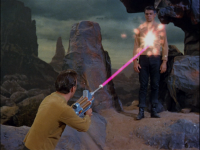
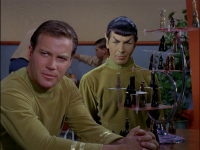
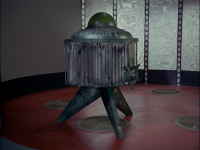
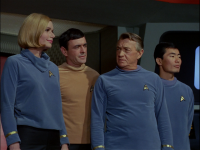
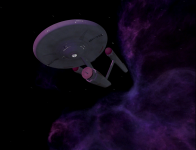
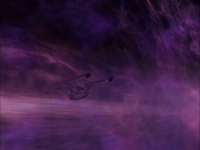
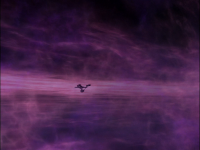
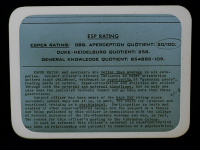
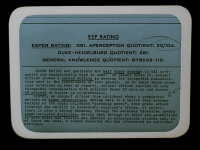
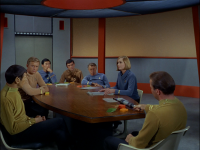
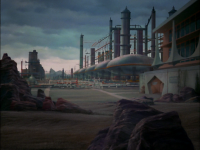
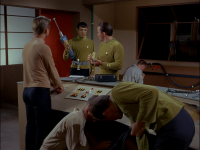
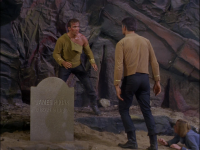
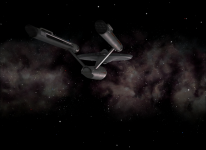
Star Trek TOS - 1x03 - Where No Man Has Gone Before
Originally Aired: 1966-9-22
Synopsis:
Kirk's friend Gary Mitchell is transformed into a god-like entity. [Blu-ray] [DVD]
Filler Quotient:
3, bad filler, totally skippable.
- This episode is profoundly annoying in characterization and filler plot-wise. Unless you're a hardcore fan, you should probably just skip this one.
Problems
- The existence of a gigantic and unexplained barrier at the edge of the galaxy which prevents ships from leaving requires an extremely high degree of suspension of disbelief, but who knows, maybe some god-like alien put it there...
Factoids
- The uniforms and makeup in this episode are slightly different because this was the second episode to actually be produced (after The Cage). As such, not all of the visual continuity in this episode is consistent with the rest of the series.
- This episode establishes that Spock is part human.
- This episode did not have the "Space, the final frontier" introduction.
- This episode establishes that Kirk's full name is James R. Kirk. This will later be retconned to James Tiberius Kirk.
- This episode strongly implies that humans during the time of Star Trek are slowly evolving telepathic abilities.
- Dr. McCoy is notably absent in this episode.
Remarkable Scenes
- Gary "sensing" trouble with the engines while in sickbay.
- Gary reading people's thoughts.
- Kirk: "I didn't order any..." (Spock walks in with the phaser rifle Scotty was referring to.) Kirk: "Affirmative, landing party out."
- Kirk trying to convince Elizabeth to realize that god-like power was never meant for humans because they lack the wisdom to use it properly.
- Kirk defeating Gary.
My Review
The Enterprise travels to the edge of the galaxy where it inexplicably encounters a gigantic energy barrier preventing ships from leaving the galaxy. Rather than the plot of the episode focusing on such an amazing discovery, instead we spend all our time focusing on Gary, who has become a god-like being due to exposure to said barrier. Why the energy barrier seems to impart god-like abilities on humans with high ESP ratings is a question also completely glossed over because, apparently, that's not interesting to the writers of this plot.
Instead, the plot drones on mercilessly telling us a story about how humans must not acquire such terrible powers, for they will abuse them with all due haste. Consequently, a story that could have been jam packed with the thrill of incredible scientific discoveries on a cosmic scale is reduced to essentially a rehash of Charlie X, except Gary somehow manages to be even more annoying a character than Charlie. I guess it's because at least Charlie has a decent excuse, given his childhood isolation. In any case, this episode is a huge flop and a big missed opportunity to do something much cooler.
The following are comments submitted by my readers.
- From Tony on 2008-09-23 at 4:09am:
Quick Factoid: This was the second pilot episode created for the series; “The Cage” was rejected, but the series was given a chance to create a second pilot and they made this, obviously, it was accepted.
And now for my review. I felt that this was a great episode, technical issues aside. It was engaging, and had an interesting situation. According to Wikipedia (Memory Alpha), the fist fight was what got this episode accepted, but that is hardly the best part. - From curt on 2010-04-06 at 4:06pm:
Again this is you being way to hard on the seies. We all know that this episode has its faults, but keep in mind its the 2nd pilot. Even the characters have not been fully created. And you call it cliche because of it's godlike premise, but this episode was made before Charile X. So I would say Charlie X is more cliche(Although I do like Charlie X). I know thats not the way it aired but you cant take anything away from an episode just because what order you watch them. Like the episode in Voyager season 1 where they try to get home, by going through a wormhole or someshit. If it bothers you to much, just watch them in a different order. Why cant people look over little plotholes and enjoy the overall story. Its not real life you know. - From john bernhardt on 2010-04-27 at 3:07am:
An alternate edit of this episode is available on the recent Star Trek Third Season Blu-Ray.
This includes a new intro and alternative opening monologue from Shatner along with different music cues and some never aired footage. - From CAlexander on 2011-04-04 at 12:22am:
I feel that this episode was OK, but could could been better. The way it is paced feels odd to me, sort of flat. We have very little time to see what Gary's original personality is, then he becomes a threat. They talk about his escalation of power being geometric, but it doesn't feel geometric at all – he instantly becomes a creepy supermind, then very slowly gains new powers. On the plus side, Gary does a good job of acting creepy and disturbing, without being so obviously bonkers that you want to kill him right away. And I felt for poor Kirk – how do you put your best friend to death because he is weird right now, but you think it is likely he will become an unstoppable menace in the future? It violates all normal laws and morals.
- Problem: After Gary is knocked unconscious, he has to stand upright on the transporter pad in order to be transported. It looks pretty weird.
- The psychiatrist seems to be about as good at psychiatry as the redshirts are at security. She does nothing useful! At least she makes up for it at the end by zapping Gary with her god powers. I liked that part.
- From Robert Koenn on 2011-08-03 at 6:57pm:
I found this episode to be fairly good. It's main theme was most definitely scifi core stuff and for being the first episode of this new series at the time was quite good. I gave it a six. Of course there were flaws, even a perfect episode has flaws but the overall theme and plot were very good. It was to me one of those more esoteric plots of the far future. A bit along the lines of some of the early Clarke conjectural stories. There are other episodes like Trouble with Tribbles that use the scifi universe for a fun time but this used it for a very intelligent plot and interesting story. Just my thoughts, hardly a big favorite but still fairly good. - From Mike Meares on 2012-02-07 at 10:17am:
I am not sure I would call “Where No Man Has Gone Before” a flop, but I do agree it could have been better.
The odd thing about this episode was although it wasn’t the first one aired it was one of the first ones I saw. It really drew me into the Star Trek world and it will always have a warm spot in my heart.
I do agree with the criticisms here but like someone pointed out it was the second pilot. But watching it now you can really see how the episode is struggling to form the ideas and characters that were later to develop into Star Trek.
The episode feels a little like Phase Two ( but much more professional of course ) in that it seems a little raw and uneven.
But one scene stills stand out for me in this one.
The scene in the Briefing Room with Kirk and Spock talking about what to do with Mitchell. That scene still gets to me.
When Spock says, “Then you have one other option, kill him while you still can,” that still floors me. I can’t think of another TV show that would ask our hero to commit murder. Very powerful.
Although I do agree not one of the best episodes but still pretty good. - From Glenn239 on 2012-10-04 at 3:44pm:
A '6'
Gary from Where No Man Has Gone Before is more interesting than the later “Q” or Trelane, but the Godlike powers he evolves and adversarial relationship with Kirk are a dead-end combination, as the ending to this episode showed. Gary was much more interesting to me in sick bay reading quickly and making observations about why the impulse engines were going to blow up than he was later strutting around the planet. They should have toned down Gary’s powers, make the relationship between him and Kirk as much distrusting as it is adversarial, give him vulnerability and a common problem to solve. Maybe even have Gary survive, though we’d certainly have to drop him off at a starbase rather than seeing the egotistical Shatner put up in the rest of the series with a rival that is in every way his equal.
I liked the strong female lead, even though that character’s opinions were unhelpful whenever they weren’t wrong. Shades of Troi, with the strong ESP thing. Pity the show didn’t stick to there being a strong female lead. I also liked seeing the evolution from the original plot to the second pilot. You can literally see the production team fixing one problem after another – casting, sets, props, uniforms – as they go, and their alterations are invariably steps in the right direction.
- From Schreck on 2013-05-23 at 5:23pm:
this second pilot has a lot of continuity errors, and i find it weird that the studio didn't like the first pilot because it was called "too cerebral" yet, they liked this one...i still think gary mitchell would have made a better story line than kahn for into darkness...i give it a 6.5 and my brother a 7... - From john on 2014-03-31 at 11:23pm:
This was a great episode. One of my favorites. It shows the fascination and desire for power inherent in all of us but that that goal is ultimately corrupted by human nature. Good production values, action sequences and dramatic story of Gary's escalating powers and the ambiguity in morality of how to deal with it. - From jd_juggler on 2015-03-22 at 1:48pm:
This episode did not establish kirk's full name as James R. Kirk; it established that Gary Mitchell THOUGHT that was kirk's full name. And nowhere in the original series is kirks full middle name given.
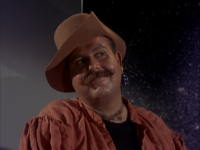
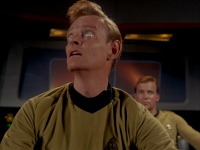
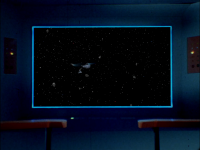
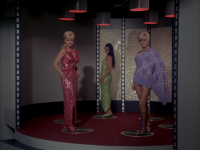
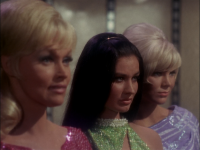
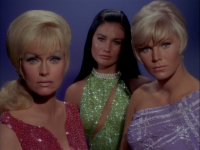
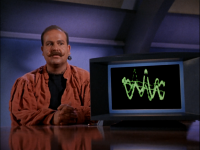
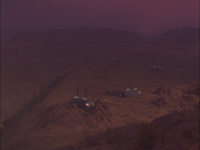
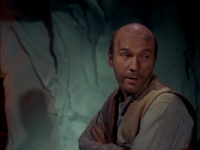
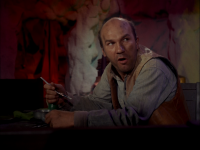
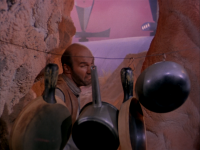
Star Trek TOS - 1x06 - Mudd's Women
Originally Aired: 1966-10-13
Synopsis:
The Enterprise rescues con artist Harry Mudd and his "beautiful" female cargo. [Blu-ray] [DVD]
Filler Quotient:
3, bad filler, totally skippable.
- Technically Mudd will recur, but all episodes which feature him suck, so they can all be considered bad filler.
Problems
- Visual continuity is a bit off in this episode because it was one of the earliest episodes to be produced despite it being aired so much later. As such, it's easy to notice some obvious out of place details, such as Uhura's uniform being the wrong color.
- If the pills were placebos, then why did the appearances of the women so dramatically change after taking them?
- Kirk's middle initial is established as T in this episode, which is retconned from it having previously been established as R in Where No Man Has Gone Before.
Factoids
- This episode establishes that the ship's power source is lithium based.
Remarkable Scenes
- Mudd: "You'll find out that ships' captains are already married, girl, to their vessels. You'd find that out the first time you came between him and the ship."
- Mudd's customers fighting over the women.
My Review
Mudd's Women does much to assault the credibility of Star Trek's progressive future which was supposed depict, among other things, a world without sexism. It makes sense that even in the universe of Star Trek that there are groups of people or cultural idiosyncrasies that constitute a throwback, but the way that the plot of this episode treats the whole thing as if it were normative and widespread is offensive.
What's worse is even setting that aside, this episode's plot logic doesn't make much sense. If Mudd's magic pills were placebos, then why did the appearances of the women so dramatically change after taking them? And why didn't any of the security personnel assigned to monitor Mudd report any of the numerous things they overheard to the captain? Add to that Mudd's acting. The less said about it the better. This is easily the worst episode so far.
The following are comments submitted by my readers.
- From Steve on 2010-02-16 at 6:32am:
My biggest problem with this episode is that there is no explanation of how Kirk figures out about the Venus drug. Did he interrogate Mudd? When? He beamed down awfully quick to have made the discovery and made the placebos. - From Devlonas on 2010-11-21 at 2:18am:
Mudd's magic pills were not placebos - they were sparkly. Only the pills that Eve took at the end were placebos (no sparkles!). It made the point, and did so in spades, that you don't need a magic pill to be beautiful (although I guess having a magic pill can't hurt).
My sticking point with this episode is - If Dilithium (Lithium) Crystals are so valuable, why is there only a three-man operation to mine an entire planet? Seems like a great opportunity for a larger colony to me - From Jem Hadar on 2010-12-05 at 1:32pm:
These new reviews are incredible, keep them up! - From CAlexander on 2011-04-15 at 3:56pm:
- This episode's old-fashioned sexism makes it painful to watch.
- Harry Mudd is amusing in small doses. I just wish he came in small doses.
- The police record for Harry Mudd lists him as 6'1". Aside from the unfortunate non-use of the metric system, he looks taller than that; he towers over everyone else he stands next to. That rascal have been slumping when they measured him! (IMDB lists Roger Carmel as 6'3").
- The moral of the story seems very confused. I guess the moral is "physical beauty is essential for gathering husbands, so it is a good idea to take drugs, but once you get a husband you won't need the drugs and you should send your drug dealer to prison so you don't have to pay him."
- From Mike Meares on 2012-02-20 at 8:00pm:
Kuddos on your comments on the last review Kethinov! A great point you made about how your reviews are made. And how you "try to write carefully balanced reviews and highlight both the good and the bad in each episode." I really liked that response!
However, I now find myself at odds with your review of "Mudd's Women."
You start your review with the claim that "Mudd's Women does much to assault the credibility of Star Trek's progressive future which was supposed depict, among other things, a world without sexism." And "the way that the plot of this episode treats the whole thing as if it were normative and widespread is offensive."
Really? I don't get that at all from this episode.
However, I do agree with the criticism that the issue of sexism is a problem with Star Trek overall ( more on this later ), and in some episodes in particular. And there is sexism in Mudd's Women but I don't feel it is to the degree you aledge to.
I do think Devlonas has already pointed out that the "pills" were not placebos until the very end. That is pretty clear from watching the episode. But your main point is still correct, when Eve swallows the placebo at the end of the episode how does she change her appearence so dramatically? That is a question that needs answering.
And I too had some questions about the security personnel and what they overheard. But Harry and the girls did do a lot of whispering. Perhaps the security guys were effected by the drug the women were taking as the other male members of the crew?
As to the acting by Harry Mudd ( or rather Roger C. Carmel ), which I thoughly enjoyed, I didn't think it was a weakness. Harry Mudd was a great character and I always loved seeing him on Star Trek. Roger is a highlight for me in this episode!
As to the moral of the show, I feel it is summed up near the end by Kirk and Mudd when they explain that only one kind of man or woman can change their appearence, if they want to, are the ones who believe in themselves.
For me it is a lot more offensive to have a Captain who goes around sleeping with every woman he sees! That is sexist! To me having a whole race of women who depend on a man to exist ( Spock's Brain ) is sexism in the highest order! To me having women crew members on board the Enterprise wear short skirts is sexist! To me giving up producing and writing for Star Trek in it's third season to produce a degrading movie about women ( Pretty Maids All In A Row ) is very sexist!
But I digress....... lol.
Was this a great episode? No! But it was entertaining, although a bit average for Star Trek.
- From Strider on 2012-07-16 at 3:40pm:
I'm not at all blind to the sexism in Star Trek in general or in this episode specifically. It's interesting to watch as a cultural study--not that the 23rd century still struggles with these issues, but that the 1960's did.
But it seems completely realistic to me that the 23rd century would still have mail-order brides. It didn't seem like sex-trafficking to me, just matching women who wanted a new life with men who wanted a wife but had very little chance to meet one. Not that Harry Mudd is anyone's example of ethical business practices--he did, after all, try to make the women more attractive than they really were. But besides the "strange effect" they had on men, all the pills really seemed to do was style their hair and apply makeup. If you're going to marry a rich lithium miner, you can probably get someone to do that for you.
But the highlight of this episode for me was Spock. Some of Spock's best facial expressions of the whole series are included in this episode. When the women appear on the transporter platform, they cut to his face first, and it's obvious that he notices their attractiveness, and is just as poleaxed as the other men in his own quiet Vulcan way. Spock's just better at hiding it, is all. Mudd declares him impervious to the women's influence, but Spock didn't say that--he just didn't argue it. Then all throughout the episode, he's got these half smiles and raised eyebrows...like he's extremely amused (for Spock), but aware that the joke's on him as well. He never seems to be laughing AT the other crewmen, just ABOUT the situation.
And it was nice to have Kirk able to keep his mind on the job rather than on the beautiful women in front of him! Very captainy of him--and he and Spock were a great team in this.
Strider - From mandeponium on 2012-09-01 at 4:11pm:
To quote Spock in this one, "I'm happy the affair is over. A most annoying, emotional episode." - From Alan Feldman on 2012-09-08 at 6:49pm:
I like the Mudd character and was also glad to see him in "I, Mudd".
Re Mike Meares' post:
Kirk didn't sleep with anyone in this episode. In fact, he doesn't sleep with anyone in the vast majority of episodes.
I don't see "Spock's Brain" as sexist in that manner. They needed a brain, not a man. It just happened to be a man's brain. And it was the women who controlled the men!
Re the short skirts: from TV Guide, August 24, 1996, p. 26:
TVG: Anyone offended by the micro-skirts? The sausage-casing blouses? Grace Lee Whitney: Oh, no! Everyone thinks we got rooked into it, but that's what we wanted to wear. I was very instrumental in getting us those mini-skirts -- which, by the way, were skorts. . . . I told the costumer, "Hey, I look just like the men. What a shame to waste my legs. You know, I've got great legs." And then I got this image of space babes with the tight waists, cinched belts, short skirts, and lots of legs and boots and boobs, and great big "Barbarella" hair. So I got that look together and showed it to Gene. He just about fell off his chair. . . .
Hey, that's Grace Lee Whitney speaking, not me. Don't have that edition of TV Guide? Check
http://books.google.com/books?id=mqjORRNpo-cC&lpg=PA39&ots=aJmVwm3IBm&dq=tv%20guide%20grace%20lee%20whitney%20%22space%20babes%22&pg=PA39#v=onepage&q=tv%20guide%20grace%20lee%20whitney%20%22space%20babes%22&f=false
That's the closest to this I could find on the Web. But I do have a copy of this edition of TV Guide, and took my quotes from that.
According to wikipedia, Roddenberry wrote two episodes for season 3: "The Savage Curtain" and "Turnabout Intruder". I don't know if he produced any.
AEF - From Zerothis on 2012-09-22 at 1:06am:
I was under the impression that real pills confiscated from Mudd and the placebos were provided after. Eve's last scene was the only place that placebos were used. - From Schreck on 2013-05-23 at 7:02pm:
Terrible episode that is easily the worst of the first season and my brother’s least favorite in the original series…it just misses all the marks here…I give it a 5.25 and my brother a 4.5 - From Alan Feldman on 2017-04-08 at 3:54am:
MUDD'S WOMEN
A few things to add:
How is it that a starship has trouble keeping up with Mudd's small ship? Really? I seriously doubt that Mudd's ship could go warp 8.
Bones' and Scotty's reactions to the women were nauseating (for lack of better word), esp. in the transporter room. C'mon guys. Get a hold of yourselves!
When Ruth steps in front of Bones' medical scanner, it bleeps and flashes. We then see Bones for a second or two and then go immediately back to the scanner, and Ruth is gone! Back to Bones for a second or two, and back to the scanner with Ruth in front of it again. Doubtful she could have moved that fast. And this sequence happens twice.
Ruth says the men are young. Hardly! Yet again, women getting together with men twice their age.
When Childress told Kirk he'd get the crystals later, why didn't Kirk just beam the women back to the ship and hold them hostage until the crystals were delivered? Or they could have made use of their phasers.
Spock has a (circular) slide rule!
Ben Childress's quarters is 11 miles from the mining place. 11 miles? That's quite a long, difficult walk, esp. on that wasteland of a planet!
When Kirk and Mudd say there's only one type of man or woman, Kirk mentions two types.
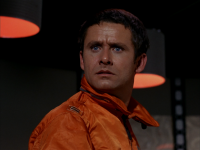
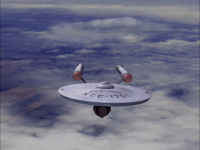
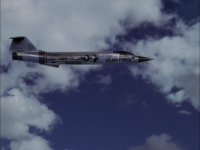
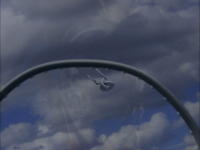
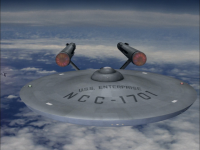
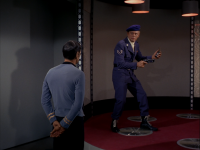
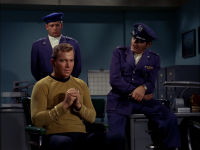
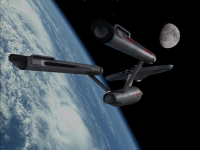
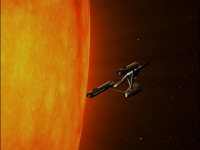
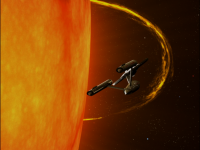
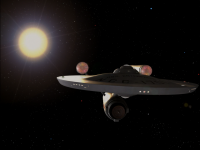
Star Trek TOS - 1x19 - Tomorrow Is Yesterday
Originally Aired: 1967-1-26
Synopsis:
The Enterprise is thrown back to 20th century Earth. [Blu-ray] [DVD]
Filler Quotient:
3, bad filler, totally skippable.
- Pretty lame episode with no significant long term continuity.
Problems
- The pilot beamed off the aircraft shouldn't have been standing upright after transport because he was sitting in the plane cockpit.
- Kirk mentions that the Enterprise is a "United Earth" ship, which seems to contradict the previously retconned establishment of "The Federation" in the previous episode.
- In the remastered version of this episode the remastered shot of the Enterprise orbiting Earth with the moon in the background has an error. The moon is partially covered in darkness, but in the area covered by darkness you can see stars through the moon as if it were transparent.
- Kirk's interrogator threatens to lock Captain Kirk up for two hundred years. A bemused Kirk replies, "that ought to be just about right." However, in fact it would have to be three hundred years for that line to be "just about right" due to it having previously been established that Star Trek takes place in the 23rd century.
Factoids
- Kirk said in this episode that there are only twelve ships like Enterprise in the fleet at this time.
- Spock's rank is established to be that of lieutenant commander in this episode.
- This episode was meant to originally be a follow up to the time warp in The Naked Time.
Remarkable Scenes
- The Enterprise being chased by US fighter aircraft.
- The look on the pilot's face after having been beamed up.
- Spock meeting the pilot.
- The computer being awkward.
- The pilot arguing that his sudden absence from Earth would have just as adverse an effect on the timeline as his returning with information from the future would followed by Spock countering the pilot's argument by claiming that according to his research, the pilot never contributed anything significant to history anyway. Ouch.
- Spock discovering that the pilot must be returned to Earth after all so that he may father a child who goes on to make significant contributions to history.
- The Air Force sergeant's behavior after having been beamed up.
- Kirk's interrogation.
My Review
A gravitational anomaly accidentally propels the Enterprise into the past whereupon the crew accidentally contaminates the timeline. I've never been a fan of the use of time travel in science fiction mostly because the power to travel through time is unimaginably dangerous in its implications and the resultant time paradoxes are a storytelling nightmare. Most time travel stories irresponsibly gloss over this stuff and this episode is no exception. While this episode goes to great length to clean up the timeline to remove all contamination, it does so at the expense of the credibility of the Enterprise's century because we've now learned that the magic time travel technique Spock invented in The Naked Time is a pretty damn reliable tactic. Twice now we've seen the Enterprise travel through time just by Spock crunching some numbers and plugging them into the ship's computer and twice now the implications of this power have been ignored as relatively trivial.
The truth is that no society, not even one as enlightened as the Federation, or United Earth, or whatever they're calling themselves now is going to ignore this kind of power the way our heroes seem to be doing. If Spock's magic time travel formula is as accurate, useful, and reliable as depicted in this episode and as depicted in The Naked Time, then why not go back in time and erase the Earth-Romulan war in the same fashion they erased their mistakes in this episode? Why not travel into the future in order to plunder its technological advancements? Why not do any of a million possible things this sort of technology enables? I'll tell you why. Because the writers have failed to properly comprehend what would realistically ensue if time travel technology were actually invented.
But misuse of time travel isn't this episode's only sin. I'd be negligent if I didn't mention the embarrassing "sensual computer" scenes, or the fact that Captain Christopher managed to escape his quarters because nobody felt it necessary to place a guard, or the even more idiotic decision by Spock to inform Captain Christopher of the significance of a child he hasn't even had yet. It's a good thing Spock's magic time travel formula let them erase that mistake.
What was with that whole transporter merging memory wiping thing anyway? Kirk says he'll transport Captain Christopher to a time before any of this happened which will cause him to have no memory of these events. Is the transporter somehow combining the uncontaminated Christopher with the contaminated Christopher and erasing the memory of future events? If so, since the goal is to no longer have a contaminated Christopher, then why not just blow the contaminated Christopher right out the airlock instead rather than risking a dangerous transport operation in the middle of the whole silly slingshot effect? Doesn't this transporter merging of the two of them effectively kill the contaminated one anyway? Because I fail to see the difference between that and merely executing the contaminated version. Either way an uncontaminated version lives out his normal life as history intended.
As written, this episode is simply riddled with far too many technical and logical problems to be worth many points. Let's all hope the next time they use time travel on Star Trek they treat the subject with a bit more care and take the implications of what would realistically ensue due to their plot device a bit more seriously.
The following are comments submitted by my readers.
- From 411314 on 2009-06-15 at 8:45pm:
I really enjoyed this episode and seeing the reaction of a character from when this was made seeing the future as presented in Star Trek. The slingshot effect didn't bother me at all. Obviously, Star Trek takes place in a fictional world where the rules are different from what they are in the real world. - From Arianwen on 2010-07-21 at 2:15am:
Also one of my all-time favourite episodes. The dialogue was excellent, the acting on a par to the dialogue. I really think this is one of Shatner's best episodes.
The slingshot effect is probably very daft (so is the whole time-travel thing; they managed to drop their visitors off at the exact moment after they had taken them?), but then so are most of the premises of Star Trek or any other Sci-Fi show. (Ever seen Doctor Who? Now there's suspension of disbelief for you.) - From Strider on 2012-10-24 at 5:50am:
This is one of my favorites, too. I liked that Captain Christopher was strong and not easily intimidated, and that he both gave respect and earned the respect of the Enterprise's officers. I could really see him becoming a starship captain if he'd been born at the right time. When Spock stopped him from holding them hostage at the end of the episode, I got the sense Spock knew what to do because he knew Jim so well, and Captain Christopher was the same kind of man.
As far as time travel goes...if this happened to me and my crew, it would never make it into my log. I wouldn't want Starfleet or the Federation to have that information. - From Alan Feldman on 2013-02-11 at 5:33am:
TOMORROW IS YESTERDAY
Ridiculous time-travel problems, but if you can swallow them, this can be a fun episode to watch. Ok, let's go!
>----o----<
Near the end of the episode they're heading for the Sun. What do we see on the screen? Stars whizzing by and no Sun. Where is the Sun? They're heading straight for it and it's not on the screen! What are all these "stars" moving by doing in the Solar System? At times the ship doesn't look like it's moving at all.
>----o----<
There's another problem with the scene with the Moon in the background: Not only can you see stars through its dark side, the moon, as rendered, is WAY TOO BIG! It wouldn't look any bigger from low-Earth orbit than it does from the ground. Still yet again, the remastered effects make things LESS realistic.
>----o----<
Yeah, the time-travel paradoxes are a nightmare. My additional question: How can you change a future that already happened? Does this question even make any sense? If it does, then they can't screw things up; otherwise, the Enterprise and its crew wouldn't already be as they are/were in the 23rd century in order to go back to the 1960's to be as they are/were then to mess things up in a way that makes everything happen as it did the "first time", as there is no "second time". Got it?
And what about the butterfly effect? Well, it turns out that it is irrelevant.
OK, analysis: There is a time interval in which there are four Enterprises at the same time. One is the one that first went back in time. The second is the Enterprise going forward again, splitting off from the first. If those on the second Enterprise could see their counterparts on the first one, they'd see them going backwards, and vice versa. The third Enterprise is going back in time as it heads toward and then away from the Sun. The fourth is the ship going forward in time again, back to the 23rd century. Again, each crew would see the other going backwards. And, as I mentioned in my review of "The Naked Time", there will be two overlapping enterprises near each turnaround point. Sorry my diagram didn't make it over intact in that review. Think of it this way: You're in one place at 2:00 going backward in time. At 1:00 you switch to going forward in time and at 2:00 your in another place. So at 2:00 you're in two places at the same time, going backwards in one, and forwards in the other. At 1:00 your two places are overlapping and begin to separate. So from the viewpoint of an outside observer, you suddenly appear as two overlapping ships that separate, with one crew going forwards and the other going backwards. Cool, huh?
Things like this are what you'd have to accept in order to believe in time travel, unless you make a discontinuous jump in time, in which case you can avoid this overlap paradox.
As for Captain Christopher: If Spock and crew got the timing just right, Christopher was being beamed out of the plane by the Enterprise going forward in time the first time at the same time that the Enterprise going forward in time for the second time beams him back in. And that time one beaming him back is going faster than warp 8 while beaming him back! If Spock's timing is off, there will be a time interval with either no one in the plane, or two overlapping pilots in the plane. Yuck! Now the hardest part. Does the plane break up, or return to base? Both possibilities are going forward in time. The episode has him doing the latter, but I think in fact it would be the former, with our new Christopher ejecting or dying in a crash. Why? At this point there are four Enterprises. And one of them destroys the plane with a tractor beam. None of the other three can do anything to prevent that, so the show is inconsistent. And he would later appear out of nowhere to snoop around the base with Kirk and Sulu. Sometime after that he'd be beamed up and never appear on Earth again! But that's not how it happened on the show. We have the same problem for the sergeant encountering Kirk and Sulu, but this has the same contradiction problem. So according to the episode, all this trickery somehow wiped out the version with the plane breaking up and the sergeant finding Kirk and Sulu looking for films. Sorry, that doesn't fly. It's a total mess. Well, I almost got it to work.
So what would this look like to an outside observer? This is basically what I said above, but in chronological order. She'd first see the Enterprise, with our "stowaways" on board, pop out of nowhere. It would immediately turn into two overlapping ships and would begin to separate. (This violates conservation of energy, energy in the form of mass, i.e.) The overlapping ships then continue to separate with one heading for the Sun, with its crew doing everything backwards, and the other heading for Earth, doing everything forwards. Both have Christopher and the sergeant on board. Both Enterprises then pass near each other by Earth. One transports Christopher from the plane to the ship. The other from the ship to the plane. Note that the Enterprise coming from near the Sun is traveling at over warp 8 while they beam the stowaways back to Earth! The outside observer would then see another pair of Enterprises pop out of thin air and separate. One would be in orbit with the crew going forwards. This one would beam Christopher and the sergant up to the ship. It would later head for the Sun. The other would head for the black star with its crew going backwards. So we find that at two points, one Enterprise would beam people up from Earth, and another would beam them back down. Then the unavoidable contradiction.
AEF, a.k.a. betaneptune - From Scott Hearon on 2014-03-21 at 10:34pm:
Not a very good episode, for all of the reasons that Kethinov points out. Time travel is always a tricky one, and unless handled very deftly, a ruinous one. Some people don't mind the paradoxes, contradictions, and willful ignorance of writers towards the ramifications of time travel. I, however, am often greatly bothered by sloppy time travel stories. This was one of them.
I found Kirk's attitude in this episode pretty annoying, too. Partially due to the script and partially due to Shatner being Shatner, the smarmy, self-satisfied demeanor was a nuisance. His sarcasm and condescension towards the Air Force officers, who were only doing their jobs, seems far beneath one of Kirk's station.
If had been watching this episode back in 1966, I probably would have been pretty disappointed. Much of the story takes place on "modern" Earth, which is not what I'm watching a science fiction show for. Add in the fact that the "science" in the fiction is weak, and it's not a very strong entry into the canon. - From Alan Feldman on 2014-11-28 at 6:10pm:
TOMORROW IS YESTERDAY - My 2nd post
Correction to my first post:
I got the time-order of events as seen by an outside observer not quite right, or at least not clear enough! I will correct it here. (Recall that we get multiple ships as follows: Say at 1:00 you're going forward in time. At 2:00 you start going backward in time. So at 1:00 you're going backward in time. And now your ship is in two places at the same time!)
There are basically as many as five ships from the viewpoint of an outside observer present at a single time. As viewed by our heroes, there is one ship on one trip, but divided into five parts in time. I drew myself a space-time diagram to figure this all out, but unfortunately I am unable to post it here. I'm forced then to leave this as exercise for the reader: Draw 7 parallel horizontal lines on a sheet of paper (landscape mode). Label them t0 at the bottom through t6 at the top. Draw a vertical line on the left (leave a little room for ship A). That will be the black star. Draw a vertical line down the middle to represent Earth, and one on the right to represent the Sun. Draw the path through space-time based on my description below.
A - going forward in time, from before any of this happened, to the encounter with the black star, t0 -> t6.
B - going backward, from the black star to earth, t6 -> t2
C - going forward, from earth until zooming toward the sun, t2 -> t5
D - going backward, as they zoom to, and then away from, the sun, t5 -> t1
E - going forward, passing Earth for the beam-backs at t3 and t4, as they return to their own period, t1 -> t6 and forward.
An outside observer would see A through E as five distinct ships. Here's the timeline. Each t<n> is a point in time:
t0 - Just one Enterprise, zooming along before any of this happened.
t1 - Ships D and E appear out of nowhere at the same place -- yes, overlapping -- and then separate. Inside D, from t1 to t5, things are going backwards. This is the second turnaround from going backward in time to forward in time as seen by our heroes. Ship A is also present.
t2 - Ships B and C appear out of nowhere at the same place and then separate. Inside B, from t2 to t6, things are going backwards. This is the first turnaround from going backward in time to forward in time as seen by our heroes. Ships A, D, and E are still present. There are now five ships existing at the same time!
t3 - Ship C beams up the pilot, while at the same time ship E beams him back to the fighter jet. Ships A, B, and D are still present. Shortly thereafter, the fighter jet breaks up.
t4 - Ship C beams up the sergeant, while at the same time ship E beams him back to the base. Ships A, B, and D are still present.
t5 - Ships C and D merge together and disappear. Ships A, B, and E are still present. This is the second turnaround from going forward to backward in time as seen by our heroes.
t6 - Ships A and B merge together and disappear. This is the first turnaround from going forward to backward in time as seen by our heroes. Ship E continues to the next episode.
At some unknown time between t1 and t5, ship D reaches its closest point to the sun, and then reverses to move away from the sun.
Kirk and Sulu are on the base at some time period between t4 and t5.
From t2 through t5 there are five ships present!
There are then two problems: (1) the sergeant would remember what happened when he was on the Enterprise, and (2) at time t3, ship C destroys the fighter jet, while ships A and E do nothing to put it back together. Too bad for Captain Christopher!
But if we follow what Kirk says, from Christopher's viewpoint, what happened from the time when he was beamed up to the time when he was beamed back, somehow "never happened". And similarly for the sergeant. This is quite problematic for what the outside observer sees!
Yes, this is what you get when you work it out. And having multiple Enterprises popping out of thin air, so to speak, and disappearing, violates conservation of energy (energy in the form of mass), which is one of, if not the, most firmly established laws of physics.
>----o----<
Some new comments:
Spock complains about "poor photography" (funny!) while he's smearing up the film with his hands!
Capt. Christopher is credited as _Major_ Christopher in the ending credits.
Can you imagine what it would be like to be transported by surprise, and not having watched Star Trek? I think Capt. Christopher was surprisingly rather underwhelmed by it. I mean, really. He was flying a fighter jet, then suddenly he's standing in the transporter, and his first words are, "You speak English." Only later does he start asking the obvious questions and such. He then adjusts to the situation rather quickly. The sergeant's reaction seemed like a much more likely and believable one to me -- well, perhaps a little too overwhelmed.
"Now the experts can figure out who you are, what you are."
"I'll have it disassembled and examined. We are not dummies, mister. We know how to find out things we want to know."
Who are these experts, and how can they be this good?
>----o----<
To Kethinov, who asked, "What was with that whole transporter merging memory wiping thing anyway? . . ."
Yes, the beam-merging makes no sense. But it's not just that. They have to wipe out the part where Christopher's jet is destroyed. I don't see how the beam-merging is supposed to fix that. It's nuts, but if you go with it you get a fun episode. I still enjoy watching it, though I do cringe during the beam-mergings. And the reason to watch it is the interactions between our heroes and 1960s people. Oh, and the computer being affectionate, with Spock being disgusted by it being female! "Computed"!
>----o----<
To Scott Hearon:
I like the scene with Kirk being questioned by the Col. Fellini. I think Kirk did just fine. So he made a single smart-ass remark. I don't think it's _that_ much of a big deal. And here we have clear evidence of our heroes normally being 200 years, not 300, in the future (from c. 1967).
As far as this episode taking place on "modern Earth," we also have our heroes and the Enterprise from 200 years in the future interacting with present-day people (assuming you're in the late 1960s, of course). That, and the fact that there is some time travel going on, make it science fiction.
Weak science in just this episode? The entire series is loaded with weak science, and occasionally really, really bad science ("The Alternative Factor" comes to mind). Still a fun show to watch, except for a very few episodes.
AEF, a.k.a. betaneptune - From Alan Feldman on 2017-07-23 at 10:45pm:
"TOMORROW IS YESTERDAY" Post 3
Another problem with the scene with the Enterprise, Earth, and Moon in
http://kethinov.com/images/startrek/TOS1x19g.png
The lighting on the ship is not consistent with that of the moon. From the moon we can see that the Sun is behind us. But the Enterprise is lit from a Sun in front of us. What's the point of trying to make things more "realistic" if they screw things up like this? It would not have taken much to get it right. So we have at least three things wrong with this picture:
1) Can see stars through the dark side of the moon.
2) Moon is way too big. (It wouldn't look any bigger from low earth orbit than from the ground. And you can't see that much detail from the ground. And it can't be a telephoto shot because in such a shot the engines would _look_ parallel or at least _much closer_ to parallel.)
3) Angle of the sun is different for the ship than for the moon. (Explained above.) - From Chris on 2018-02-08 at 5:27pm:
One additional problem with this episode aside from everyone else's!!!
Cap't Chris somehow says, "You seem to have a lot of 'em..." Referring to problems on the Enterprise, yet he's seen no problems of any kind!!!
THANK YOU VERY MUCH!!! Just sayin'... ;-)
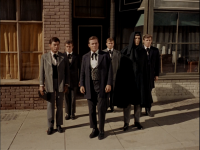
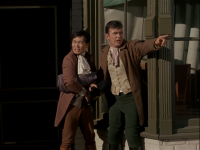
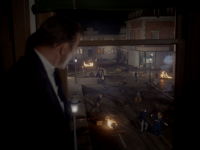
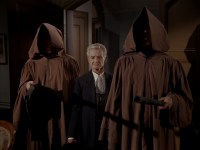
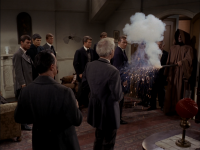
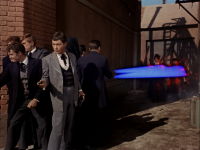
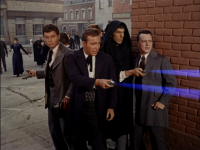
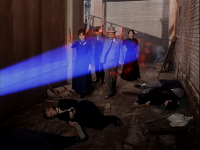
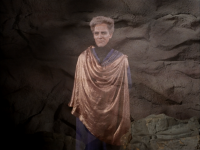
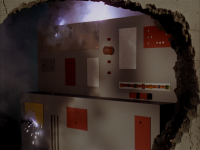
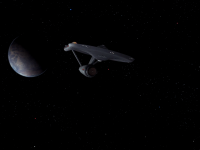
Star Trek TOS - 1x21 - The Return of the Archons
Originally Aired: 1967-2-9
Synopsis:
The Enterprise crew finds a world run by a computer named Landru. [Blu-ray] [DVD]
Filler Quotient:
3, bad filler, totally skippable.
- Pretty lame episode with no significant long term continuity. This is the first episode to mention the Prime Directive, but you don't need to watch this episode to understand the Prime Directive when it is used later. Ironically, Spock misuses the term in this episode, so add that to the list of reasons to skip this episode. ;)
Problems
- The window in the room where the landing party stays overnight seems to randomly shift between being pitch black and having a clear view of the festival violence.
Factoids
- The starship Archon disappeared when visiting this planet 100 years ago.
- Jon Lormer, who plays Tamar in this episode, also played Theodore Haskins in The Cage and in The Menagerie.
Remarkable Scenes
- The festival of violence. Nothing like a healthy bit of meticulously scheduled anarchy.
- The instant the clock chimes the violence either starts up or completely stops. Hilarious.
- Kirk neck pinches a guard, then Spock punches one out. Kirk to Spock: "Isn't that somewhat old fashioned?"
- Kirk telling the computer to destroy itself.
My Review
The Federation starship Archon reportedly disappeared while exploring the planet in this episode and the Federation apparently didn't bother to dispatch another ship to investigate the disappearance until 100 years later for no particular reason. By the time the Enterprise arrives, the Archon's apparent descendants seem to have colonized the planet but reverted to a 19th century society in the process, also for no particular reason. After a painfully slow-paced and dull plot, Kirk and his team finally discover that a computer apparently left behind by former occupants of the planet is what originally brought down the Archon and transformed its crew and its descendants into zombies. Once they discover this, Kirk and Spock simply talk the computer to death, because computers in the Star Trek universe have a tendency to be emotionally unstable and explode when they are sufficiently upset, contrary to how computers work in the real world.
And then there's lieutenant Lindstrom, the mouthy officer who accompanied Kirk to the surface. Nearly every word out of that guy's mouth jeopardized the mission. My favorite one of his lines was him saying "what kind of a father are you?" to the only man on the planet who could offer the landing party any answers or help. Way to go trying to alienate your only ally there! But Lindstrom's not the only moron among the cast this week. I'd be negligent in my duties if I didn't mention that Spock took readings which indicated a clear and present threat to the Enterprise, but failed to mention it. Kirk later in the scene deduces the threat to the Enterprise and was forced to ask Spock for confirmation of his hypothesis. Spock answers in the affirmative, as if it was obvious. No, Spock, it isn't obvious. That's why Kirk asked. Spock also mentions a non-interference policy that the Federation has called the Prime Directive, but such a policy clearly would not apply when dealing with humans descended from a Federation starship! This isn't Spock's day.
Landru himself wasn't exactly the brightest star in the sky either. My favorite line from him was the one about how he had created a world without conflict or violence or war. Yeah, all except for that "festival" thing. Apparently when the violence is scheduled and regulated it doesn't count anymore? The episode didn't even try to explain the purpose of the festival. Although I admit the festival scenes were the high point of the episode simply due to the sheer absurdist comedy value. Pretty much everything else in the episode is a waste of time. The poorly acted zombie antagonists spend most of their time just rambling slowly and incoherently. Frustratingly, they resist nearly every one of Kirk's inquiries for exposition about Landru. It's as if the plot is self aware. "Quiet! Be careful! Don't ask too many questions! We don't want the plot to advance too quickly! We've still got two more acts to get through!" But hey, at least the 19th century costumes looked great on the cast despite being strangely irrelevant.
The following are comments submitted by my readers.
- From John on 2007-02-25 at 6:38am:
I believe this episode is a stab at organized religion (most likely Christianity). Example: People blindly following the "will of Landru." Gene Roddenberry was an unapologetic atheist. This episode would be consistent with his core religious beliefs. - From Orion Pimpdaddy on 2007-12-10 at 4:18pm:
Problems:
- At the beginning, when Sulu and the other crewmember are standing against the wall waiting to be beamed up, you can clearly see a reflection of one of the hooded lawgivers waiting to enter the scene.
- The episode never explains why there is a festival. - From David in California on 2008-02-20 at 6:06pm:
Wow, I've never been so put off by the difference between my own reaction to an episode as compared to that of others. I thought this one was terrific!
I disagree that the only interesting part was the revelation that Landru was a computer. That was, as you say, somewhat standard. Moreover, the script is aware of this and works to ensure that it doesn't come off as the main point. Spock and Kirk both indicate several times that they suspect it's the case, and when Landru is revealed the exchange of looks between them and Kirk saying "of course" in an unsurprised way just to drive this home. Then they quickly dispatches the computer through simple logical appeal to its prime directive.
Rather, I believe the focus of the episode is supposed to be around the reactions of the various people on the planet and the effects on them.
The Festival is one such effect, and I think it's understood that the only way Landru can keep suppressed passions from boiling over is the occasional scheduled release of the anarchy. Personally, I find this notion dubious philosophically and psychologically, but it's surely a common enough idea to be grasped without explicit explanation?
Also, we see the effect of some resisting and forming the "underground", the emotional reactions to the Festival and their enforced participation and on family members, how they hold onto a messianic myth about returning Archons, how they react to the introduction of the "outsiders", how they react with fear to the growing revelations about Landru, and so on.
Now, I'm not saying any of the above is astoundingly original or anything, only to point out that the reveal of Landru as a machine isn't really the point, and that the episode is more concerned with the reactions of the human characters and is handled well, IMO.
As to the theme against so-called "organized religion" (should we prefer disorganized religion?) even as an atheist myself I don't see why the reaction of a believer would be that this is somehow wrong or grossly polemic in some offensive way. I know religious folk who would acknowledge that there are "bad" aspects to a certain *manner* of holding religious belief--the blind conformity to unexplained traditions, the willful resistance of thinking and understanding and fear of inquiry, etc.
So, overall as I'm watching the new CGI enhanced TOS and catching those few that I'd not seen while growing up, I was delighted to come across this one for the first time and disagree with both the review and the prior reader comment. - From Deggsy on 2012-02-22 at 12:12pm:
Hi, love the review website, always up for commentary on Trek :-)
As for this episode, as far as I am aware, the plent and its people were already here, and the Archon came along, got caught up in Landru and his cronies, and were absorbed into the society. The locals' descendants then built up the myth about "Archons" someday returning.
- From Ryan on 2012-06-20 at 11:13pm:
I think you may have missed a major part of the plot which may be contributing to your low rating of the episode. As one of the posters above me noted there were definitely people on the planet long before the "Archons" arrived. Landru lived 6k years ago. So the Archons didnt revert to a random 19th century age, thats just where the people of this planet had progressed to so far. - From ChristopherA on 2012-07-11 at 11:58am:
It feels like someone wrote a solid science fiction story, then it was rewritten and edited into a disorganized mess. Practically nothing about the society is explained to us, we just get led from one scene to another. The pity is that most of the individual scenes could have been good had they been part of a better connected story. You can imagine what they might be trying to achieve (with the festival, for instance), but it just doesn't come together in the final product.
- The way in which Kirk defeats Landru is especially unconvincing, even for Star Trek. Proper form for destroying computers in Star Trek is to use the computer's own logic to prove it has violated its own directives. But all he really does here is to assert without proof that the computer's stagnant society is bad rather than good. Why would the computer just take Kirk's word on this and destroy itself?
- From Alan Feldman on 2013-03-08 at 3:50am:
RETURN OF THE ARCHONS
This episode takes bizarre to a whole new level.
Re the Festival: When do the cleaning crews arrive? And with all the rock-throwing you'd think some ambulances and repair crews would be in order. I'm guessing this must be an annual thing. A society couldn't survive if it happened much more often. And at some point in this episode the Festival is completely forgotten.
I like the way Bilar speaks. I also like the voices of the Lawgivers. Their hoods and robes look cool, too.
All of the inhabitants we see are zombies except for a few. It is understandable that the members of the underground aren't, as they are immune to "absorption", and are therefore not of the Body. But why is Hacom not a zombie? And why doesn't he notice the difference? Actually, before Festival, Bilar and Tula aren't _totally_ zombied out, but they're not normal, either.
Yeah, it's frustrating with Kirk constantly asking about Landru and not getting much of an answer.
Landru looks pretty cool and spooky.
The scene with Kirk defying the lawgivers is just plain goofy. Tamar is killed by a sparkler tube. After brief defiance by Kirk, the Lawgivers consult. Then the talking one clarifies. Kirk defies them again and simply grabs the tube (even though he wasn't close enough in the preceding shots). As a result, the Lawgivers turn 90 degrees as our talking Lawgiver says, "It is Landru." Hacom turns and says, "Landru", and just leaves. Why? Where does he go? Then Reger leads everyone out while the Lawgivers are "communing". Say what?
Of all three times Kirk talks a computer to death, this is by far the worst. Spock's brief lines during this scene don't really help. Kirk and Spock tell computer Landru that the Body is dying. Well, the Body is bizarre and lame, but not dying. Seems stable to me, aside from the occasional "Festival". After a brief display of hubris, computer Landru becomes increasingly incoherent, erratic, confused, and panicked. These are elements of a "mere machine"? I like it when computer Landru says, "Help me! Help me! Help me! Help me! Help me!" as it destroys itself. Where did sci-fi writers of that era get the idea that computers are packed with explosives and can be talked into suicide?
There are reasons the Landru society was sick, but not most of the ones Kirk came up with. And instead of celebrating anything positive that the newly freed inhabitants might have done they go for domestic quarrels and knock-down-drag-outs, which is defined at webster.com as "marked by extreme violence or bitterness and by the showing of no mercy". This is a good thing? I think freedom and creativity should be celebrated instead, which is something Spock should have pointed out. The problem wasn't that the society was too peaceful (again, forgetting the Festival); it was that it was lame, boring, devoid of freedom, and apparently stagnant.
AEF, a.k.a. betaneptune - From Rick on 2013-05-01 at 5:09am:
I think I finally featured out the festival. I think its Landru take on human mating. Seriously.
There are a couple references to this. One of the old guys says that Kirk is young so he should be out there. That one is pretty weak, but the main one is that in every scene there is a man picking up a woman, throwing her over his shoulder and running off the screen. Cant believe I didnt see that before but its there. They couldnt come out and just call it an orgy so they went with this festival thing. - From kevin on 2017-02-09 at 5:58pm:
Very under rated, but still flawed. The ending alone of talking the computer to destroy itself was horrible. Many other points seemed obvious to me,such as the Festival. I believe they mean it only happened rarely, as they mention Kirk and crew travelling a long way to participate in it, and as mentioned above was most likely an orgy or sorts, and violence to get out pent up anger.
The planets people had been there for over 6000 years, so the main review missed that. The archons were simply assimilated into their 19th century society.
A great idea, but not well executed in some key ways.
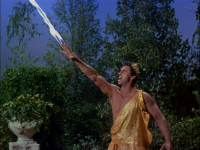
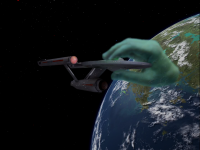
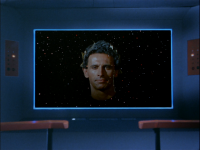
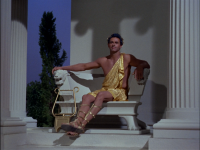
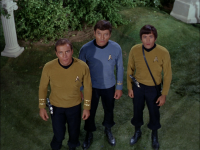
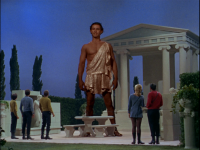
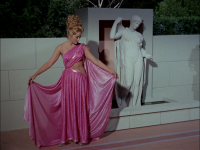
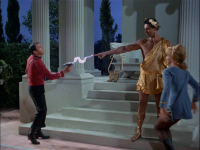
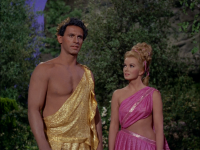
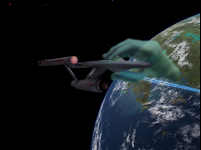
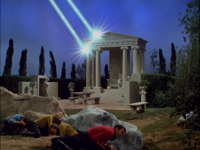
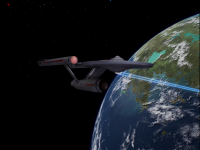
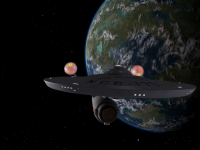
Star Trek TOS - 2x02 - Who Mourns for Adonais?
Originally Aired: 1967-9-22
Synopsis:
The Enterprise is held captive by the Greek god Apollo. [Blu-ray] [DVD]
Filler Quotient:
3, bad filler, totally skippable.
- Pretty lame episode with no significant long term continuity.
Problems
None
Factoids
- A line from Spock indicates that Earth-like planets are excessively common in the galaxy, to the point of it not even being terribly noteworthy when a new one is discovered.
- This episode establishes that Chekov is 22 years old.
Remarkable Scenes
- Kirk and McCoy making fun of Scotty being for smitten with the historian officer.
- Scotty fighting for his girl in vain.
- Kirk making fun of Chekov's age and supposed vulnerability to young, pretty girls.
- The Enterprise phasering Apollo out of existence.
My Review
While the idea that the gods of ancient civilizations were in fact advanced space aliens taking advantage of primitive humanity is an intriguing premise for a science fiction story, the way this episode tells such a story leaves much to be desired. Aside from the fact that Star Trek has already featured far too many god-like aliens, nearly every aesthetic choice made in this episode is overwrought and embarrassing to watch, especially the giant hand forcefield which fondles the Enterprise all episode. More than that we've got yet another story where the Enterprise is held hostage by the guest antagonist of the week with an irrational motive, yet another female officer who falls for the arrogant bad guy of the week, and yet another plot resolved by blowing up a concealed power source fueling a bag of magic tricks.
Then there's the logical problem about why Apollo and his comrades ever left Earth to begin with. Apollo mentions that the Greeks simply stopped worshipping him and his comrades. Okay, and how did they get away with that exactly? Kirk's crew was only narrowly able to avoid enslavement by Apollo by firing phasers at his power source. I'm not an expert on history, but I'm pretty sure the ancient Greeks didn't have phasers with which to overthrow their gods. If Apollo and his comrades wanted them to keep worshipping, they certainly could have forced the Greeks to continue doing so.
There is a powerful theme in this story though which is nicely summed up by a line from Kirk which opens with "mankind has no need for gods." This is an excellent illustration of the episode's theme, as the whole point of the story is to demonstrate how the whole concept of a god is little more than a human psychological construction to explain observations (or imaginings) which appear supernatural. Kirk even says that mankind has outgrown gods in a manner easily likened to how children outgrow their infantile toys. But Kirk undermines that entire point and in doing so the entire theme of the episode in his very next sentence by stating "we find the one quite adequate." In that single sentence, Kirk's credibility suddenly vanishes. How could mankind have outgrown gods if it still needs to believe in one? All in all, I'll sum up this episode by saying what a great idea for a story wasted on such bad storytelling.
The following are comments submitted by my readers.
- From Jem Hadar on 2009-04-06 at 10:45pm:
Hey, long time reader, first time poster.
Problem
- How would Spock know that the God's name was Apollo when he was talking to Kyle about his location- it was never mentioned until the landing party beamed to the surface, which he wasn't a part of!
Also, I really enjoy this episode. I give it a 7.5/10 - From Flex on 2009-05-22 at 8:52pm:
Hey, great site - while I often rate these TOS episodes more highly than you do these are all great reviews and entries, very thorough?
I just wanted to say I rate this episode rather highly (a 6, maybe). It's nothing stunningly original, but I find the story rather poignant and sad. - From Orion Pimpdaddy on 2010-04-04 at 4:39pm:
My nitpicks, once again:
-Somebody has mentioned this, but Spock mentions Apollo's before he should have been aware of it.
-This episode reeks of sexism. At the beginning, you here McCoy talking about the woman on the bridge. He mentions that if she meets a man, she'll withdraw from Starfleet and settle down. Also, when that same woman is down on the planet, she acts mindless, and falls in love wih Apollo very easily. - From Krs321 on 2011-11-01 at 8:01pm:
I like the new 'filler quotient' ratings; solid addition and I hope you put them on the other series at some point.
However, I have to disagree on this episode. Kirk crushing this guy's spirit is awesome and I genuinely feel bad for Apollo.
I'm not sure the filler quotient should depend so heavily on canon significance as much as how sucky the episode is (Alternative Factor, barf). - From Strider on 2012-07-30 at 4:58am:
Even though we have another female officer who falls in love with the bad guy of the week, at least this female officer knows her duty and doesn't put her romance ahead of her captain, crew, and ship. It's an improvement from other episodes, at least. - From Deggsy on 2013-04-11 at 8:49pm:
Am I wrong in thinking that the networks used makeup or whatever to hide Apollo's exposed nipple? - From Alan Feldman on 2015-08-16 at 1:44am:
"WHO MOURNS FOR ADONAIS?"
I don't think the story is as bad as you make it out to be. Parts are good; parts are bad. I'd certainly give it a higher rating than a 1.
Yeah, the giant hand looks ridiculous, esp. in the remastered version, in which, when it first approaches the Enterprise, looks a little like a twisted-balloon sculpture, or an inflated latex glove. But how else is Apollo going to hold, squeeze, and crush the ship? You kind of have to go with it. I suppose he could just zap it, but it wouldn't have the right imagery. You couldn't have, "And I'll crush it's empty hull." It's worth going with it just for that line. What else could you do? A tractor beam? Doesn't quite fit in with the Greek-god bit. But the hand looks a little better toward the end. Maybe it should have been at the end of a really long arm!
About Spock knowing Apollo's name too early in the story: This type of thing happens elsewhere in the series.
Chekov is clearly wearing a wig.
Re your question about the Greeks stopping worshiping the gods, Apollo addresses this: "We could have struck out from Olympus and destroyed. We have no wish to destroy, so we came home again." What you think of that is another matter.
You wrote, ". . . we've got yet another story where the Enterprise is held hostage by the guest antagonist of the week with an irrational motive, yet another female officer who falls for the arrogant bad guy of the week, and yet another plot resolved by blowing up a concealed power source fueling a bag of magic tricks."
There was only one previous episode where a female officer falls for the bad guy of the week: Space Seed. So that's only two episodes from the first 31. But yes, there were three previous episodes with machines blown up and seven with the Enterprise held hostage.
But you can look at it as what the show is. "What? Another symphony with four movements and in standard form?" "Ralph Kramden did something stupid again?" Trying to be positive here. :-)
Carolyn's dress is pretty good.
I love the special effects when Scotty is propelled across the marble floor by Apollo's lightning bolt. Intense, and well done! (From the remastered version. I don't presently have access to the original and can't recall how well it was done in that. But I do remember being impressed.) OTOH, Apollo should have recoiled at least a little.
How can Apollo be so clueless about humans in the 22nd century? He wants something he can't have from our heroes: genuine worship. You can't force that. He has god-like powers, but this simple fact somehow eludes him. But gods need worship, etc., he says. Still, wouldn't that get pretty boring for after a while, even for Apollo or the other Greek gods? (The 22nd century? Yes, I know. But Star Trek TOS being in the 23rd century is based on an incorrect argument about "Miri." It should be recognized as the 22nd, which it clearly was in "Space Seed" and "Tomorrow is Yesterday." And do you really want to base the TOS period on "Miri" at all?
Scotty was pretty clueless, too. It took two lightning bolts (the second being pretty severe!) and a smack in the face that sent him tumbling over the picnic bench from Apollo to teach him. First time we have Scotty fawning over a woman and showing signs of bad form (getting a bit hysterical in this episode). And as we know, it's going to get much worse!
You ask, "How could mankind have outgrown gods if it still needs to believe in one?" Most have outgrown multiple gods, the kind of gods the ancients worshiped. That's progress. Some have speculated, with good reason, that many are just hard-wired to believe in a personal god. They can't help it. Neil deGrass Tyson gave an excellent talk on this subject, mostly with regard to scientists of various fields. It's on YouTube somewhere.
Man, who would want to live in Apollo's dream world? Sounds pretty boring to me. Well, at least there'd be no war or disease.
When Uhura works on fixing the bypass circuits, the thing she's using makes big sparks and such. Now generally, why does stuff like this on Star Trek always involve bright flashing light? Why is fixing things in TOS always like welding? And dig the 1960's circuit boards in that scene!
Carolyn is a little too taken to Apollo until the end after Kirk talks her out of it.
The scene where Carolyn spurns Apollo is weird. Also: "Carolyn, I forbid you to go. I order you to stay." "Is that the secret of your power over women? The thunderbolts you throw?" The dude just can't take no for an answer.
The scene where the Enterprise destroys the temple is pretty cool. "Stop! . . . Stop, I say! . . ." And the power of the Enterprise vs. the power of Apollo. Intense.
Boy, Michael Forest's neck looks really long after the temple is destroyed, no?
- From Chris Long on 2018-05-27 at 10:55pm:
A stupid episode in general but poignant at the end, I found...
Spock says, "No life forms" when there is vegetation all over the place! Something has to be propagating those plants and trees!
Chekov's wig was to make him look like Davey Jones of the Monkees, I believe. It looked ridiculous though!
- From Mike Chambers on 2020-10-09 at 5:48am:
I was surprised to find this episode so poorly rated. Both your rating and the average fan rating.
It's certainly no 10. The largest problem is the standard TOS cheese factor, which brings down what was an episode with an intriguing premise quite a bit, due to the excessively corny dialog and bad acting of Apollo and Lieutenant Palamas.
Still, it's a fun episode and one that stands out in my memory. It's a solid 6/10 for me as far as TOS goes. At worst.
It would be a 2 if it were a TNG episode, but it's not. The bar was low in 1967, and I can enjoy these episodes quite a bit if I keep that in mind and not expect TNG quality material.
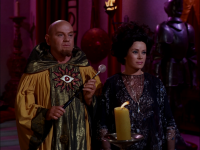
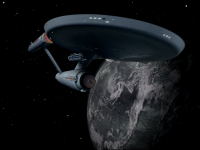
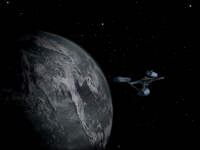
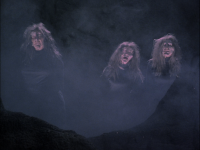
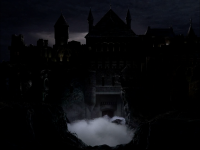

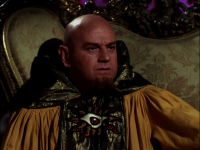
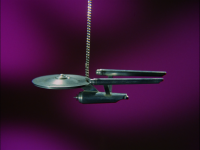
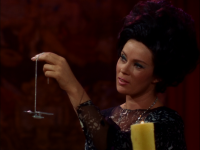
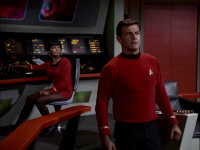
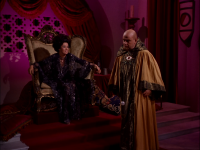
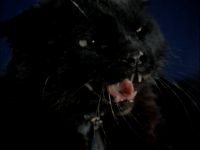
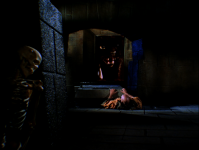
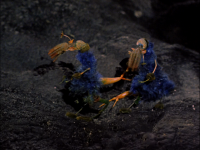
Star Trek TOS - 2x07 - Catspaw
Originally Aired: 1967-10-27
Synopsis:
Aliens on a mission of conquest hold the crew captive. [Blu-ray] [DVD]
Filler Quotient:
3, bad filler, totally skippable.
- Pretty lame episode with no significant long term continuity.
Problems
- The cat's meowing and shrieking was dubbed in such a way that it doesn't match the cat's mouth movements.
- The aliens in their real form were puppets and the strings were at times very easy to see.
- Spock said that mapping expeditions have charted the "solar system" featured in this episode before. This is a common error. The term they were looking for is planetary system. The planetary system we live in is called the Solar System because our star is named Sol. As such, the term "Solar System" is a proper noun, not a generic term.
Factoids
- This episode establishes that DeSalle is the ship's fourth officer and will take command when Kirk, Spock, Scotty, and Sulu are all off the ship.
- This episode establishes that the Enterprise is capable of manufacturing precious gems.
Remarkable Scenes
- Kirk regarding the witches: "Spock, comment?" Spock: "Very bad poetry, captain."
- Kirk seducing Sylvia.
- Kirk, Spock, and Korob being chased by the giant cat.
- Kirk destroying the alien illusion device.
My Review
The Squire of Gothos + Return of the Archons = Catspaw. Like The Squire of Gothos this story features yet another super alien that captures the crew and demands something silly along with yet another alien technology plot device (the transmuter) that once trivially destroyed solves all the crew's problems. And like Return of the Archons the aliens yet again achieve their goals by transforming various members of the crew into zombies and trapping the crew inside of an ancient Earth stereotype. To be frank, Star Trek didn't need a Halloween special, much less a poorly executed one.
The following are comments submitted by my readers.
- From kaser on 2010-05-13 at 9:58pm:
This episode is sub-par to say the least. The language is stilted, the jokes lame. The fight scenes are badly directed. The cheap costumes and mis-en-scene furnishings seem to bear the dust of the studio B closet. The story is jumbled and poorly told. A felinephobiac might get a brief thrill from the screeching catwoman but there is otherwise little dramatic effect to this careless production. The deflating of the shabby bird-like marionettes are a fitting ending to this mess. How did Shatner keep from giggling through his final speech? - From Old Fat Trekkie on 2011-12-10 at 2:35am:
Oh just had to mention it. This was the first episode shot in the second season. Assignment Earth was the last. Did any one else notice that in both of these episodes a cat turns into a chick?

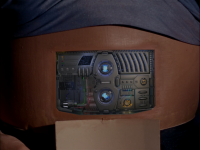
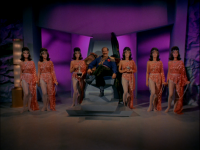
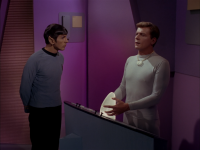
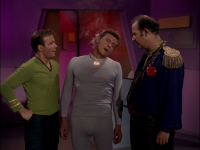
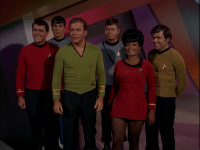
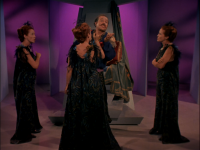
Star Trek TOS - 2x08 - I, Mudd
Originally Aired: 1967-11-3
Synopsis:
A takeover leads Kirk to his old nemesis, Harry Mudd. [Blu-ray] [DVD]
Filler Quotient:
3, bad filler, totally skippable.
- Technically Mudd will recur, but all episodes which feature him suck, so they can all be considered bad filler. On top of that there's a scene early in the episode in which Mudd's backstory has to be explained to Chekov, so it isn't necessary to watch Mudd's first episode to understand what's going on in this one.
Problems
- Harry Mudd had the entire crew of the Enterprise beamed down to the planet. How exactly did they get back up to the ship with no one up there to operate the transporter?
Factoids
- This episode establishes that the Federation has a patent system.
- Chekov makes a reference to Leningrad in this episode, but in 1991, many years after the episode aired, the name of the city was restored to St. Petersburg. Since Star Trek takes place in an alternative timeline which diverges presumably before the 1990s, it's conceivable that the city was never renamed back to St. Petersburg in Star Trek's timeline.
Remarkable Scenes
- Mudd revealed to be behind the androids' treachery.
- Mudd: "Knowledge, sir, should be free to all."
- Androids: "Why should we leave you?" Kirk: "Because we don't like you!"
- The various crewmembers being enticed into staying.
- The crew acting ridiculous to confuse the androids.
My Review
Once again we have androids trying to acquire power and once again Kirk talks a computer to death to resolve the plot. The badly acted androids offered little in the way of intrigue and the recurrence of the Harry Mudd character is most certainly not an asset to the story either. The ending was perhaps the most irresponsible one so far given that Kirk marooned Harry Mudd, a citizen of the Federation on an alien planet. This exposes Mudd to possible unknown dangers in the future, it prevents him from standing trial for his crimes, and also possibly even arms Mudd with an escape route if he can find a way to some day manipulate the androids. Moreover once again Kirk makes no effort to study or harness the android technology, preferring instead to act as though both the androids and Harry Mudd never existed. Then again given how terrible a story this was I think I could live with pretending these androids and Harry Mudd never existed too.
The following are comments submitted by my readers.
- From Simon on 2012-06-21 at 9:28am:
You missed a factoid: type K planets only support life on the surface in pressurized domes with life support systems - or words to that effect. - From Peter Collins on 2015-03-13 at 11:35am:
I think you're a bit harsh on this episode in that it's just a bit of fun, as TOS was prone to. Something that marks it as 'of its time' is the horribly sexist portrayal of Mudd's nagging wife. - From jd_juggler on 2015-03-23 at 12:56pm:
I disagree that this is a "skippable" episode. Roger C. Carmel was a funny guy, and his character actually had a personality, which is not necessarily a given among TOS villains. As for the problem of getting back on board the enterprise, remember that after Norman et al. were defeated, the androids were reprogrammed, and presumably that included the androids that were aboard the enterprise.
Here are a couple of problems, though. McCoy and Scotty were both amazed and delighted at the level of medical and engineering technology (respectively), but there was no mention that they took any of the technology with them. Uhura pretended to be sold on the idea of an android body, but wouldn't it have been a good idea to have one created and standing by (not yet activated) and ready to be "moved into" when your natural life is nearly over? This is assuming, of course, that androids aren't going to turn out like Roger Korby, but since they were made with a different (and presumably superior) technology, that shouldn't have been a deal breaker.
It also amuses me that these androids apparently can serve as sexual surrogates, no doubt with great skill. Having a few of those around would be handy. - From Chris Long on 2018-05-29 at 5:20pm:
This episode could have been a lot better than it was.
I did not find it funny in the least, even as a child when it first aired...
Looking at it recently, couldn't they have found better looking women androids than the ones they Harry with? Yeesh!
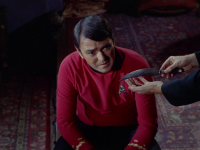
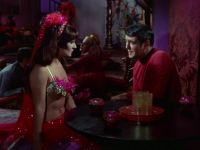
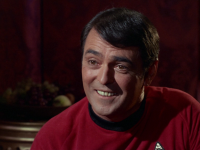
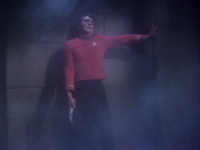
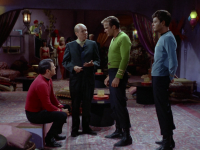
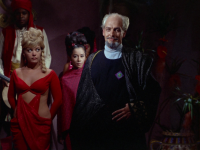
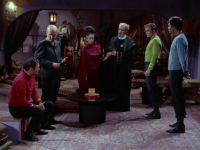
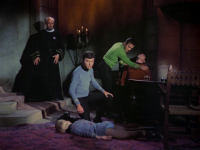
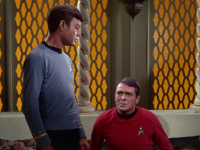
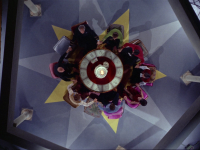
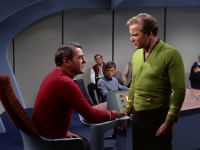
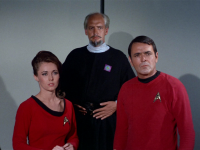
Star Trek TOS - 2x14 - Wolf in the Fold
Originally Aired: 1967-12-22
Synopsis:
Scotty is implicated in a Jack the Ripper-style murder. [Blu-ray] [DVD]
Filler Quotient:
3, bad filler, totally skippable.
- Pretty lame episode with no significant long term continuity.
Problems
None
Factoids
- John Fiedler, the man possessed by Jack the Ripper in this episode, also played the voice of Piglet in Winnie the Pooh.
- It is stated that in the Star Trek universe, there was a colony on Mars by 2105.
Remarkable Scenes
- Scotty's serious satisfaction with his salacious shore leave.
- McCoy: "S/he's dead, Jim." Counts 4, 5, and 6 all in this episode!
- Spock: "Humans and humanoids make up only a small percentage of the life forms we know of."
- Spock: "In the strict scientific sense, doctor, we all feed on death. Even vegetarians."
- Sulu all drugged up.
- Spock ordering the computer to compute pi to the last digit in order to clog up its processing and memory capacity.
- The entire crew drugged at the end.
My Review
What started off as a fairly entertaining story about a murder investigation in the tradition of The Conscience of the King focused nicely on the underutilized character of Scotty turned out instead to be a flop induced by yet another non-corporeal entity, poor pacing, some awkward aesthetic choices, and some wonky writing. At the start of the story, the idea that Scotty while recovering from an injury could be committing murders he couldn't recall due to his injury was an intriguing idea. I question the medical ethics of allowing a concussion victim to galavant around in a strip club, but McCoy's always played it somewhat fast and loose. ;)
But it doesn't take long for the annoying details to kick in. What the hell is a psycho-tricorder and by what fantasy mechanism is it capable of determining without a doubt whether or not Scotty murdered anyone? Why was Scotty not confined until the murder investigation was concluded? Exactly how was Sybo supposed to receive "impressions" from inanimate objects? And then there's of course the annoying recurring issue of the aliens of this planet being yet another alien race which looks identical to humans without explanation.
The most annoying detail though is the Jack the Ripper connection. I suppose there's nothing fundamentally problematic with the idea that Jack the Ripper was in fact an alien entity which feeds off death, but aside from the fact that that idea is pretty silly to begin with, the plot logic didn't take the logical consequences of that premise very seriously. For starters, the way they used the computer to jump to this conclusion so quickly based on the lookup of a single name was silly, as was the ridiculous over-reliance on the computer in general. At one point they ask the computer to validate the hypothetical conclusions of five minutes worth of conversation, as if the computer is some kind of all-knowing godlike arbiter of truth.
They then spend another several minutes after this continuing to uselessly speculate on that very hypothesis in a painfully verbose fashion. All the while the entity sits and listens to all this while inhabiting Mr. Hengist. Why the entity waited so long to go hide in someone else's body is beyond me; it must not have been very smart. Were I an entity of such power, I wouldn't have inhabited the body of someone charged with performing the murder investigation. Instead, I'd have picked the most irrelevant bystander I could find and disappeared into the crowd.
Finally the episode reaches its climax of absurdity when they beam the entity into space while it's still inhabiting Mr. Hengist, killing Mr. Hengist in the process! I suppose you could say the crew was desperate to survive, but they didn't even try to save that poor, unfortunate man, nor did the plot make any excuses for why the characters may have been unable to do so. Overall a terrible episode.
The following are comments submitted by my readers.
- From Orion Pimpdaddy on 2008-07-24 at 5:23pm:
The leader of the planet had his wife murdered right in front of him. Why does he not show any remorse? - From Orion Pimpdaddy on 2010-05-17 at 3:19am:
I found something odd. Remember when the administrator who was possessed by Jack the Ripper dies while trying to flee the room? Watch closely what McCoy and Scottie do with the body. They pick it up and place it in a chair at the table. Since when is this the procedure when someone dies aboard the ship. Why would they pick up a corpse and seat him at the table with everyone else?
Well, the obvious reason is that the director of the episode needed his body to remain in the room because it was going to be reanimated later on. I guess they didn't want to bother having him walk all the way back to the room from the sick bay morgue, where he should have been. - From rpeh on 2010-07-13 at 12:54pm:
The episode starts well and is interesting and suspenseful... right up until the Jack the Ripper connection is made. It turns what could have been a decent story into a stupid one. - From Wiley Hyena on 2012-05-14 at 6:12pm:
Reviewer missed the mark here. The suspence of the revelation of Hengist was very good. Some continuity problems, but those are standard fare in TOS and usually forgivable. Give this episode a 6. Entertaining. - From Harrison on 2012-09-04 at 8:53am:
A turkey to be sure, but a titillating one, and darn funny in spots. John Fielder is incredibly funny and the tranquilized immortal serial killer, chanting "with a groggy smile "Die! Die! Everyone is going to Die!" - From Troy on 2013-01-14 at 5:15am:
Although I was worried about the killing of Mr. Hengist at the end there, I believe it was justified by the fact they declared him dead earlier in the episode. To me this implied the entity already killed this man and was basically using his lifeless body as a vessel, hence why the crew had no qualms with beaming him into space. - From Tooms on 2013-10-12 at 9:52am:
I agree with Troy that it was already explained why Hengist couldn't be saved. When McCoy said Hengist was dead earlier in the episode, they were shocked because although Kirk had kicked him, it wasn't anything that should kill a man. I took that to mean Hengist was long dead and reanimated by the entity, so there was no way to save him. - From Chris Long on 2017-11-10 at 7:33pm:
Aside from all the other problems described the main reviewer and commenters... Why didn't Kirk just have Spock beam down and mind meld with Scotty to at least get an idea of what may have happened to him?
Also, the funniest line in all of TOS,
McCoy describing a possessed person on his tranquilizer: "Well, it might take up knitting, nothing more violent than that."
- From Azalea Jane on 2023-08-26 at 10:21am:
Boy, that computer voice is awkward!
I'm finally bingeing my first full watch of TOS. I've definitely seen a few episodes, but not many until now. It's ... an interesting experience. Obviously the effects and sets are dated, but I can appreciate that it looked cooler at the time. The misogyny is frustrating, often to the point of being funny. Like viewing it in a museum. Overall I'm enjoying the show. I never get tired of Spock. Watching TOS is especially interesting at the moment, having just finished the second season of Strange New Worlds, which, for the uninitiated, is set on the same ship but several years earlier under Pike, giving us a lot of backstory on several TOS characters. I quite like it. The contrast between the shows is, to borrow a term: fascinating. And this is where it all started! It really says something about a show when it can spawn a fandom as huge and passionate as this one.
Anyway, I watched movies 1-6 as a kid, but very little TOS for a long time. TNG was my Trek. I grew up hearing Majel Barrett's voice aboard the 1701-D, speaking like an actual person, and I'm quite amused at the same voice doing this 60s rendition of what a future computer might sound like. Stilted monotone with reverb! That's not going to get irritating to listen to for extended periods of time *at all!* The 60s were trippy, man.
This plot needed a lot of massaging. The premise was good, it had a lot of good moments, but it started unraveling pretty quick. My eyes rolled into the next room at the whole "women are easier to scare" thing, and the whole conversation about Scotty having issues with women was weird and random and didn't pay off at all. (Also: he does? Since when?)
It's Piglet's voice! I didn't make that connection right away, but I did notice what a distinctive voice that actor had.
RIP that specialist who beamed down. I think we all knew where that was headed. (I did because I accidentally read ahead on the Memory Alpha article.) She should have been wearing red. Yay for gender diversity among redshirts, I guess? LOL.
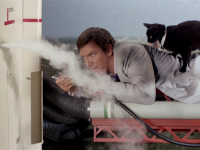
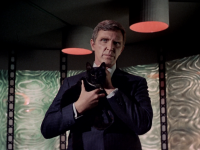
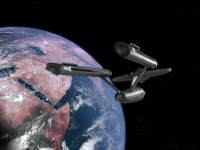
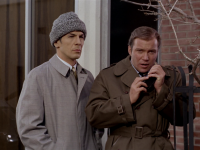
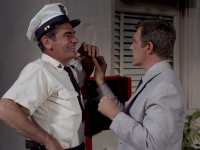
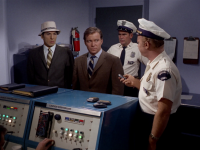
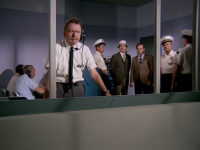
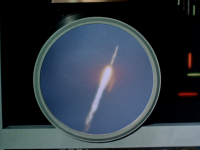
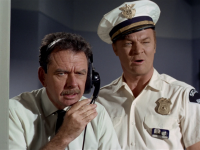
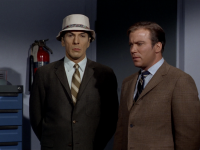
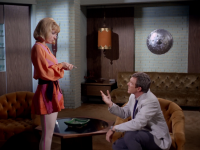
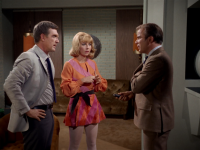

Star Trek TOS - 2x26 - Assignment: Earth
Originally Aired: 1968-3-29
Synopsis:
The Enterprise goes back in time and discovers a mysterious stranger trying to interfere with 20th-century events. [Blu-ray] [DVD]
Filler Quotient:
3, bad filler, totally skippable.
- Pretty lame episode with no significant long term continuity.
Problems
- Scotty mentions that he was able to use a 1960s-era weather satellite to get those ariel views of the rocket. However, the footage is quite obviously helicopter footage. The camera even wobbles.
Factoids
- This episode was intended as the pilot for a Star Trek spin-off series named "Assignment: Earth," but it never got off the ground.
- This episode establishes that Star Trek's history splits off from the real world's history in at least the year 1968, as major historical events which never occurred in the real world such as the launch of orbital nuclear weapons platforms were cited as having occurred in Star Trek's timeline during that year. Interestingly, one of the important events cited was an important assassination. Coincidentally, six days after this episode aired, Martin Luther King, Jr. was assassinated. Robert F. Kennedy was also assassinated not long after this episode first aired. It has been said that this episode accidentally predicted these events.
- This episode establishes that the planet Omicron 4 was almost destroyed by a conflict similar to Earth's Cold War.
Remarkable Scenes
- Gary Seven's declaration of his mission.
- Gary Seven's escape from the Enterprise.
- Roberta's reaction to the automatic typewriter which typed everything she said.
- Kirk barging into Gary Seven's office.
- Gary Seven getting past the security guard and breaking into the launch site.
My Review
Unlike the similarly punctuated season 1 finale entitled Operation: Annihilate!, the season 2 finale entitled Assignment: Earth sheds the exclamation point in an appropriately symbolic move. Because unlike its season 1 finale counterpart, this episode lacks any kind of excitement whatsoever and is in fact quite dull.
Even worse, this episode's premise even further aggravates the logical problems introduced by Spock's magical time travel formula, first featured in The Naked Time and further abused in Tomorrow is Yesterday. Unlike the previous episodes where Spock's magical time travel formula was used as an emergency tactic, albeit an overwrought one, this episode opens with the crew having casually engaged in time travel in a mission of historical research openly sanctioned by the Federation, as if traveling back in time has since become routine.
As if that weren't bad enough, pretty much the entire plot is a mixture of stiltedness and incoherence. The episode wastes no time making itself so awkwardly annoying, as the very first scene rattles off all that silly time travel exposition, then immediately proceeds to have Gary Seven simply appear in the transporter room. It's not explained how his long range transporter could make such a remarkable error as dropping him in the Enterprise's transporter room rather than his desired destination on Earth, but who needs coherent technical explanations? That's not what this episode is about.
No, what this episode was supposed to be about instead was the danger posed by time travel and interfering with historical events. But the story isn't very good at that part either, because Kirk pretty much does all the wrong things right from the beginning. Rather than merely assume that Gary's unlikely arrival on the Enterprise was the result of an unlikely accident, just as Gary claimed, Kirk assumes instead the even more unlikely idea that Gary could be an alien invader of Earth or some kind of hostile time traveler trying to screw up Earth's history.
Not a single thing warrants Kirk's rather remarkable paranoia, but Kirk acts on it anyway, profoundly interfering with Gary's historically undocumented, yet nevertheless historically canonical mission in the process, thereby directly violating the stated purpose of their mission into the past: to observe but not to interfere with history.
The episode tries to cover up this blatant mistake at the end with Spock rattling off some nonsense about how historical record implies that the Enterprise must have been predestined to interfere with these events, but the irony of that already bad rationalization is that had anyone on the Enterprise familiarized themselves with historical events in the first place, then they could have easily validated Gary Seven's place in history, despite its strangeness, and allowed him to complete his mission as planned.
Given all that, I think it's fair to say this episode is largely an exercise in incompetence for all parties involved. The Federation for authorizing this ill conceived mission in the first place, Kirk for choosing to consider Gary guilty until proven innocent, Kirk's crew for not fact checking Gary's story, and even Gary himself, who repeatedly showed his tendencies toward buffoonery throughout the episode, especially with regards to his mishandling of Roberta's less than elegant distractions.
The result is an incredibly boring episode filled with countless clips of stock Apollo footage dragging on at The Corbomite Maneuver's pace where none of the characters can quite figure out whose side they're on until it's nearly too late. All this peppered with endless humor scenes which nearly all fall flat, way too many monotone computer scenes, and a strikingly irrelevant female sidekick for Gary Seven who adds nothing to the plot and for some reason is disguised as a cat.
I've read that this episode was supposed to be a sort of backdoor pilot for a spinoff series entitled Assignment: Earth, which was to presumably feature Gary Seven, Roberta, the mysterious cat girl, and that terrifyingly obnoxious computer engaging in a litany of similar adventures. I don't know about you, but based on the material seen here, I think the world can do without a crappy James Bond inspired Star Trek spinoff taking place in a contemporary science fiction setting.
The following are comments submitted by my readers.
- From Tony on 2008-09-07 at 1:56am:
A bad James Bond movie maybe, but when does James bond have to deal with a well intending starship crew that keeps messing up his plans? Although the episode does has it's fair share of faults involving the time travel aspect, it is generally fun to watch, with odd situations and a small element of mystery as to what Gary's intentions are. On the other hand the Enterprises presence was crucial to the story, a spin off series just wouldn't work (though I am curious as to how it would turn out). It's a fun episode, just don't take it too seriously or the fun is lost. - From Orion Pimpdaddy on 2010-08-27 at 2:46am:
I just watched the Blu-Ray upgrade of this episode, and I have to say it's the worst of the "upgrades" I have seen so far. The picture quality looks the same, like they didn't even bother to clean it up. I also thought they would ifnd better stock footage of the rocket, but I guess there's not that much to choose from.
The plot is decent. It has many whimsical moments thrown in even though it's about nuclear war. That's okay though. Overall, I'm never too thrilled when I have to watch this episode again (I watch them in order every few years), but afterward I always think, "that wasn't so bad." - From Strider on 2012-06-21 at 2:35pm:
I thought it was a boring episode, too--and what was the point of arming the rocket with a nuclear warhead just so he could disarm it 104 feet from the surface of the planet? Anyway, it was fun to see a young Terri Garr, and Robert Lansing reminded me a lot of Steve McQueen. - From Mosh on 2012-07-15 at 3:14am:
There were some weird similarities with Doctor Who in this episode. Gary Seven as a time traveler from another planet, with a very sonic screwdriver-type weapon and a human companion. The cat-lady would set it apart, though. Also, the quality. - From Alan Feldman on 2012-11-19 at 7:07am:
Assignment: Earth
I agree with Kethinov completely about how the time travel bit made no sense.
At the end when Kirk has to decide whether to let Mr. Seven use the computer, his reasoning makes no sense. He says to Mr. Seven, "I don't know what your job _is_. You may set those controls so we can't detonate that warhead." It's clear that Spock almost certainly can't detonate it anyway! The only logical course of action is to let Mr. Seven at the computer.
And why are Kirk and Spock suddenly in uniform after Gary saves the day?
Check out the cat girl's top. It's just kind of hanging from her neck. Well, take a careful look. You'll see what I mean.
To Strider: The point of setting the warhead was to scare the major powers to into stopping the orbiting nuclear warhead platform madness. Recall that those running the launch learned the rocket had somehow armed itself. That's the first scare. And you need the explosion to truly scare people. Yeah, it's too risky to be a good idea, but I didn't write the episode.
AEF - From Francis McMenamin on 2013-01-07 at 6:29pm:
I think most of the Assignment Earth detractors miss the point. The episode is about paranoia- the crew of the Enterprise go back in time on a research mission to find out why Earth was almost consumed in nuclear conflagration in 1968! The Federation must have had incomplete records and wanting to know more dispatched Kirk & co to clear up the mystery- a need to know more based on paranoia of a sort if you will- further fuelled by Kirk's seriousness about the mission and his discomfort with what the interloper GARY SEVEN was up to and the potential consequences for the timeline. Earth was at a delicate stage in its development and indeed if you follow the Star Trek timeline there was indeed a Third World War sometime in the 21st century according to Spock in another episode. Paranoia abounds in Assignment Earth with a lack of trust between the main protagonists; Kirk and Spock vis-a-vis SEVEN and Roberta Lincoln and SEVEN, Roberta and ISIS. It's a cold war space action adventure/espionage intrigue where conflicting agendas take centre stage. In my opinion it works on that level, is a rattling good adventure with plenty of twists and turns containing great classic Star Trek moments. The fact you are still arguing about it 45 odd years later speaks for itself! JJ Abrams take note! - From ALAN E FELDMAN on 2017-07-15 at 1:54am:
ASSIGNMENT: EARTH Post #2.
I think the best part of this episode is the Apollo 4 launch. That's a Saturn V. That gets you to the moon. You don't need such a big rocket to put something in earth orbit. Ridiculous. But we get some excellent clear shots of the launch! Can't find anything better on YouTube.
Again with a big age difference: Terri Garr was about 20 at the time, while Robert Lansing was about 40. Kind of a big spread for a couple. (Their becoming a couple was strongly hinted at at the end.)
The catgirl was wearing what appears to me to be a bib. And what was the point of that temporary transformation of the cat, anyway? Just some random eye candy and filler, I guess.
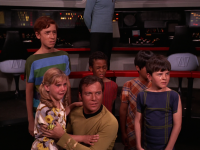
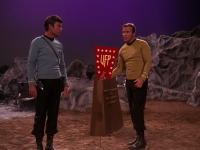
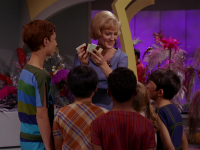
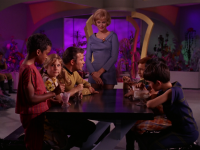
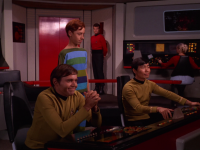
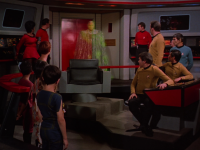
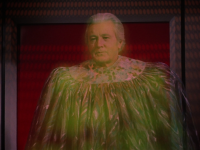
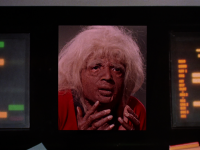
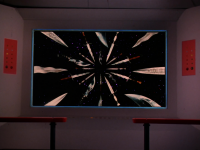
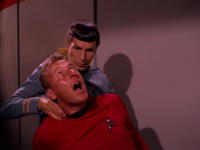
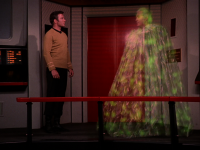
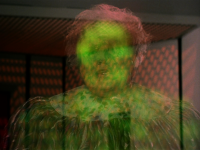
Star Trek TOS - 3x04 - And the Children Shall Lead
Originally Aired: 1968-10-11
Synopsis:
A group of children is being controlled by an evil force. [Blu-ray] [DVD]
Filler Quotient:
3, bad filler, totally skippable.
- Pretty lame episode with no significant long term continuity.
Problems
- Right after the scene when Kirk begins to feel he's losing his command abilities, Spock and Kirk get into a turbolift and it starts moving without either of them specifying a destination!
- At one point Kirk reasons to the children that the entity is afraid of being seen. This is after Kirk had already witnessed the entity being perfectly content with being summoned to the bridge in front of the entire crew.
Factoids
- This is the first episode in which we see a United Federation of Planets logo. Though there's no accounting for taste...
Remarkable Scenes
- Scotty going psycho on his mind controlled officers.
- Kirk accidentally beaming two men into space.
- Kirk's entire bridge crew freaking out.
- Kirk speaking gibberish to the redshirt.
My Review
This episode is essentially Miri without the absurd technical problems. That, however, does little to enhance a blatantly bad premise. The slow, plodding plot just makes most of the main characters look stupid, as it takes 39 minutes into the episode before it finally dawns on Kirk and Spock that the children must be having some kind of mind control effect on the crew and thus must be neutralized in order to regain control of the ship.
Ten minutes before that scene, I was already shouting "just phaser the damn kids already!" at the screen, as by that point the crew had more than enough evidence to draw that conclusion themselves, not the least of which was the scene when the children summoned the entity in front of the entire bridge crew, prompting him to rattle off his entire secret plan to all the main characters. That's the moment when I'd have phasered the kids right there.
But we didn't even get that moment, as all it took to neutralize the children was to show them a video of their bizarre behavior from the beginning of the episode so that they'd finally face the fact that their parents are dead, start crying, and deprive the entity of its power over them. McCoy had been clamoring for them all to do something like that since the beginning of the episode, and yet nobody ever bothered to try the video thing until Kirk got desperate. No wonder McCoy was insisting that they take the kids to a starbase for a proper psychological examination. Maybe they've got counselors over there worth a damn.
But thanks to the converging interests of both Kirk and the evil entity, neither of which wanted to go to the starbase for no coherent reason, they never did. Kirk should have authorized going to the starbase to gain access to the child specialists that were there. The entity should have authorized going to the starbase to attempt to fool the specialists and to gain false legitimacy so the children could less conspicuously request transport to a Federation colony. A better story would have shown us these competing tactics, but alas, that would have required more sets, more characters, and more entertainment value. We can't have that.
The following are comments submitted by my readers.
- From Orion on 2011-03-06 at 7:21pm:
This episode has no entertainment value, expect for a few unintentional laughs. You have child actors who come across as brats. Yeah, I know, they were being controled by an outside force, but man, these kids are annoying. Later on, in a forced scene the kids become sad, which is unintentionally hilarious due to all the fake crying.
After two crewmembers die, there'e really no sign of remorse. Also, nodody helped Uhura when she "saw her own death." She spent the whole episode staring into the mirror and crying.
Of course, the most chessy thing about the episode is the mind control via fist pumping.
On a quick note, the Blu-Ray upgrade didn't change too much. The knives floating through space still look the same, even though the disc seems to indicate otherwise (it prompts you to change toggle between old and new effects, but the knives look the same either way) - From Bobby on 2011-08-21 at 6:45pm:
That bit where Mr. Spock says, "we may have to kill the children" ...
Nonsense! Just cut their arms off where they can't make that motion with their fists. :) That'll fix it.
- From Abigail on 2012-05-31 at 11:27pm:
At the end of this episode, I had reached a few conclusions:
- Children are obviously much easier to manipulate than I'd ever realized. Now I'm unsure why teachers struggle so much with classroom management. Clearly it takes very little to convince them of something, and then of the exact opposte.
- Children from the future are always incredibly annoying. A great many Star Trek episodes have shown me that.
- I need to know where the girl with the blonde pigtails got her jumpsuit. I think it would look remarkably good on me. - From Strider on 2012-06-25 at 2:43pm:
Every bit as bad as I'd read it would be. There was one nice moment in the turbolift when Jim was having his "I've lost command" breakdown, and for some reason begins to strangle Spock, and Spock just says, "Jim." Jim gets himself together and breaks the spell. I live for those moments of connection between characters.
But right before that...what was Spock seeing/experiencing that made him defy Kirk's orders? All he said was "I don't think we need to trouble Starfleet" or something. If Spock's fears came alive on the bridge, I would expect to see either Jim dying or Spock's emotions burst out of control.
And why does the Communications Officer have a mirror at her console as big as any one of her computer screens? Seems unprofessional at best.
Anyway, I spent a good 2/3 of the episode thinking "Stun them with your phaser! Use the Vulcan nerve pinch! Sedate them, for God's sake!" I may have yelled it to the screen a time or two, actually. - From Glenn239 on 2012-09-26 at 2:04pm:
A ‘2’. A bad episode of Star Trek is like a plane crash; a series of unrelated errors cascading into catastrophic failure. No doubt with a longer production schedule and better judgment this episode could have been much better. Perhaps Freiberger was more inclined to step on mines that Roddenberry may have avoided.
In ‘The Thing’ a group of scientists isolated in the Antarctic stumble across a wrecked camp where, judging from the bodies, things had obviously ended quite badly. Then have to deal with a malevolent alien presence which infects their camp by way of the sole survivor, a dog. Part of the awesomeness to the story is that the dead guys from the first camp leaving a handy video log that is just incomplete enough to perfectly develop the plot.
And the Children Shall Lead is also that story. But The Thing was magnificent while it sucked. Mistake 1 was the kids; using child actors is always a risk since most of them can’t act. Find one kid that can act, you are lucky. Find four or five? The odds of that must be astronomical, like flipping a deck of playing cards in the air and having them land all stacked in perfect sequence. Mistake 2 was the villian; he looked stupid, he dressed stupid, he had stupid motives, and he died stupidly. (Actually, with the poofy hair and cheezy plastic see-through poncho he comes across like he was always being summoned from the ghost beauty salon) He wants to conquer the galaxy? So now it’s cross-dressing ghost Hitler? Um, ok. Mistake 3 was the baffoonish interplay between the kids and the crew of the ship. I don’t care if Sulu is afraid of swords and I don’t care that he’s too stupid to figure out it must be an illusion. Next stop, catastrophic failure.
If Star Trek ever got an ‘episode mulligan’, this might be the one. Ditch the kids but keep the premise. I think it’s Kirk who said, ‘We may have to kill the children’. Now there’s an interesting idea. Back in the 1960’s there was an awesome short story called ‘The Counterfeit Man’. In it, the ship’s doctor decided he had to murder a crew member he suspected was an alien. He had no evidence and nobody else believed him, but ‘spaced’ him anyway, (blew him out an airlock in a great sequence where the alien, still looking like a dude, pleaded with him not to). What an awesome premise – what if Kirk or McCoy concluded they had to kill a survivor who looked human based on the hunch that they were actually an alien?
- From Alan Feldman on 2012-10-19 at 1:55am:
"And the Children Shall Lead"
How did Kirk know Gorgan's name? It's not mentioned at all before Kirk asked Spock to play back the tape.
Kethinov: You ask for more sets, more characters, more entertainment value. You forgot "more money". According to what those involved said, they had a very low budget for the third season. They spoke of doing "ship shows", shooting most of an episode on the ship to save money. Speaking of money, it seems like they spent a lot more money on the pilots than on any of the regular episodes! Maybe it's because you only do a pilot once -- okay, in this case, twice!
AEF - From Colin Pearce on 2013-03-20 at 4:04pm:
Although I agree that this episode is far from the best (in fact, it’s in my 3 worst episodes list), a common criticism / misconception is that Uhura has a mirror on her console.
He reflection, both young and old, is intended to be displayed on her console screen, not a mirror. The mirror was obviously used by the production crew to save time and money rather than superimposing her young image onto her console screen, as her older image actually was. When Kirk goes to comfort her, there is clearly no mirror on her console, only readouts. Only she can see the image, just like only Sulu can see the swords on the viewscreen.
The use of the mirror was sloppily done, but the intention of the production crew was that she was looking at her console. The remastering team should definitely have fixed this flaw, but once again they miss another instance requiring an easy fix.
- From Alan Feldman on 2013-04-03 at 2:15am:
More on "And the Children Shall Lead"
Re the "mirror": Yes, the first shot clearly shows a real mirror. But it's a very short shot -- only a second or two. Plus I think it's safe to say it was assumed that people were watching it on not very large, standard def televisions from at least several feet away. So they probably thought they could get away with such a short shot. And they probably did. Watching it in my youth, I didn't notice anything funny. I think I was fixated on the image and the story and so didn't notice the mirror vs. display aspect of it. It just seemed like a mirror to me with her mirror image aged by "the beast within her".
Interestingly, in that shot, we see Uhura centered, which means she probably couldn't see herself! (Notice also that the mirror doesn't quite line up with the console display behind it.)
I think there's another reason they used an actual mirror for the first shot. Notice that it's used only for _young_ Uhura. By using an actual mirror it is quickly established that she's seeing a reflection of herself. It also produces an extremely accurate (!) reflection (except for the angle bit). Then the second shot shows old Uhura on the console display, and we have already assumed there's a mirror, or something functioning as a mirror, there somehow. I'm guessing this is to make up in part for the motions of real and imagined Uhura not matching up quite right. And perhaps also to make it clear she's looking at herself, as old Uhura looks so different!
Keep in mind that they had a very small budget for the third season, or so they've claimed.
This episode still has its fun moments.
So what's with the food cards? How is it that with only a handful of 3-inch wooden squares you can have almost any variety of food you want? This has always struck me as rather odd, to say the least. In this episode, the last kid asks for chocolate marble and pistachio. Nurse Chapel picks a card and is about to put it in the slot when the kid interjects, "And peach". Well, she has a card for that, too -- but out of only two cards, no less!
This happens in other episodes. For example, there's the scene in "Tomorrow is Yesterday" where Kyle asks the sergeant what he'd like to eat. The sergeant says "chicken soup". Then Kyle, who is holding only four wooden cards, just happens to have one for chicken soup. Am I missing something here?
AEF, aka betaneptune
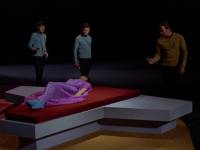
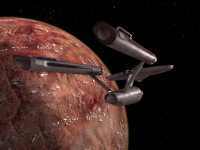
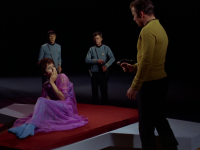
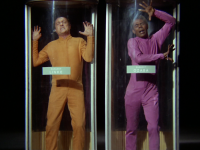
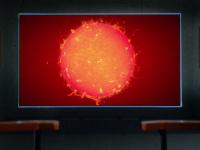
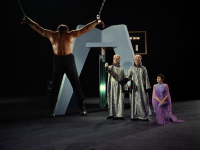
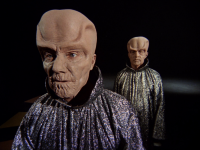
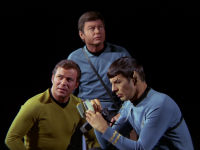
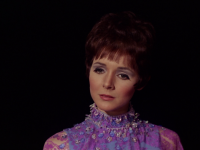
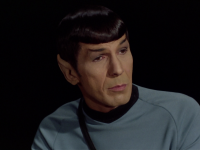
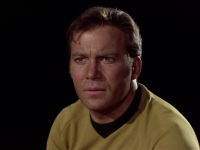
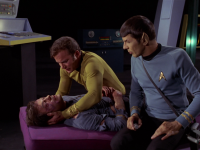
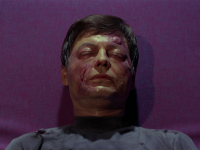

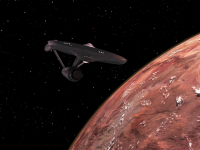
Star Trek TOS - 3x12 - The Empath
Originally Aired: 1968-12-6
Synopsis:
The landing party is used to test an empathic race. [Blu-ray] [DVD]
Filler Quotient:
3, bad filler, totally skippable.
- Pretty lame episode with no significant long term continuity.
Problems
- Scotty says they found a "solar flare" coming from the star. This is a common error. The term "solar" should only be used when in reference to our star, which is called Sol. A flare from another star is more properly referred to as a "stellar flare." Likewise, the reference to "74.1 solar hours for the storm to pass" is also incorrect, as the term "solar hour" makes no sense in reference to any context.
Factoids
None
Remarkable Scenes
- Spock neck pinching the alien while Kirk tells it about how their star is about to go nova.
- McCoy: "I'm a doctor, not a coal miner!" (Count #8 for "I'm a doctor, not a [blah]" style lines McCoy is famous for.)
- Spock to McCoy after being injected: "Your action is highly unethical. My decision stands!" Spock passes out. McCoy: "Not this time, Spock."
- McCoy attempting to sacrifice himself to save Spock and Kirk.
- Kirk: "The best defense is a good offense and I intend to start offending right now."
- Spock to Kirk: "He's dying, Jim." So close, but so far from a "he's dead, Jim."
- Gem sacrificing herself to save McCoy.
- Kirk and Spock escaping the forcefield by suppressing emotion.
- McCoy, regarding the Vians: "Well, personally, I find it fascinating that with all their scientific knowledge and advances, that it was good old-fashioned human emotion that they valued the most." Scotty: "Perhaps the Vulcans should hear about this." Kirk: "Mister Spock, can you be prevailed upon to bring them the news?" Spock: "Possibly, Captain. I shall certainly give the thought all the consideration it is due."
My Review
This episode is sort of like an inferior version of The Cage. Two large-headed, intellectual super aliens with the power of illusions entrap the cast for their own seemingly selfish motives which turn out to be rather benevolent in the end, or at least somewhat well intended. While this episode has some strikingly original austere aesthetics from a directoral perspective, unfortunately this version of The Cage's themes doesn't work quite so well from a storytelling perspective.
For starters, the Vians' methods were not terribly scientific and their cruelty remained poorly substantiated even by the end of the story, not the least of which was because there at no point ever appeared to be any consequences for the Vians killing two Starfleet officers. The Vians simply wrote it off as "their own imperfections killed them. They were not fit subjects." And "we did not kill them. Their own fears killed them." Kirk never appeared to follow up on these ridiculous explanations and the Vians never appeared to answer for their crimes.
While it's certainly true that they're from an alien culture guided by an alien philosophy, not much of the story's time is spent on developing their philosophy. We know that they had the power to save the population of one of two planets in this planetary system and were trying to decide which of the two were worthy of survival, but unfortunately that's a rather bold claim for the episode to ask us to simply accept at face value, as it seems rather contrived that it's simply impossible to save the populations of both planets. It would make sense for the Federation to refuse to save the populations of either planet on the grounds of the non-interference Prime Directive, but no mention is made of this. As for the Vians, they clearly were not guided by a similar philosophy and I have a hard time believing that the resources they spent setting up this ridiculous experiment couldn't have been used to save the populations of both planets instead.
What's worse is most of the episode boils down to unsubstantiated torture scenes and long, boring Gem-stares-significantly scenes which brought back bad memories of The Corbomite Maneuver. At one point during the torture scenes a Vian tries to console McCoy by implying that if there was any other way for them to accomplish their purpose, they'd be seeking those means instead. Golly, had the Vians shared their purpose with the landing party any earlier than 39 minutes into the episode, perhaps the landing party could have educated the Vians as to the many possible alternatives!
Aside from that, plenty of other little details add up to a pretty big stinker of an episode as well. Unlike the Vians, Gem is yet another alien race that looks exactly like humans. She is referred to as an "empath" but McCoy incorrectly acts like that term automatically implies and substantiates her remarkable healing powers. When the Vians allowed the landing party to keep one of their devices, Spock makes the ridiculous claim that the only logical explanation is that the Vians let them keep the device so they could reverse engineer it and escape so the Vians could keep McCoy. Why would the Vians do that? If their intent was to let them go, why do it through such indirect means? Why not just... let them go?
Finally, the most obnoxious part of the episode is that the whole thing is Christian theology in (a poor) disguise. In Gem's first scene, she's laying on a bed shaped like a cross. Her healing powers and her theme of self sacrifice mirror the story of Jesus Christ. The Vians play the role of god watching Jesus (Gem) self sacrifice for his (her) entire race. On two occasions the episode even makes direct references to the bible. Early on, Ozaba says "in his hand are the deep places of the earth. Psalm ninety five, verse four. Looks like he was listening." At the end of the episode, Scotty says "I would say she was a pearl of great price. [...] Do you not know the story of the merchant? The merchant, who when he found one pearl of great price, went and sold all that he had and bought it." That's a quote from the Gospel of Matthew, 13:45-46.
As I wrote in my review of Bread and Circuses, this sort of writing is hardly in the spirit of Star Trek which, for the most part, would seem to advocate a progressive future without superstition guiding society's laws and moral code any longer. A few religious characters or a few biblical references here and there in the spirit of realism and good literary referentiality is all well and good, but this episode went well beyond that. The episode itself feels preachy. Its very theme oozes Christian evangelism, which is shameful.
The following are comments submitted by my readers.
- From Bryce on 2009-08-28 at 1:52pm:
This has to be my least favorite episode of the series is so slow a boring and the music doesn't help. - From rpeh on 2010-07-16 at 1:10pm:
It's not necessarily the worst episode, but it's really bad. The premise is absurd, the music grating, and the ridiculous number of times somebody tries to sacrifice themselves to save somebody else is nauseating.
It was one of the few episodes that made me glad when it was over. - From Jem Hadar on 2010-08-25 at 6:43pm:
What are the two below me talking about? Were you watching the same episode I was? This is one of my favourite episodes of the Original Series! I loved the black background throughout, it gave it a very mysterious and supernatural feel. - From Orion on 2012-01-30 at 1:29am:
I give this episode credit for being artistic, but there's just too many problems to for the viewer to come away satisfied. It's hard not to be restless when the camera cuts to the close-up shots of Gem's face. The music during these shots make them even more unbearable. Why run such a slow experiment while the star system is about to destroy itself? Why did the Enterprise not offer assistance? - From Strider on 2012-06-28 at 3:51pm:
A Christian theme (and I strenuously argue the premise that it's present here) is not at all the same as Christian evangelism. Themes are drawn from all sorts of cultural mythologies--just because a story has an archetypal Greek mythos doesn't mean the creators want us all to worship Zeus.
Any themes of self-sacrifice will resonate with the Christian mythical system, as well as with the many other cultural expressions of the high virtue of sacrifice for the good of another or of the whole. It's encapsulated in the Vulcan maxim of "the needs of the many outweigh the needs of the one or the few." Of course, that can be taken too far and is only valid when the "one" or the "few" sacrifice their needs voluntarily and not by force.
Actually, if there's a Christ figure in all this, it's McCoy...who is dying from the exact wounds that Christ died from on the cross: heart damage and lung congestion.
The theme of self-sacrifice is one that strongly resonates with me, and I never tire of seeing these 3 men sacrifice for each other, even if they have to lie and manipulate in order to ensure the others' safety. I do prefer, however, when it just happens, and we don't have self-satisfied bighead aliens taking up valuable time lecturing on it.
The episode has some other serious problems. The "Gem" character is SO annoying! I've known people who can't speak, and they still manage to communicate. They have facial expressions, for example, and don't just sit around looking doe-eyed all the time. Also, empathic healers (which is what I think "Gem" is supposed to be, rather than a pure empath), relieve the pain of others by taking it into themselves. I didn't see an indication that she was in pain...though maybe that was what her almost non-existent acting was trying to convey.
And why was "Gem" the one that had to take the test for her whole people? Why not bring in a few of them and average the results? And are they ALL mute? You'd think a mute race would have developed some writing or sign language.
And the music...God save us from meaningful 60's sound tracks. And WHY weren't those Vians arrested and tried for kidnapping, abuse, and torture? And I don't see why "Gem" should be called a pearl of great price. She was useless. Yeah, she healed them, but she was the reason they were being tortured anyway. And, what will happen to the people on the other planets--is the Federation just going to let them die when the sun novas? And everybody's okay with that?
For me, the only value in this was in the loyalty of the 3 to each other. - From Mosh on 2012-08-02 at 2:33am:
Yeah, every time someone quotes the bible in this show it just rings false. It just ruins my optimistic view of the future. I guess maybe that's my fault. - From Alan Feldman on 2012-09-05 at 2:44am:
Frankly, I'd rather watch "The Alternative Factor". At least there are a couple of exciting scenes in that one.
This episode is simply awful. Overall it makes no sense.
The reasoning behind the test is invalid and the test itself is unjustifiably cruel.
And I find it really, really painful to watch Gem. (Yeah, I know -- I'm not the only one. Just seconding it, so to speak.)
All it takes at the end is a 30-second speech by Kirk to make the Vians change their minds.
After the Vians heal Bones and pick up Gem, why do they leave flying backwards? http://en.wikipedia.org/wiki/Galileo_affair
And all they say as they leave is "farewell".
AEF - From Glenn239 on 2012-11-28 at 1:07pm:
'0' Worst episode of the entire series. - From Alan Feldman on 2013-11-17 at 3:43am:
The Vians look pretty cool. - From jd_juggler on 2015-03-26 at 7:46pm:
This episode has my vote for the worst of the series. - From Mal on 2015-06-13 at 8:56am:
To be a fan of sci-fi/fantasy/horror is to accept plot holes. Often the difference between great, good and bad of genre fiction is how egregious the viewer or reader perceives those plot holes to be.
When I first saw this one as a kid, I hated it and would have given it a one. Too static, no action and overly sensitive. But now, I have a different view of life, suffering and mortality than the twelve year old who first watched this episode in 1968.
This episode speaks to friendship, compassion, self-sacrifice, loyalty and the ability to both acquire those traits and amplify them. These are the very traits that give us our humanity. Wish there was more of it in this world.
The actress who played Gem annoyed me to no end in my first viewing. I now see in those lingering close ups she so often got that she spoke volumes with just her eyes, leaving no need for physical histrionics or excessive facial contortions. The music that accompanied her was mysterious without being sinister, poignant without being maudlin.
There is one thing I could have done without: the biblical pandering.
I gave "The Empath" an 8. - From Chris on 2018-08-07 at 6:11pm:
Great review!
You know, not once did I make the connection to the religious themes in this and your analogy of Gem and Jesus is spot on!
Considering that Roddenberry was supposedly an atheist, I'm constantly irritated by the religious references in the series and now that my eyes are opened on this episode, I'm even more irritated! Argh!
Could they have gone more over the top? Hardly!
Still though, I did kinda like the episode and found the actress who played Gem very expressive and she conveyed her feelings very well.
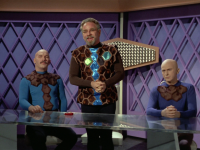
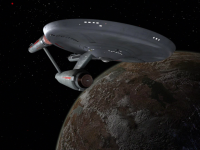
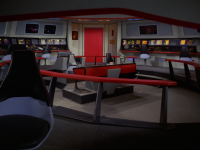
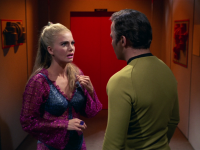
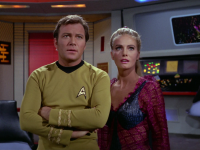
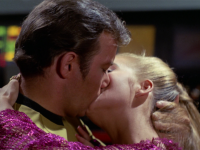
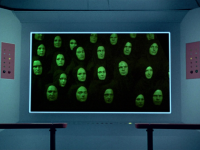
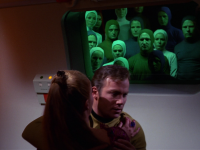
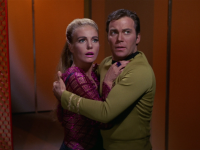
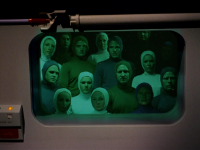
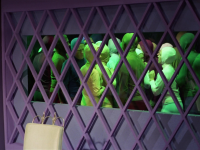
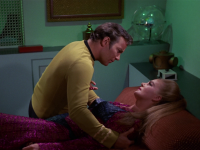
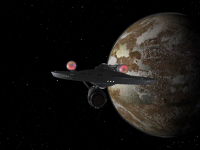
Star Trek TOS - 3x16 - The Mark of Gideon
Originally Aired: 1969-1-17
Synopsis:
Kirk is abducted by aliens who wish to use him to help solve their overpopulation problem. [Blu-ray] [DVD]
Filler Quotient:
3, bad filler, totally skippable.
- Pretty lame episode with no significant long term continuity.
Problems
- Why is sickbay on red alert on the fake Enterprise when Kirk first gets there as he's calling for people in the teaser?
Factoids
- This episode establishes that there are 430 people aboard the Enterprise at this time.
Remarkable Scenes
- Kirk on an empty Enterprise.
- Spock negotiating with the Gideon bureaucrat.
- Scotty being ordered to leave, angry at his technical skills being insulted and mumbling as he left.
- Scotty's reaction to Spock calling from "the bridge of the Enterprise."
My Review
On yet another planet with aliens that look exactly like humans, Kirk is asked to be a delegation of one to negotiate the admittance of an isolationist culture into the Federation whereupon Kirk is abducted and placed into an identical copy of the Enterprise's interior. Inside there is nobody except for a girl who the aliens somehow expect Kirk to instantly fall for so that he'll forget everything else about his life and commit to spending the rest of his days on Gideon with her. As idiotic as it is already for the aliens to expect Kirk to just drop everything and fall for some random girl he just met shortly after facing the possibility that his entire crew has fallen victim to some terrible accident or attack, the reason why they've hatched this scheme is even more stupid: they want to take diseases he's a carrier for so they can commit germ warfare against their own people as a means to solving their overpopulation problem. Seriously, that's the premise the episode expects us to swallow.
Setting aside the already pesky logical problem of how the Gideons even acquired Kirk's medical history to begin with before specifically requesting that the Federation dispatch Kirk and only Kirk to their planet, their whole motivation reeks of painfully faulty logic. Gideon is depicted as being so overpopulated that it's mostly a standing room-only planet. Kirk asks the obvious question of why not simply mandate the use of contraceptives. The Gideon bureaucrat responds mostly with an alien version of Catholicism, by saying that all life is sacred and contraceptives are morally wrong. He goes on to make the even more dubious claim that their culture's love of life is what's made them so disease-resistant and long-lived in the first place. Kirk then points out the blatant hypocrisy of a society that bans contraceptives but condones committing germ warfare against its own people, which is a thinly veiled satire of a society that bans abortion or contraceptives but condones the death penalty.
All that social commentary might have been profound if the Gideons weren't such poor representations of socially conservative religious values. Since nobody is as stupid as the Gideons were during this episode, it's difficult to take any of the social commentary seriously. For instance, why didn't the Gideons just ask the Federation to help them find new planets to relocate to? Or alternatively since killing their own people to cut down on population numbers seems to satisfy their moral code, why not just directly mass execute a large swath of the population rather than hatch this overcomplicated, indirect germ warfare plan?
The Gideons weren't the only ones suffering from faulty reasoning though. The plot itself has some real clunkers too. If space comes at such a premium on that planet, how were they able to build a giant, empty replica of the entire Enterprise interior? Where do they get all their food? How is waste managed? At one point Spock asks a Starfleet admiral for permission to beam down to Gideon to rescue Kirk. The admiral asks Spock if Kirk's life is in danger. Spock doesn't reply as if to concede that Kirk's life probably isn't in danger. Huh? Kirk is being held against his will! Of course his life is in danger! Later on when Spock beamed down to Gideon he was easily able to order the Enterprise to beam the landing party up with his communicator. So why didn't Kirk bring a communicator with him in the first place when he originally beamed down to Gideon?
All things considered it's a terrible episode. That said there are a few nice moments interspersed with the prevailing badness. My favorite moment was Spock's line to the Gideon bureaucrat that "the wars between opposing planetary systems no longer prevail in our galaxy." Ah, Federation propaganda! I also enjoyed how Kirk wandering through the empty Enterprise was intercut with his crew's efforts aboard the real Enterprise to rescue him. And finally the scene when Kirk is tipped off to the fact that the whole thing must be a sham due to the fact that he can hear sound coming from outside the ship which wouldn't happen in a real space ship was a nice touch of scientific accuracy. All in all though you wouldn't be missing much by skipping this episode.
The following are comments submitted by my readers.
- From rpeh on 2010-07-16 at 10:59pm:
This episode is a pretty obvious critique of the Catholic Church's opposition to all "non-natural" birth control methods.
Even if you buy the scenario set out in the episode, you have to wonder what all those people were eating for so long. - From technobabble on 2010-11-30 at 8:12am:
What did they eat why each other! "Soylent green is people!"
I know, I had to say it. Yes, this ep is a logic buster. - From Old Fat Trekkie on 2011-12-06 at 9:33pm:
Isn't a population limited by its food supply?
Where do they get all of their food? - Not to mention a private place to procreate. Or, is that done while standing? - From Orion Pimpdaddy on 2012-03-20 at 7:53pm:
This one had a great premise, but falls apart at the seams after about 15 minutes. Why was the "heartbeat" only audible for a few minutes? Since when are beaming coordinates said aloud? Aren't coordinates usually "sent"? There are way too many plot holes in this one. - From Glenn239 on 2012-11-19 at 2:46pm:
‘2’. This episode is ‘filler’ from one end to the other with so many silly plot details there’s really not much point to discussing them. My favorite part is when Spock beams Kirk down after quickly rhyming off some numbers, not even properly double-checking his input, or establishing that the co-ordinates given are safe. I’m pretty sure he violated every transporter safety regulation in the book. Then, instead of following up straight to the beam co-ordinates in a ‘hot’ rescue operation, he asks permission of Star Fleet, when he must know what the answer will be.
I'm not even certain what the point of the fake ship was in the first place? If they wanted Kirk to transmit a disease, there was no need for any of that nonsense - just beam him down to negotiations and let natural viral transmissions do the rest. A better plot might have been to have him arrested for unleashing a pandemic. - From SNSG on 2016-01-15 at 1:04am:
DI thought this episode was awesome and that's mainly because I love the idea of a planet that wants to introduce sickness to a population. We often do not consider our viral roommates to be a welcome addition to our planet, but what if we're missing something? I also like the idea of a planet where loneliness is a commodity. That requires some imagination and is a great example of the new social constructs that Star Trek can represent. I would also like to address the issues with the episodes above.
The need for romantic contact: Glen239 noted that they simply needed Kirk need only show up to infect the populace. Even though they didn't show it on screen, the disease was obviously a venereal disease. It is only logical that Kirk what is contracted one of these at this point in his career and that they would try to create an (off-screen) sexual connection with him.
The fake Enterprise: yes there was a large amount of space devoted to the facade, but I have no problem believing that a government could secure special access to resources.
The aliens that look human: a misstep in my opinion. Why not just make them colonizers who are suddenly experiencing the inability to die? Hell they could have even been descendants of an earth group that was anti-contraceptive for any reason, and even if they weren't, you could point out that various factors fail to keep humans from reproducing beyond their means all the time.
The coordinates: yes coordinates are usually transmitted, but for the sake of the audience they are spoken so that we could see that they're faked.
I also liked Spock's diplomacy, the empty enterprise and Scotty's noise. My main issue with the episode is that the Gideon's randomly sent up an officer only to have him sent back only after having revealing a difference in trajectory. Also, you really only need 9 numerical to describe your place in space? Put some letters in there at least. And if you're only describing your place in space relative to the Enterprise within transporter range, why could the officer on Gideon do it?
I got a couple problems and head canon doesn't solve everything but I like this ep. - From Rick on 2017-02-17 at 11:09pm:
I do not see how Kirk pointing out that using germ warfare against your people is hypocritical if you think life is sacred, is a satire in any way of contraceptives and the death penalty.
Are you equating germ warfare against your own people to executing people through due process? That is a heck of a leap. And by the way, even under your supposed satire, it would then be equally hypocritical to be in favor of contraceptives/abortion and against the death penalty. - From Chris on 2019-03-23 at 7:22pm:
Utter nonsense, top-to-bottom. Just plain stupidity...!
Other than the idiotic gymnastics of trying to get Kirk to infect Odona, This episode has way too much nonsense!
Where'd they get the specs to make an exact duplicate of a Star Ship which other than actually flying, appears to be fully functional!
Where'd they get the technicians and engineers to build such a thing?!?
Everyone else here has already asked the obvious questions about eating, pooping, and pro-creating...
Surely the Gideons realized 'Paradise Lost' long before they got to this point of their civilization and would have taken some action long ago!
The obvious bungling by the bureaucrats along with Spock is always hyper-irritating to me but I guess a necessary evil to carry a plot home. - From Anon8 on 2020-10-18 at 1:31pm:
I often wondered why it took so long to figure out the transporter coordinates that the Gideons gave for Kirk were different than the ones for Spock. It would seem that would immediately set off that steel trap memory of Spock's.
Ridiculous they could get the intelligence needed to produce such an accurate replica. Neither the Romulans nor the Klingons could pull that off. - From Steve on 2020-10-27 at 6:32am:
What's with your constant bemoaning of aliens looking yet again like humans? You do know when these were made and what the budgets looked like? Seems like we should have expected CGI or some sort of major film production.
The overpopulation theme was drawn from real concerns and conversations regarding the POPULATION BOMB. At least someone in entertainment tried to speak to that concern, and that itself elevates this episode to be one important. - From Turbo on 2021-01-28 at 6:53am:
I thought this episode was really enjoyable. Sure, it has a couple of plotholes to help the events along when you examine it more closely and sure, the presentation of the dilemma was rather hammy and makes you wonder how a civilization in such a state can even operate. However - once you view the sardines in a can style presentation as more metaphorical than literal the underlying premise of the overpopulation moral dilemma is a strong one nonetheless and might've gotten a far better reception with the more grounded or scientifically accurate presentation style of a later show. Furthermore I found it engaging to see what first appeared like a scientific mystery turn into a moral dilemma unexpectedly, it's an episode of different facets. And lastly I found the scenes of Kirk and then Spock exploring the empty "Enterprise" some nice character pieces and the awkward diplomatic dialogue between Spock and the ambassador while McCoy and Scotty were egging from the sidelines to be absolutely hilarious! Though that may just be my specific sense of humor.
And to address a few of Keth's points: The Gideons' dedication to building a replica Enterprise despite their lack of space may just be testament to their desperation. Maybe they were simply too proud or embarrassed to ask the Federation for help, a lot of people and sometimes entire belief systems and cultures are and will go to incredibly convoluted extents to hide their faults. And lastly it's incredibly easy to judge someone's actions from afar by your own moral code, but if the Gideons think that shooting squads are immoral but lethal infections aren't then that's the moral compass they're entitled to. Laying out an entire civilization's moral belief system is a bit too much to ask for in 45 minutes anyway, and sometimes we just have to take things for what they are.

Star Trek TAS - 1x06 - The Survivor
Originally Aired: 1973-10-13
Synopsis:
A long-lost philanthropist, Carter Winston, is discovered on board a damaged one-man vessel and is reunited with his fiancee on board the Enterprise. [Blu-ray] [DVD]
Problems
- How could McCoy not know how many examining tables are in his sickbay?
- In one scene, Nored's starfleet symbol was on the opposite side of her uniform because they used a mirror image of her stock animation.
Factoids
- This episode establishes that McCoy has a (probably grown) daughter.
- This is the first episode to feature M'Ress, another cool and very different alien we get to see thanks to the benefits of a cartoon.
Remarkable Scenes
- Romulan: "You appear to have a propensity for trespassing in the neutral zone, captain Kirk." Kirk: "It was not deliberate, I assure you." Romulan: "It never is." A nice reference to all the times the Enterprise has crossed the zone.
My Review
I couldn't write a better review than the one of pure perfection on Bernd Schneider's site. "A living legend of the Federation (what a surprise) on a damaged shuttle (what a surprise), whose fiancee is on the Enterprise (what a surprise), turns out a shapeshifter (what a surprise), causes trouble by assuming the shapes of crew members (what a surprise) and orders a course through the Neutral Zone (what a surprise). The whole episode is nothing but 'All kinds of TOS cliches in 25 minutes', almost like an unintentional parody, and doesn't show anything original." I might add, another alien race which we'll never see again (what a surprise) and another female crewmember who fails in her duty thanks to love (what a surprise).
No fan commentary yet.

Star Trek TAS - 1x07 - The Infinite Vulcan
Originally Aired: 1973-10-20
Synopsis:
While visiting a new planet Sulu is poisoned and Spock becomes cloned by the Phylosians, a plant-like species. [Blu-ray] [DVD]
Problems
- Giant Spock...
Factoids
- This episode was written by Walter Koenig, who played Pavel Chekov on TOS. It is the first Star Trek production to be written by a Star Trek actor.
Remarkable Scenes
- Kirk: "Beam us up, Scotty!" Another very close line to the famous and much parodied but never actually uttered, "Beam me up, Scotty!"
- Spock reciting the philosophy of the IDIC.
- Kirk: "Any chance of teaching me that body throw?" Sulu: "I don't know. It isn't just physical you know; you have to be inscrutable." Kirk: "Inscrutable? You're the most scrutable man I know!"
My Review
This episode is completely pointless. It tries to make a point about how creating a master race is bad, but the ridiculousness of the plot blasts away any profound messages that it attempted to convey. We're not given any explanation for why Keniclius or Spock were so huge, the plant aliens were interesting but ultimately served no purpose, and Keniclius' goal of creating a peacekeeping army was pointless seeing as how starfleet is essentially just that. In the end, Keniclius gives up way too easily; or should I say not soon enough because his motives were so blurry? Only small details in this episode redeem it, such as Spock's recital of the philosophy of the IDIC and the reference to the Eugenics war of 250 years ago.
No fan commentary yet.

Star Trek TNG - 1x17 - When The Bough Breaks
Originally Aired: 1988-2-15
Synopsis:
Wesley and the other Enterprise children are kidnapped. [DVD]
Problems
None
Factoids
- Little kids are expected to have a "basic understanding of Calculus" in the 24th century.
Remarkable Scenes
- Picard making up regulations on the spot and Data realizing it.
- Picard: "Data, find a way to defeat that shield." Data: "That may be impossible, sir." Picard: "Things are only impossible until they're not!" Data: "Yes sir." Then data gets this wonderfully puzzled look on his face.
- The various Picard-being-tortured-by-contact-with-children scenes.
My Review
Another identical-to-humans race. Somehow the children the Aldeans stole are going to continue their society. Obviously not genetically. So Aldea is to become a paradise for humans then in a few generations? The guest cast parents were overacting badly. Thankfully their screen time was short. And Raschala demands to keep the little girl? So much for their species being humble and non-greedy. Also, usually Wil Wheaton was great at playing Wesley, but he didn't do so well in this episode. Who knows, maybe the directing sucked or the guest cast/children were causing him issues. Wesley is actually pretty good usually. Some of the logic behind how the ozone atmosphere layer connects to the cloaking shield is a bit fuzzy, but acceptable with some liberal interpretation. My problem with this episode is mostly due to the premise. The method by which the premise played out was simply the nail in the coffin. Cliches, bad guest acting, idiotic aliens, and even a regular character did a bad job.
The following are comments submitted by my readers.
- From DSOmo on 2007-06-02 at 8:03pm:
- The Aldeans take only seven children. Will seven children be enough to continue a society?
- How come everybody's got a cloaking device except the Federation? The Klingons, the Romulans, and now the Aldeans.
- The Aldeans shield is capable of protecting and cloaking their planet. This isn't a spaceship. This is a planet. What about the gravitational displacement caused by the planet's mass? Scientists should have been able to calculate the existence of Aldea based on the gravitation disturbances caused by its orbit around its sun. - From The Professor on 2007-09-08 at 6:05pm:
Seven people is certainly enough to maintain a society. Skipper, Gilligan, Professor, Mr. & Mrs. Howell, Ginger, and Mary Ann. The only other things you need are some monkeys, coconuts, bananas and the occasional visitor with a boat or an aircraft. - From Orion Pimpdaddy on 2008-09-20 at 4:45am:
This is one of the better "children" episodes in Trek. Just watch Miri from the original series and you'll see what I mean. Which episode would you want to live out in real life?
As far as the comment about the Federation not having a cloaking device, that is because the Federation refuses to use one. They see cloaking devices as being most useful for sneak attacks, not exactly part of the Federation's mission. They also want to appear with openess open, not hidden and deceptful, to other planets. Of course, there are exceptions. - From thaibites on 2009-09-13 at 2:14am:
I thought this was one of the better episodes. If you have kids, you'll be able to identify with it.
As far as this being "another identical-to-humans race", what do you want? How about a bunch of Star Wars muppets that look silly and detract from the seriousness of this episode? Maybe they could've been like the lizard man in the TOS episode THE ARENA. Then the kids could just run around terrified and screaming. If you can't relate to someone's child being stolen, then you mustn't have much humanity. Maybe a little less computer time and more time interacting face-to-face with real humans would help... - From geld verdienen on 2009-09-20 at 4:31pm:
what annoyed me most about this episode is that I was screaming the whole time GET THEM SOME OTHER KIDS, dont they have foster kids or poor people in the galaxy anymore? Tasha said otherwise. The must be millions you would embrace living it up on that planet. - From Cal on 2017-02-06 at 11:24am:
The peace Treaty with the Romulans (Treaty of Alegeron) forbids the use and development of cloaking devices by the Federation. - From Maggi on 2020-01-16 at 2:19pm:
Strongly disagree with this one, this is one of the best episodes of S1 for me. I thoroughly enjoyed nearly all of it.
Just as another reader already commented, it seems like utter nonsense that they don't even mention the idea of asking foster children if they would want to live there. Picard was way too "absolutely denying" and ultimately caused this to escalate since the Aldeans felt like they had no other options.
Also I get that all the alien species looking like humans is bleh but c'mon its easy to accept under budget restrictions, etc. Feels like you have a base negative attitude towards every episode that has human looking alien.

Star Trek TNG - 2x12 - The Royale
Originally Aired: 1989-3-27
Synopsis:
The crew is trapped in an alien casino. [DVD]
Problems
- LaForge claims the temperature is -291C. That's below absolute zero, which is impossible. Also, if the temperature is below absolute zero, how can you have wind? Much less 312 meters per second of wind?
- Picard is attempting to solve Fermat's last theorem. Whoops! Little did the writers know that the years 1983 through 1986 remarkable progress had already been made trying to solve it. In fact, by the time this episode was written in 1989 it had already been proven that Fermat's last theorem was 1. solvable and 2. would yield an elliptical curve. The theorem was ultimately solved 6 years after this episode was written by Andrew Wiles and Richard Taylor. The writers must have been very pessimistic about the progress of finding the solution, or they were just uninformed that it was progressing at all.
Factoids
- There are 52 stars on the American flags in this episode.
Remarkable Scenes
- Riker: "Yes. We're from the United Federation of Planets." Clerk: "Of course you are. Welcome to the Hotel Royale."
- Riker: "He means this planet. What do you call it?" Clerk: "Earth. What do you call it?" Worf: "We call it Theta 8." Clerk: "Quite charming."
- Data: "What sort of bu'iness do you suppose he's getting down to?" Mimicking the slang.
- Data playing Blackjack.
- Worf refers to the elevator as a turbolift.
- Worf: "Terrible way to die." Regarding dying in one's sleep.
- Data reading the book at lightning speed.
- I love the insults thrown at this book in the episode.
- Worf answering the phone.
- Data cheating in the game.
My Review
Really quite a dreadful episode. Between the technical problems and the juxtaposition of a book with a horrendous story as this episode's main plot, there is little to redeem this episode besides the occasional well placed humorous scenes. Even those however are difficult to appreciate with all the various cliches and lameness spread about. Most of this episode's single point comes from my appreciation of the characters too complaining about the book. It's almost as if the characters also despise the episode. ;)
The following are comments submitted by my readers.
- From DSOmo on 2007-06-24 at 5:36pm:
- Just before beginning his attempt to win the funds needed to buy the Royale, Data explains the rules of craps to Riker. Doesn't it seem odd that Data has to explain the rules of craps to Riker? Riker is one of the best poker players on the Enterprise. If Riker has such a deep interest in poker, wouldn't that translate to at least a passing familiarity with other games of chance?
- I've read that the scene with Data at the craps table is a knock-off from a scene in a movie called "The Questor Tapes." A two-hour TV pilot in 1974 created by Gene Roddenberry. - From CAlexander on 2011-04-04 at 4:24am:
I liked this episode, despite the lack of any real meaning. It was just fun to watch the crew discover what is going on and execute their escape. A relatively simple, light-hearted episode.
In response to DSOmo:
- It is quite likely that Riker would be ignorant of craps despite knowing Poker. They are very different games. Poker is a game of skill and psychology with an element of chance. Craps is purely a game of chance, a simple-minded gambling game quite likely to have vanished utterly by the 24th century. And the average poker player today knows nothing about many of the games played in the 17th century.
- From Jeff Browning on 2011-10-20 at 4:30pm:
Wind speed of 312 meters per second would translate to:
312 x 3,600 / 1,000 = ~1,000 KPH
That's pretty %#%^ fast! Maybe too fast. Certainly too fast to survive without some elaborate protective gear. Possibly even faster than escape velocity for a planet this small. - From Abigail Chappell on 2012-08-12 at 9:25pm:
Fermat's Last Theorem: My friend Lucas (who went to ESU but transferred there after you left) was watching this episode and caught the problem with Fermat's Last Theorem. He emailed me about it, and I just showed him this website so we could post it under "problems" and look smart. Darn, you're ahead of us! - From Arianwen on 2012-12-15 at 3:43am:
If this episode had a theme, it would be "apathy". The entire crew appear to be suffering from depression, such is their disinterest in events. The away team shows no curiosity, the Enterprise crew no urgency. When your premise is shallow, your plot revolves around a cliché and your atmosphere is nonexistent - this is the result. It's a shame, because it could have been so much more. Picard's agony as he reads The Royale is relatable and very real: clearly they just taped the script to the set without warning Patrick Stewart. One point for emotional honesty and Data hamming it up with the dice.
Re. Fermat's Last Theorem, Wiles worked on the proof in complete secrecy for seven years and when the the time came to proofread the proof (ha) he only told one person. The final publication hit the mathematical world like a falling piano, so at least the writing team cannot be faulted for their research. My headcanon is that Picard was referring to Fermat's claimed "wondrous proof" rather than Wiles' monster of a solution. People still hope to find that mythical elegant proof, though I believe most mathematicians now agree that Fermat had likely made a mistake somewhere. It's likely people will still be keen on finding it three centuries from now.
(Sorry for the infodump, but Fermat's Last Theorem is fascinating.) - From Harrison on 2013-07-14 at 9:50pm:
Undoubtedly one of the most poorly executed Trek episodes ever, replete with narrative sloppiness, stilted acting, bad science and irritating plot flaws. It is certainly Patrick Stewart's most lightweight performance ever.
Too bad, because the original script may have had some potential. All that time wasted on unconvincing dialogue could have been used to give the "future Picard" character a little substance. The time paradox, while hardly novel, could have been woven into something rich enough to at least pique the imagination.
At the very least, this episode more than any other probably put the final nails in the coffin for the irksome "Dr. Katherine Pulaski" character. Silver lining, I think, because she exemplifies the worst Season 2 had to offer. - From Harrison on 2013-07-31 at 5:21pm:
OK, it's a weak (and super low-budget) episode with a lot of flawed science & unsubstantiated plot assumptions.
Nonetheless, it's not entirely a waste of time. Lots of very amusing interplay between Data and the (holographic?) denizens of the Hotel Royal. The Texan and the airhead bimbo are both highly watchable.
It's a lightweight, forgettable vignette. Don't expect a whole lot. But for a filler episode made on a shoe-string, it's not bad. Quality, relaxed performances from just about everyone. - From Mike Chambers on 2013-10-21 at 12:08am:
Very underrated episode. A 1? Come on, it's not THAT bad. It may not be the most engaging story or have any real relevance, but it was a fun little episode. The long-dead NASA astronaut found in the hotel room and his note was interesting to me. That was a very unique plot point. Try to imagine being in his shoes! - From Mike Chambers on 2013-11-12 at 8:31pm:
Just to expand on my last comment...
I also enjoyed watching Worf deal with the situation, a lot of laughs from him in this one. I especially loved Data interacting with the characters in the casino. Funny stuff, and overall an episode that I enjoy watching every now and then. Not every episode has to be dark, serious, and relevant. It was a nice change of pace. - From Ryan on 2015-08-06 at 2:54am:
Data says that the odds favor "standing pat" on 13 when dealer is showing 10, but in any variation of blackjack I know of the odds would actually favor hitting. - From Quando on 2017-02-07 at 1:54am:
Call me crazy, but I kind of like this episode. It is goofy and kind of silly, but I like how baffled the away team is about the whole thing (like not knowing how elevators work). I think the best line in the episode goes to Worf. When they find the old astronaut in bed and mention that he appears to have died in his sleep, Worf says, "what a horrible way to die." - From lordcheeto on 2017-07-23 at 4:59am:
Perhaps the near extinction of humanity following WWIII in the 21st century resulted in the loss of the solution to Fermat's Last Theorem. - From Jamie on 2018-09-19 at 11:21pm:
Kethinov's review of all Twilight Zone episodes: 1. Cliches and lameness abound. - From Azalea Jane on 2021-07-19 at 10:25pm:
So bad, it's good! The cheesy soundtrack, the halfhearted writing... This episode is special. A bit like "Move Along Home" in DS9. Sort of enjoyable if you treat it like a joke.
"None of these people are emitting life signs."
"You mean they're not alive?"
Problem: Troi can sense Riker's emotions from that far away? Wouldn't that sense be subject to the inverse square law, or something? I heard it pointed out that one of the big problems with Troi's character, and one reason she's constantly underutilized, is that nobody could seem to pin down exactly how her empathetic abilities worked. Case in point: what is the range? Does it work by proximity, or by sight?
Data emotionspotting: he looks quite satisfied after winning that hand of 21, then very obviously lights up when he gets into character playing craps! - From Pipanni on 2021-09-07 at 2:35pm:
I too liked this episode. It's very creepy and sad what happened to the lost astronaut. If you just skip ahead all the book-story parts (which suck bigtime) it turns into a rather enjoyable episode.

Star Trek TNG - 2x22 - Shades of Gray
Originally Aired: 1989-7-17
Synopsis:
An alien organism invades Riker's brain. [DVD]
Problems
- Riker "remembered" some things he wasn't actually there to see.
Factoids
- This was an extremely low budget episode.
Remarkable Scenes
- The joking scene at the end when Riker is cured is neat.
- Some of the scenes in Riker's dream are fun to watch again.
My Review
The problem this episode suffers from is severe lack of plot. This was due to budget problems. They didn't have enough money to do the big action packed season finale they planned for. So instead they made a clip show. What confuses me the most about this situation is why they bothered to make this episode at all. The previous episode (TNG: Peak Performance) would have made for a far better season finale.
The following are comments submitted by my readers.
- From DSOmo on 2007-07-04 at 10:05pm:
- Pulaski recognizes that the microbes respond to brain endorphins. She then proceeds to jolt Riker with a machine so his brain can produce them. Yet, she worries that the stress may kill him. In "The Battle," Dr. Crusher claims that twenty-fourth century medical science has "mapped the brain." If they have, doesn't it seem reasonable that they would understand the endorphins the brain produces under different circumstances? Shouldn't they be able to manufacture these brain endorphins in a replicator and inject them in Riker? Then again, if Pulaski could make the endorphins, we would miss all there wonderful flashbacks! (Sorry, fighting to control my hatred for flashback shows)
- As Pulaski uses a machine to stimulate Riker's brain, she looks in a pair of eyepieces and presses buttons. She seems to hit the right buttons without even looking. Considering that all the control surfaces on the Enterprise are flat, that's quite a feat! - From JRPoole on 2008-02-21 at 2:58pm:
This is not a comment on this episode--what is there to say about this one, really?--but on the second season as a whole.
The second season is superior to the first, mostly because the characters started coming into their own, the seeds of coming plot arcs are sown, and the writers stopped rehashing TOS plots (with the exception of "Unnatural Selection"). On my slow process of re-watching the series for the first time in years, I was surprised to see that some of the episodes I remembered most fondly--"Contagion," "Up the Long Ladder," "The Emissary," "A Matter of Honor," "Q Who"--are all this early in the series. I distinctly remember it getting better as it went along, so I'm looking forward to the upcoming seasons.
I'm watching the series via Netflix, and the last disc I received contained the final two season 2 episodes and a smattering of special features. One of the special features was called "Memorable Missions" and consisted of the actors, producers, writers, and other behind-the-scenes types discussing their favorite episodes. I was surprised to see that the people behind the show seem to love "The Dauphin," which I consider to be among the worst episodes in existence.
Anyway, on to season 3.... - From JR on 2008-10-28 at 3:02am:
DSOmo commented:
"If they have, doesn't it seem reasonable that they would understand the endorphins the brain produces under different circumstances? Shouldn't they be able to manufacture these brain endorphins in a replicator and inject them in Riker?"
Neurotransmitters released in the bloodstream can't reach the brain because of the blood-brain barrier. So this wouldn't have the same effect as stimulating the natural production of endorphin. - From Wayne on 2009-07-16 at 5:36pm:
No one seems to remember that this episode and "peak performance" were made at the beginning of a writers strike. that why the seconds season only has 22 episode instead of the usual 26. This was a clip show that was made as filler to finish the season. - From curt on 2010-04-15 at 6:19pm:
Its a clip show show, so I don't hate it! it is what it is. Im not really a fan of it, Id not even give it a rating. - From thaibites on 2010-09-19 at 12:21am:
This episode is a microcosm of the 2nd season - crap. It's all probably due to the writer's strike, but it's still crap and you can't polish a turd. The only memorable episode was "Q Who". The rest were OK to forgettable. I like action, tension, and big stories. Season 2 was a collection of little stories that allowed us to get to know the characters better, which is nice, but there needed to be more "on the line" - more stories where you felt they were pushing the limits of space and may not survive. Also, Pulaski was a complete disaster. Thank God she didn't survive season 2.
Bring on season 3 - give me Klingons, Romulans, Borg, ANYTHING - just give me some action and suspense! - From CAlexander on 2011-04-18 at 4:42pm:
This episode is a fraud perpetrated upon the innocent viewing public. It should come with a label – "Warning – we didn't have the money or the script to make a genuine Star Trek episode. Proceed at your own risk."
I watched it not knowing what it was. The first 15 minutes seemed promising. Then the clip show starts. So pointless! So random! But if that isn't bad enough, when they return to the main plot, it starts to get melodramatic. And the acting gets more and more painfully awful, the clips more and more random, until I was begging for the episode to end.
- The one good point is the final scene. It made me laugh.
- From Dstyle on 2015-11-09 at 2:19pm:
Pulaski (melodramatically): "We need to access intense, negative emotions to drive this infection away!"
Troi (even more melodramtically): "Well, how about the time his mother died when he was a child? That was a major trauma! Or how about when his father abandoned him when he was fifteen? Or the time he had to fight his way off The Pegasus when the crew mutinied against the captain, even though his actions went against his principles? I mean, his early years are a goldmine of negative emotions!"
Pulaski (desperately melodramatic, somehow topping Troi's melodrama): "No! For some reason I can only access negative memories from the last two years!"
Clip shows, eh? What can you do? I feel bad for cast members like Brent Spiner and Michael Dorn who had to sit in the makeup chair for hours so they could be a part of this. (Wait, was Worf in this episode? Maybe in the beginning? No, I don't remember him in it at all, probably for exactly this reason.) - From Mark Boris on 2016-08-27 at 4:02am:
Finally got around to watching this one. Only one I hadn't seen, can you believe it? I saved the worst for last it seems.
Away teams ought to beam down in biohazard suits. Just sayin'.

Problems
- The premise, see my comments. Not necessarily unbelievable, but a bit absurd.
Factoids
None
Remarkable Scenes
- Guinan on the holodeck, trying to play along.
- Data using "less obtrusive" methods of contacting Picard.
- Data carefully persuading everyone to leave the star system.
- Beverly suspecting Data a liar.
- Picard getting rid of Data in the briefing room so they can speculate about him.
- Beverly digging up more evidence against Data using the transporter.
- Data's "I cannot confirm nor deny that" attitude.
- Worf: "There are very few people on board who could have broken my wrist. Commander Data is one of those individuals."
- Troi being possessed and speaking in an eerily flanged bass augmented register.
- Possessed Troi breaking Worf's wrist.
My Review
This episode's premise doesn't make a whole lot of sense. Wouldn't it have been easier to just claim the wormhole knocked everyone unconscious for a day instead of trying to rig the ship to make it appear as only 30 seconds had passed? That way all the "clues" that were left behind would seem to be nothing but a normal consequence of a wormhole knocking you into bio chemical stasis for a day. Of course, then we wouldn't have an episode now would we...
The following are comments submitted by my readers.
- From DSOmo on 2007-08-24 at 6:44am:
- The computer apparently doesn't know that dead people don't move their eyes. When Picard and Guinan are in the holodeck at the very start of the episode, a holodeck character gets machine-gunned down. When Picard turns the man's head to face them, his eyes move around.
- At the end of the episode, Data narrates a flashback to the first encounter with the Paxans. During his narration, the episode shows Data waking everyone while the Paxans attempt to override the shields. The Paxans penetrate the shields and take control of Troi. After she breaks Worf'd wrist, Picard asks, "Who are you?" The Paxans, speaking through Troi, do not answer. They simply maintain that they must destroy the ship. The dialogue continues until Picard and the Paxans reach a compromise. Then Picard turns to Data and orders him never to reveal what has happened, to conceal his knowledge of the Paxans for as long as he exists. How did Picard know they were called the Paxans? The Paxans never mentioned their name. - From JRPoole on 2008-05-08 at 2:46pm:
I agree with the general absurdity of the premise of this episode. How was Data supposed to cover up a whole day? If it was, say, Tuesday, and they woke up on Wednesday, how is that concealable? Even if the crew goes on thinking that only 30 have passed, won't there still be an unaccountable lag when they get back to a star base and it isn't the day they thought it was?
Also, the direction and staging is poor in this episode. For instance, Geordi comes to the bridge, asks Troi to give him a moment with the captain in private, and they proceed to stroll around the bridge chatting about Data's deception. It seems like something they should discuss in the ready room.
Still, there are some things to like about this episode, mainly Data's refusal to reveal the truth to the crew, so this one is a 2. - From JRPoole on 2008-05-08 at 11:35pm:
I'm bewildered by the fan rating on this one. This one is more significantly higher than the host's rating than virtually any other episode. Is this one usually considered a fan favorite, or is this an anomaly? - From Bernard on 2008-05-14 at 11:23pm:
Just to add to the above in the general berating of this episode...
Take Picards preposterous reaction to Data's evident deceipt. He threatens poor Data with the suggestion that starfleet will dissect him to find out what has gone wrong with him! Considering the events of the episode 'measure of a man' this is not a possible course of action... Data could be court martialled etc. but not taken apart (without his consent anyway)
Some really fundamental flaws with this episode that I agree with low marks as there is nothing else redeeming to save it - From Orion Pimpdaddy on 2008-10-20 at 4:31pm:
I always look forward to watching this episode again. Seeing Data lie and lose credibility among the crew is facinating to watch. Also, the revelation that the crew has lost a whole day's worth of memory always amazes me, even though I have seen it many times.
I love the ending where Picard ALMOST turns the ship back to the planet again. If they had come back a third time, then aliens would have destroyed the Enterprise. - From trekstar on 2011-01-03 at 3:02pm:
I've always liked this episode. I was always under the impression that the aliens didn't just wipe out their memory for a day, but also placed them back in time. Which means although they had "clues" of life going on a whole day, in the time frame outside the ship, only 30 seconds had passed. That makes more sense...I think:) - From level@level.net on 2011-08-22 at 6:39am:
I think the negative reviews are a little unfair. The holodeck sequence sucks, and the premise is kind of outlandish, but I think it falls short of being absurd. In fact, it's got some redeeming qualities. The sheer uncertainty in the first 3/4 of the episode is quite exquisite. Data is protecting the crew by concealing the events of the past 24 hours... Wtf? This was downright creepy at times. I was trying to picture what kind of horrible, traumatizing, life-altering things might've transpired...
The real problem with this episode is not the premise, it's that the revelation is rushed to the point of ridiculousness. It runs like a Charlie Chaplin film, just a few steps too fast. (I like the episode but I'll be the first to admit it has some serious flaws) Here's a small one: what is up with Wharf getting all trigger happy on counselor Troi? All she did was get up kind of sudden, and he's ready to shoot/physically apprehend her? And then Picard says, "Who are you?" (Maybe it's Starfleet protocol to assume that anyone who gets up and quietly approaches you has been possessed by another lifeform?)
Not very believable.
Speaking of which, it just seems unrealistic how quickly everyone arrives at the "stalemate" position/solution. Captain Picard seems to lose all nerve whatsoever - it is expected that he would be diplomatic and conciliatory, especially when facing superior technology, but here he comes off as just downright spineless or something. It's not unreasonable that he would come to this kind of decision and suggest they all just "forget" the whole thing, literally, but I would imagine it would take some kind of process, dialogue, consultation, etc. Not quite, "Wait! Don't kill us! Just make us forget and we'll be on our way."
Since that part of the story is revealed as a flashback, narrated by Data, we are perhaps meant to infer that there were other events that took place off screen... but this hardly changes the viewer's experience. The real problem, as I mentioned, is that the producers simply didn't have the space to do what they needed and make it seem believable. They just couldn't cram it in the 45 minutes, it seems, or made the wrong decisions about how to manage that space.
So, interesting episode - not an outright disaster or absolutely absurd, just with a rushed, abbreviated, unconvincing conclusion, like a few other episodes. I'd give it maybe a 5/6. - From level@level.net on 2011-08-22 at 7:13am:
(For a special treat, watch this episode right before or right after watching "TOS: The Menagerie." There are some great parallels between Spock's deception and Data's obfuscation, and their respective captains' reactions. One interesting observation - it seems a starfleet crew is much more likely to trust an oddly behaving Vulcan (even a half-Vulcan) than an android under suspicious circumstances.
There's probably some kind an innate distrust of technology at work, which isn't entirely misplaced. "TNG: Brothers" comes to mind, specifically the scene when Data became completely subservient to his creator's homing beacon. And of course Data's brother became more or less insane, so there is some precedent for that as well...
- From Rick on 2013-02-11 at 3:46am:
Reviewer:
How is Data supposed to convince Picard that it took him a full day to revive them but in actuality it only took Data a few seconds? Wouldnt that be a big "Clue" that Picard may investigate further......
Of course you could come up with a response to this but the point is that Picard may not believe whatever excuse Data would give. - From Daniel on 2014-05-24 at 7:03am:
I like this episode, though I agree it is a flawed premise. I just want to point out one other odd detail I noticed. The oddity occurs at the moment when the Enterprise is once again facing the Paxans (the second time), and the green energy stream takes over Troi, causing her to become a zombie and act as a Paxan. According to the timeline of the story, Troi is possessed by the Paxans (the second time) immediately before confronting Data. Yet, at the moment of her possession, Troi is in bed in a nightgown. But, a moment later, she confronts Data in full uniform. Now, why would the Paxan that possesses her need her to get dressed, or would they have any need to dress her while possessing her? Just wondering. - From Axel on 2015-02-21 at 5:18am:
Maybe I'm missing something here. Those of you suggesting that Data could've claimed the crew was out for a full day, thus avoiding the problems of a 30-second deception: how do you then explain the male crew's lack of beard growth? That was a major factor in the crew second-guessing whether they really were out a full day, until they learned they'd been placed in stasis. The lack of outward physical change, like beard growth, could only be passed off if the crew believed they were out for a very short time.
Perhaps the Paxans are highly skilled as both barbers and mind erasers? - From Rick on 2015-10-15 at 5:59pm:
To the people questioning the premise of the episode, and more specifically the time difference problem (i.e. how would they explain the difference in their chronometer with the next star base they encounter), you are forgetting that they think they passed through a wormhole. I believe it is reasonable to surmise that time passes differently inside a wormhole. Hence Data saying after they wake up that he will reset the chronometer with the nearest star base signal.
This episode is difficult to understand but I think they did a pretty darn good job of covering all the bases. - From tigertooth on 2017-05-30 at 3:50am:
I liked the episode overall. But to add to the problems:
*It seems hard for me to imagine that Picard would blithely be okay with an alien race erasing memories of his entire crew.
*I get why they put the Dixon Hill holodeck sequence in there to underscore the theme, but if you're going to introduce Guinan at the beginning of an episode that involves weird time anomalies, it's disappointing that she never reappears.
*While I can see how the chronometers on the ship might be screwed up by the wormhole, how would you explain the lack of any official, personal, or data logs during the missing days?
So while I wish they had found ways to plug some of these holes, I still found the positives of the plot arc and characterizations to be enjoyable enough to give it a 7.
Data's struggle to fill in the gaps was great, and resonates nicely with his efforts to become a better actor. I kind of wish there had been a Data/Picard scene where he asked about the flaws in his performance, but it wouldn't have really made sense given that it would have had to have taken place after the second Paxan reveal -- it would have gummed up the momentum right near the end of the episode.
But a great Data/Picard scene -- presumably while Picard was still in the dark -- would have really pushed this to the next level. Maybe Picard knows they could pull the information from Data's memory files, but feels that's too invasive to be a morally acceptable choice? Anyway, they didn't figure out how to make that happen, and that's a missed opportunity.

The following are comments submitted by my readers.
The gravity in the scene in Melora's quarters were inconsistent, too, switching between low gravity and no gravity at least once.
I have to disagree with your review, dear Kethinov. I loved this episode! It definitely had its flaws, which I'll go into later, but first I'll say why I liked it.
This was obviously an episode that wanted to deal with "disability" issues. Melora is predictably rough around the edges and fiercely independent, and very walled off. Bashir's ability to worm his way in through her defenses was beautifully written and acted, and we see behind Melora's rather off-putting exterior is a vulnerable person who's rather insecure about her qualifications. It's actually great character development for Bashir.
I also liked that they pulled off a low-gravity scene. It's the first I've really seen since Star Trek VI (I may be wrong), and you'd think you'd see more of them, seeing as how most of the gravity we see in Star Trek is artificial. Of course, this is a budget issue. If, every time an away team boarded some disabled ship or derelict, they had to be weightless, as would be most realistic, the budget would go through the roof. Oh well.
Anyway, it's nice to see Bashir turn his attention away from Dax for a little bit! It was also nice and realistic to see a hostile alien follow through on his threat to kill a hostage (even though she didn't die). I also liked how she saved the day, and how an analogy to an ancient earth story got her to reconsider undergoing those treatments.
Now to the faults: As Kethinov pointed out, Melora's appearance is rather unrealistic. A planet with such low gravity would have to be extremely small (smaller than our moon), and would probably hold next to no atmosphere, which would probably make any species living on such a planet A) very tall, and B) able to live on very little air. Melora would probably find the atmospheric pressure on DS9 unbearably high. Maybe her species migrated from some other planet and hadn't evolved past its original humanoid appearance; who knows.
They could have done it some other way; they could have made her born with some genetic muscular defect that required her to live and grow up in a low-gravity environment, but Star Trek, despite its many strengths, has always required a bit of suspension of disbelief. Some more than others.
The other flaw is one not intrinsic to the episode, but another unfortunate theme in Star Trek: we never hear from Melora again. The theme of exploring a romantic interest in an episode only to have it forgotten in the next isn't new (see TNG: Lessons, The Game, etc.), and it's rather irritating! Oh well. I still liked this episode a lot.
Solid episode. Great to see Bashir getting some nice character development, also great to see another strong female character in DS9. DS9 was particularly good at independent women but Melora is fantastically prickly, driven and stubborn. Quite similar to Ensign Ro in her first appearance actually, but I have to agree with djb that it is such a shame that we never see her again.
On the down side slightly obvious plot developments lets the rating of this episode slide. I'd give it a 5 or 6.
Again, suspension of disbelief is an absolute requirement when watching Star Trek. I always feel that, as long as they don't break too many of their own rules, then I'm happy with it. If you get too upset by the science of Star Trek then you'll have to switch off every time they use the transporter surely?
While I don't always agree with our host on episode ratings, I completely concur with the 2/10 rating on this one, as well as the reason for such a rating.
The character of Melora is quite irritating, and Bashir, with his constant professions of awe about her gets old pretty quick too.
The high point of the entire episode for me is the Klingon chef -- I wish they had featured him, if not prominently, then more regularly in the later seasons. As it is I don't think they even gave him a name.